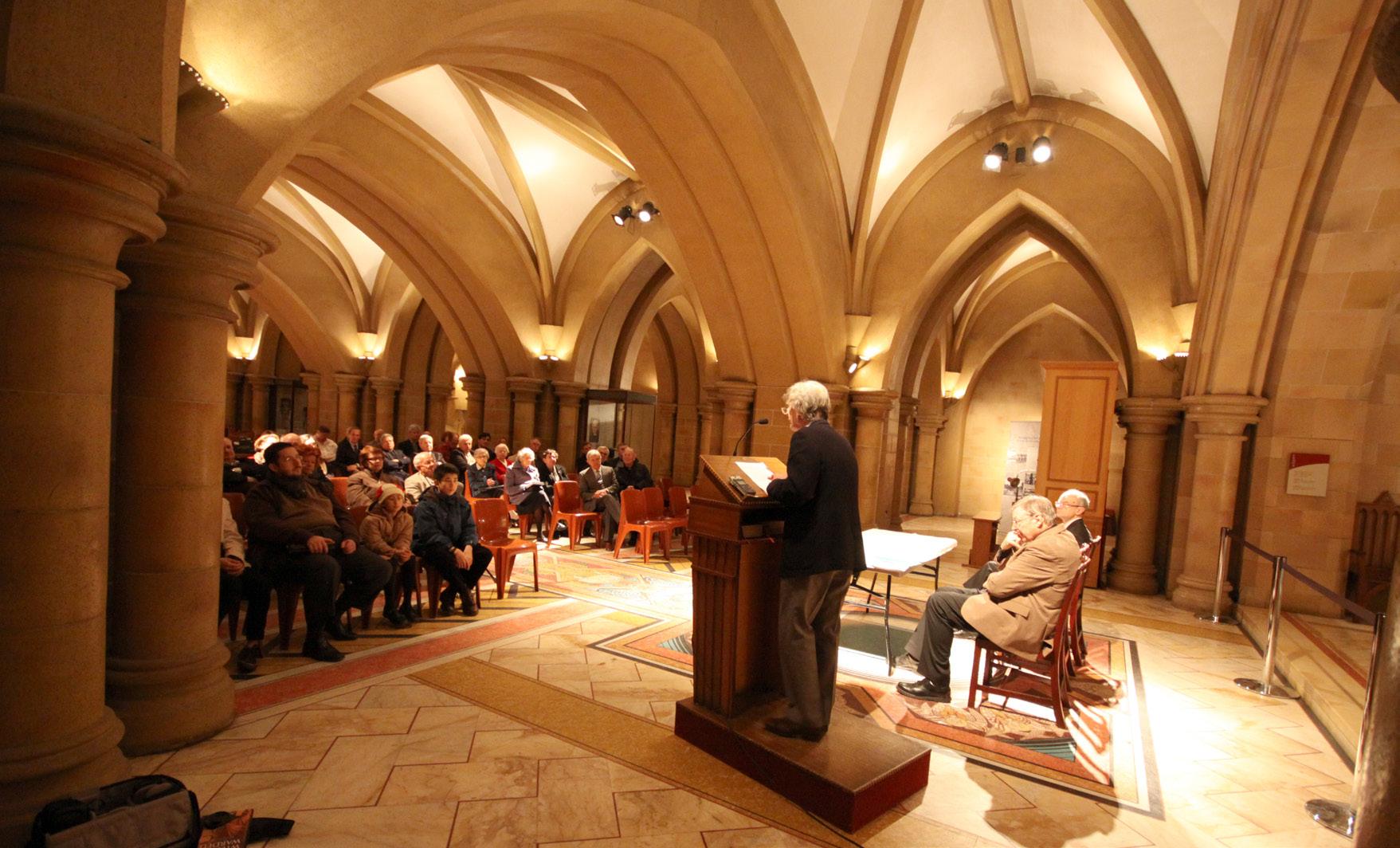the R ecoRd

Wednesday, h the P arish . the N atio N . the W orld . g therecord com au
29 September 2010



Wednesday, h the P arish . the N atio N . the W orld . g therecord com au
29 September 2010

What’s going on when the Pope’s best defenders are Socialists? Something interesting.
Leading hospital director welcomes defeat of WA Green’s euthanasia bill, but says key to the future is providing sufficient palliative care services, including the training of doctors, nurses and support workers
By Anthony BArichAUSTRALIA’S largest Catholic not for profit private healthcare group has urged the State Government to turn its attention to additional funding for palliative care after the Voluntary Euthanasia Bill’s defeat on 22 September proved it is “not the answer”.
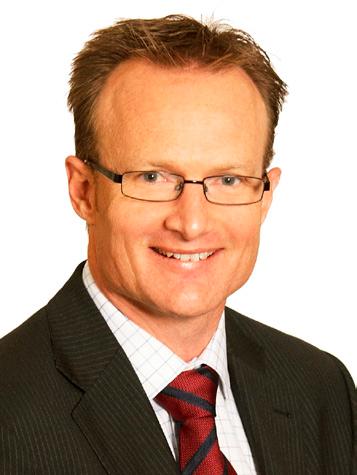
St John of God Health Care Medical Services director Dr Lachlan Henderson said the bill’s “resounding” defeat 24 votes to 11 confirms that “it is unnecessary, given modern pain control and palliative care techniques such as those we offer at our highly regarded Murdoch Community Hospice and our other excellent palliative care services in our hospitals in WA and Victoria.
“We now urge the Government to turn its attention to allocating additional funds to palliative care in order to increase inpatient and community services, as well as train and employ the necessary additional doctors, nurses, and support workers,” he said.
Dr Henderson said that the Voluntary Euthanasia Bill would have placed an added and unwanted onus on doctors and radically changed the current “healing” relationship between doctor and patient.
Irrespective of euthanasia being contrary to SJOGHC’s Catholic mission and values, the legislation was also “simply bad medicine”, he said.
“It would have undermined patient trust in their doctors – as in the Netherlands and Belgium where voluntary euthanasia is legal – and it has been shown to have damaging effects on doctors who provide it,” he said.
Dr Henderson said legalising euthanasia would permanently and radically change the ethos of health care provision in Western Australia and would do nothing to protect a vulnerable group in society. Please turn to Page 5
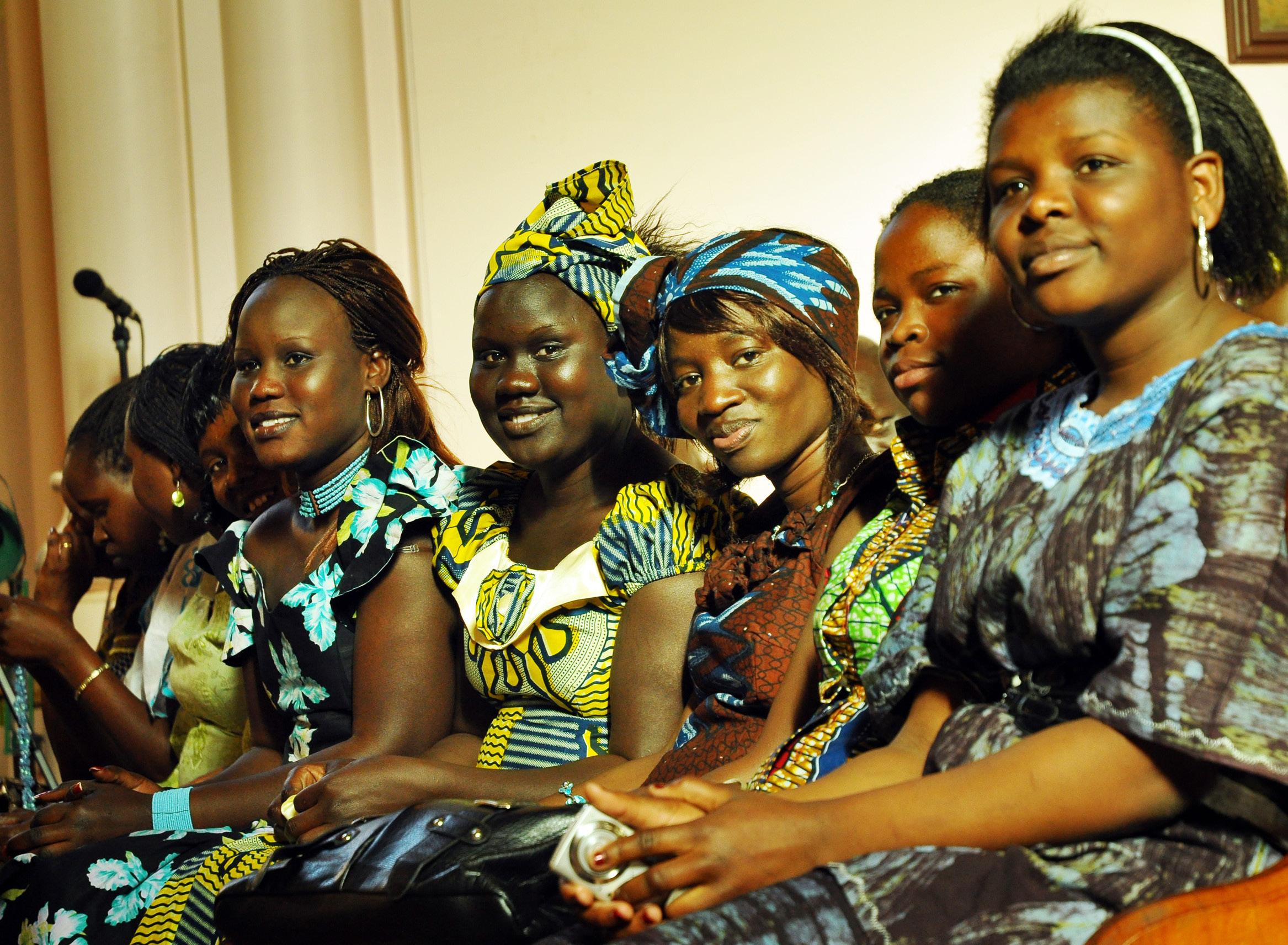
WHEN global technology giant Apple says “there’s an app for that,” they could be referring to the work of Perth doctor Rhys Clark.
The University of Notre Dame Australia medical graduate has developed iDoctor, an iPhone application to assist training medicos to keep track of their professional development and patient caseloads.
The iTunes application allows users to log hospital cases and export them to Excel and other spreadsheet programs.
Dr Clark, who works at Sir Charles Gairdner Hospital, said once doctors had
reached a required number of supervised procedures, it was simple to email and print the spreadsheet for authorisation.
He said he saw a need for junior doctors to keep accurate records of their experiences “on-the-go” and iDoctor provided a toolbox of assorted log entries to enable them to keep their CVs up-to-date with educational and professional development activities.
“As training positions become increasingly competitive and we move towards experiPlease turn to Page 10
iDoctor:
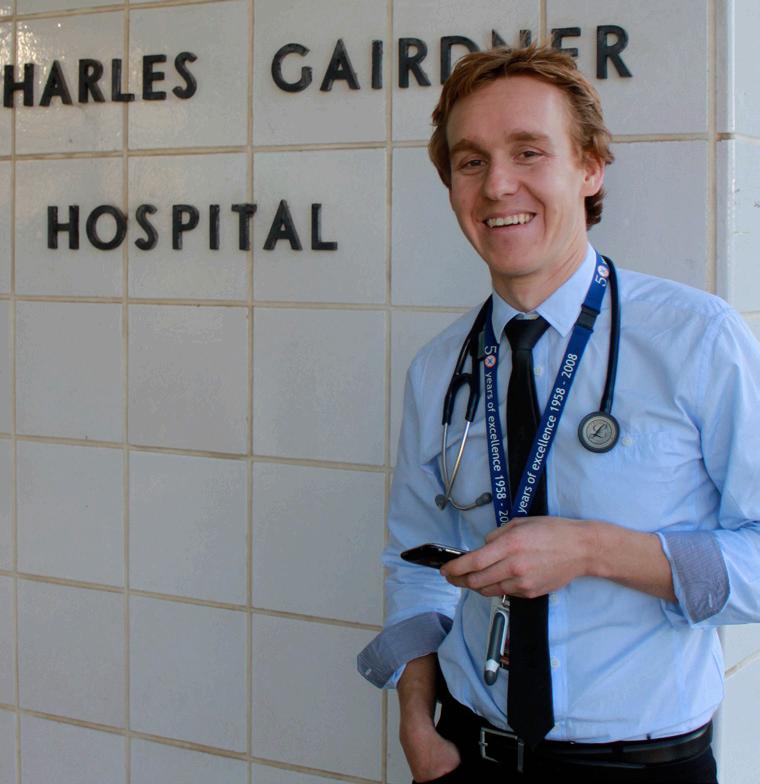
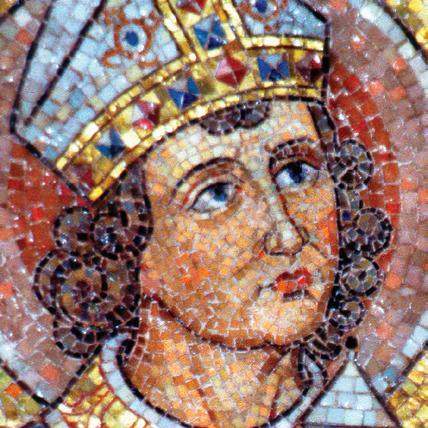
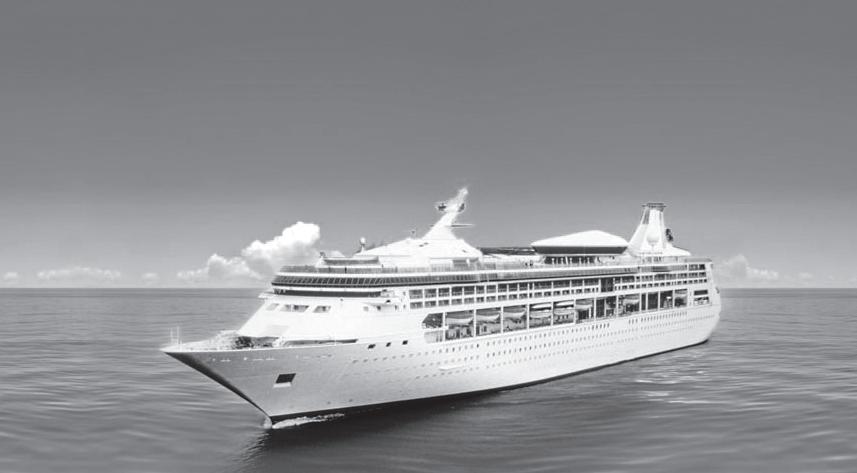
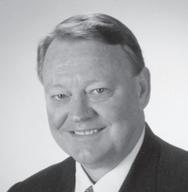


The history of Bencubbin parish, which on 18 September celebrated its 75th Anniversary, is an intricate tapestry that weaves in Benedictines, Franciscans, a Justice of the Peace, Christian Brothers and The Rosary ManBy Kevin and veronica Hogan
In 1910, the first lands were opened for farming in the Mt Marshall area. Ted Pergande was one of the earliest settlers, playing a leading role in the developing community in those early years.
On his farm were a nine-hole golf course, tennis court and a large ‘Wyacubbing’ catchment dam used as the local swimming pool, shared with the sheep. A great host, Ted was also a Justice of the Peace and conducted local burial services.
From 1916, Mass was celebrated in the Pergande house before Bencubbin was gazetted in 1917.
Retiring in 1948, Ted and his wife were invited by Christian Brother Keaney to live at Bindoon Boys Town, his wife to teach English and Ted teaching farm husbandry to the orphan immigrants.
Known as ‘The Rosary Man’, he was never without his beads. His grave is one of six on the Bindoon property.
Due to the shortage of priests in 1900, the Benedictine Monks of New Norcia were asked to supply priests to areas stretching from Moora to Southern Cross. For 50 years, from 1915, our parish priests were a succession of Spanish Benedictines.
Abbot Catalan opened the new cement brick church in Bencubbin in 1935, confirming 44 children drawn from an 80km
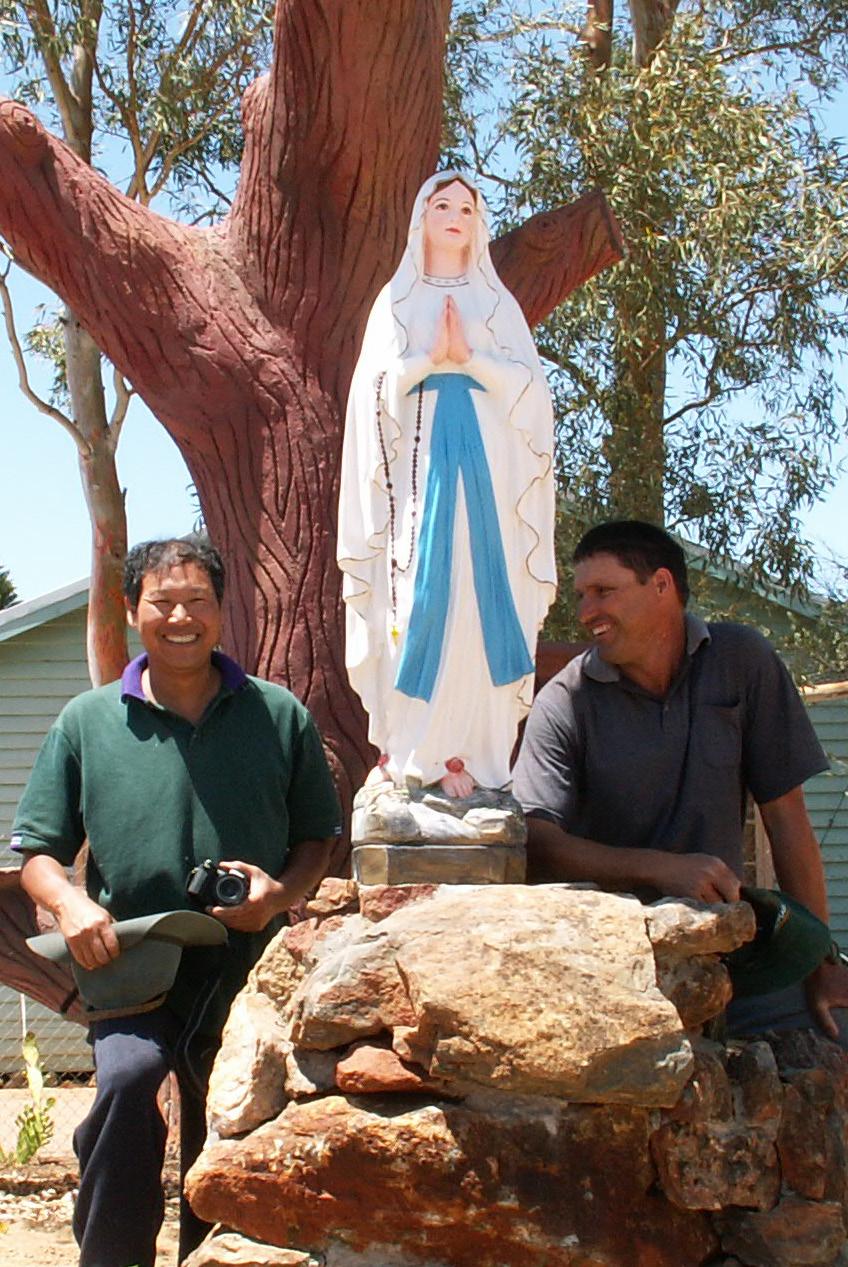
radius. Built on a block next to the church, the presbytery was opened in 1961 by Abbot Gregory Gomez.
As part of the Mt Marshall Centenary, past parishioners and priests were invited to celebrate the 75th Anniversary of Bencubbin’s Sacred Heart Church on 18 September. The church was actually opened on 15 December, 1935, but the celebration was brought forward to coincide with the Bencubbin’s centennial celebration. Archbishop Barry Hickey concelebrated the Mass with Highgate parish priest Fr Peter Bianchini, Fr Greg Donovan, Fr Benedict Quadros, Fr Francis Huy Nguyen, local parish priest Fr Chien Quyet Nguyen and Fr Michael Brown OFM, the only priest born in Bencubbin (1922).
Also returning were Sisters of St Joseph ‘Motor Mission’ sisters Carla Curran and Gemma Scott. Kevin Hogan was the only person present who had been at the 1935 opening of the church.
Part of the Trayning Parish from 1925, we rejoined the Perth diocese in 1971,
becoming a separate ‘Lord of the Harvest’ parish. Today, our Mass centres are Beacon, Bencubbin, Koorda, Mukinbudin and Trayning.
In his homily, the Archbishop acknowledged our parish thrives because of the continuing support of the local people and the dedication of our priests.
Archbishop Hickey is aware that the present drought will cause great problems, but reminded us that the Sacred Scriptures guide us to give thanks and praise to God in all times.
He presented a Papal Blessing for the church to chairman Mark Fitzpatrick and diligent secretary Donna Cooper. Tony and Margo Sachse also received a Papal Blessing for their silver wedding anniversary. In the grounds surrounding the church, Fr Chien, a talented artist and sculptor, has created a Marion grotto and is building stone cairns for Stations of the Cross around the gardens planted with dozens of flowering native shrubs.
A community lunch at the Bencubbin Sporting Complex followed Mass, where over 250 people gathered to renew acquaintances while celebrating the Mt Marshall Centenary.
8 December 2007.
Below: priests who celebrated the 75th Anniversary Mass of the Sacred Heart Church, Bencubbin walking from the presbytery to the church for the service. Pictured from left to right – Fr Francis Huy Nguyen, Fr Greg Donovan, Archbishop Barry Hickey, Fr Peter Bianchini, Fr Chien Quyet Nguyen, Fr Benedict Quadros, John Fitzpatrick Jnr (Acolyte holding the Crucifix) and Graeme Fuchsbichler (Acolyte). Fr Michael Brown,
1-25
2
3
6
7
– Bishop Sproxton
8 Blessing of 25th Art Exhibition, La Salle College – Bishop Sproxton
9 10th Anniversary of Thornlie Parish Children’s Choir –Bishop
12 Celebrating the work of Habitat for Humanity, Parliament House – Bishop Sproxton
13 Opening of Catechist Conference – Bishop Sproxton
14 Catechist Conference Mass – Bishop Sproxton


Words, Photos:
By Jacinta sPryA lively performance of African Gospel songs by the Sudanese Catholic Community inspired an audience of over 200 people at the Redemptorist Monastery Church on 26 September. The Monastery Youth Group Choir also performed, including a rendition of Ave Maria. The afternoon tea provided by the North Perth Monastery Social Justice Group at the intermission added to the enthusiastic response of the audience to the wonderful harmony of sound, which indicated a positive future for further concerts.
Thank you to Father Joe Carroll and the Redemptorist Community for hosting the event.
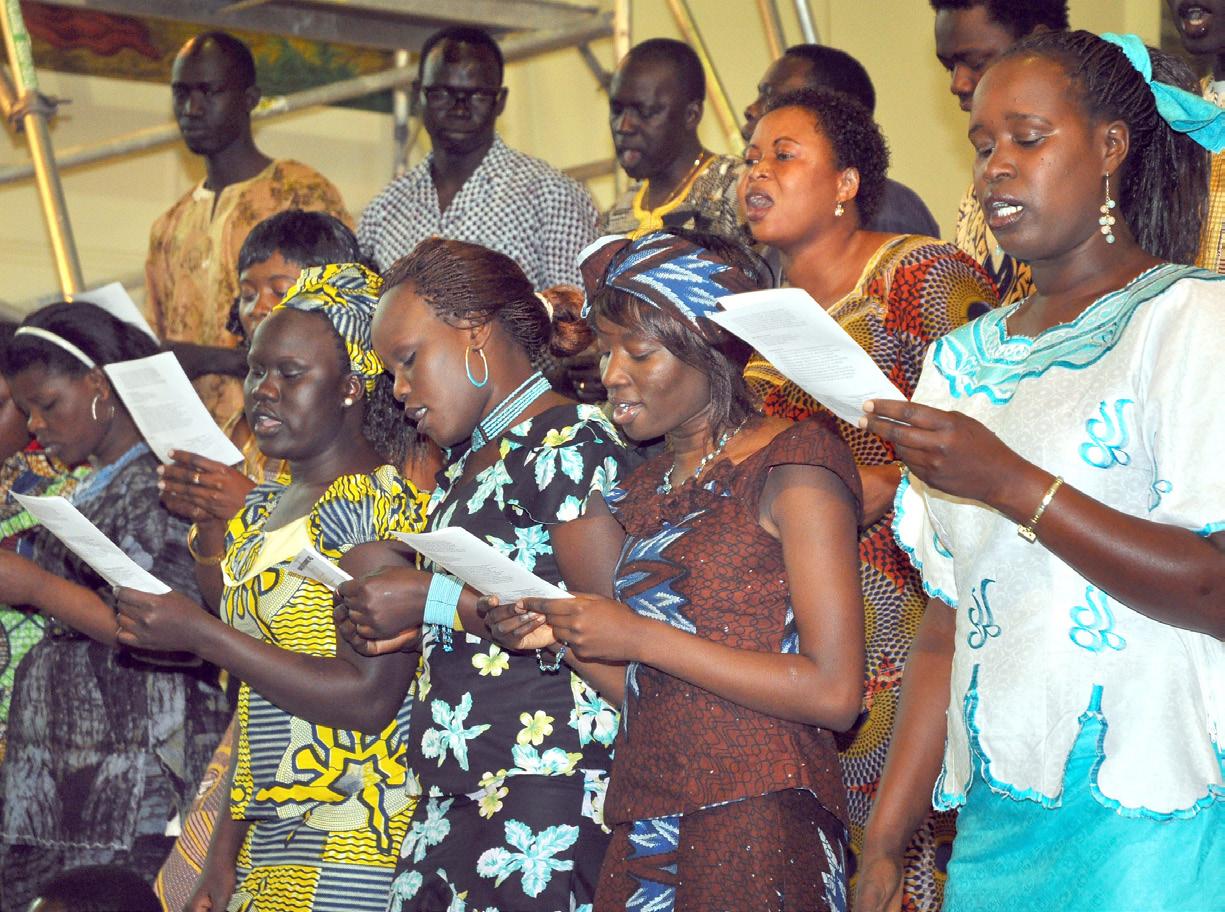
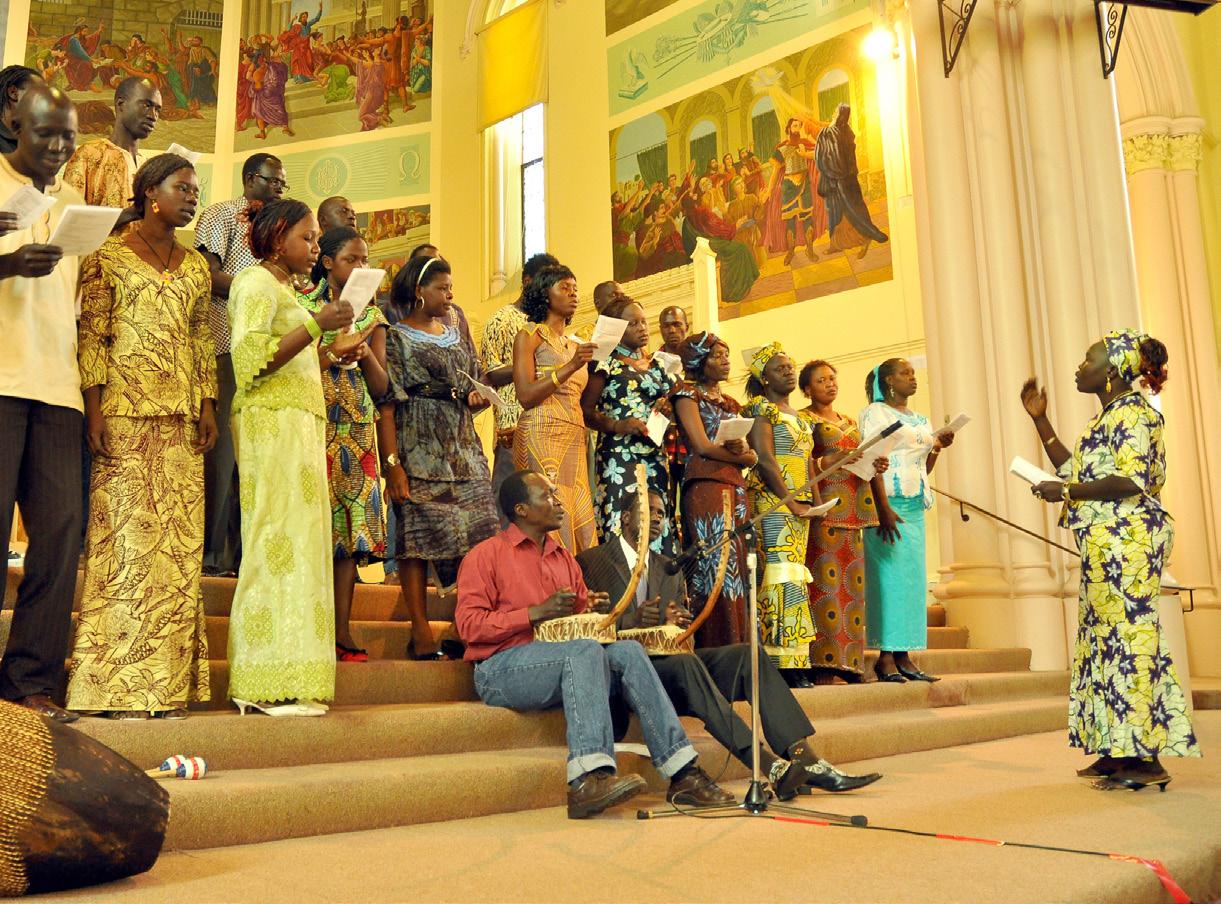
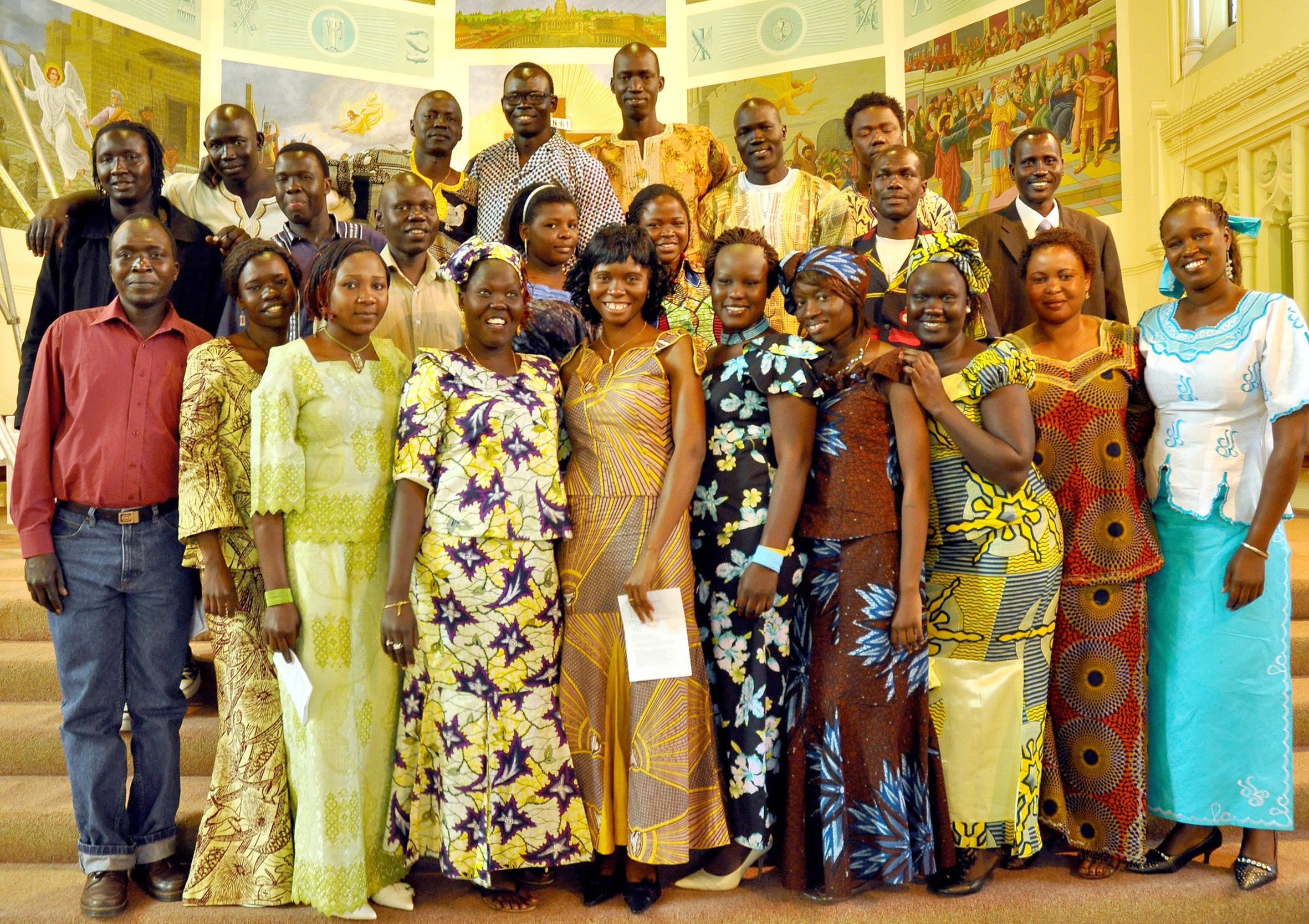
in brief...
Mary MacKillop canonisation mementos are available now for ordering from the Sisters of St Joseph of the Sacred Heart before the Canonisation Mass and celebrations on Sunday October 17.
Scarves, t-shirts, bags and caps would be ideal to wear to the Mass, ferry cruise and then at the University of Notre Dame Australia, Fremantle, where the Canonisation Festival is being held.
• Canonisation t-shirts, all sizes, black and white only, $20. Children’s sizes: 6, 8, 10, 12, 14, 16. Adult sizes: XS, S, M, L, XL, XXL.
• Canonisation caps, black only, $15.
• Canonisation women’s scarf, $12.
• Canonisation calico bags, $15.
• Josephite 2011 calendars are also available, $5. They can be ordered by cash, cheque or EFTPOS from:
Sisters of St Joseph of the Sacred Heart Inc – Mary MacKillop Promotions.
BSB: 066124
A/c No: 10049410
Please enter a reference of your surname with letters MMCM (eg BloggsMMCM). Items do need to be paid for before or on collection.
No credit card facilities available. They can be collected at the South Perth Convent, 16 York Street, or at Penola by the Sea, 27 Penguin Road, Safety Bay, or can be purchased on the day (Sunday, 17 October) at the UNDA, 19 Mouat Street, Fremantle. But why not get your items before the event?
Josephite Sr Maree Riddler says please spread the word to your family, friends, parishes, etc. She is the Director, Mary MacKillop Centre, PO Box 593, South Perth WA 6951. Tel: (08) 9334 0999. M: 0414 683 926. F: (08) 9368 2018. Email: mriddler@sosjwa.org.au.
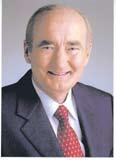
JOHN HUGHES
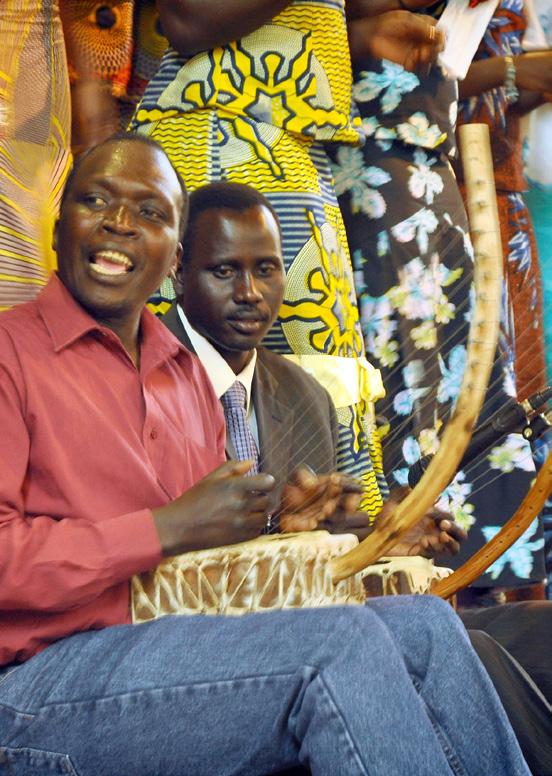
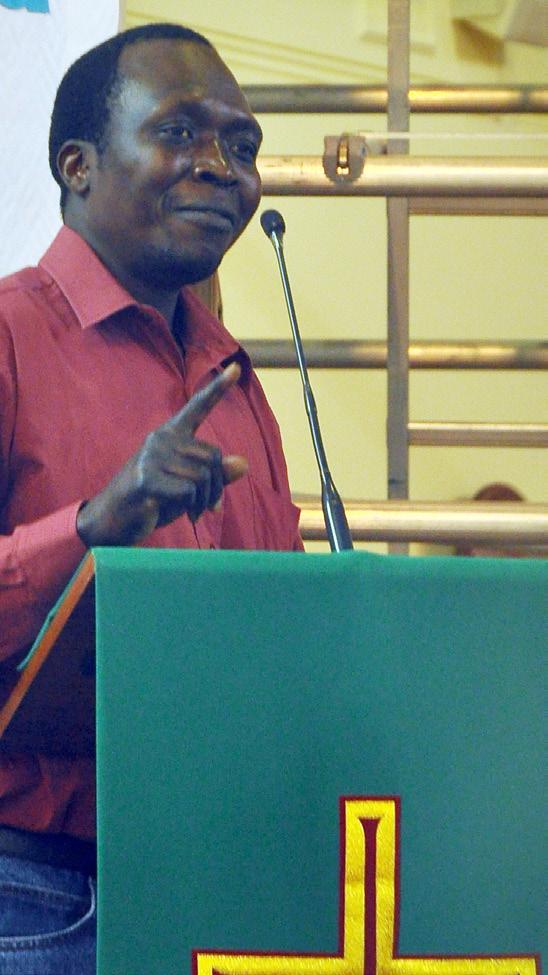
• trading with integrity and determined to give our customers the very best of service?”
Is it true our company philosophy is “We are a friendly and efficient company
Is it true I regularly publish testimonial letters from satisfied customers because • of my tremendous reputation for outstanding service?
• personal recommendation, repeat business and reputation?.
Is it true that most of my sales are not from direct advertising, but from
Is it true I believe that before anyone buys a pre-owned vehicle they should • choose their dealer before they choose their car and that dealer should be me?
• dealer?.
•
Is it true that in 2008 I was Australia’s top selling Mitsubishi, Hyundai and Kia
Is it true that Park Ford have just been awarded dealer of the year?
• was an all-time record?.
Is it true that from January to December 2008 we sold 16,881 vehicles, which
A US priest visiting Perth has described his time as a Catholic chaplain in Iraq as like “living in a frat house” on a US installation.
Fr Van Constant, of the Diocese of Houma-Thibodaux in New Orleans, studied with Claremont parish priest Fr Charles Waddell at the Angelicum in Rome. He told The Record while visiting his old friend in Perth last month of life as a chaplain, which includes dealing with soldiers’ deaths, family crises and their college-like behaviour.
For a priest used to living solo, it takes some adjustment to get used to “a somewhat at-times Spartan expression of living”, which includes the cleanliness of latrines and the behaviour of men who are on assignment a long way from home.
“It’s like living in a frat house,” Fr Constant, 47, said of his time as
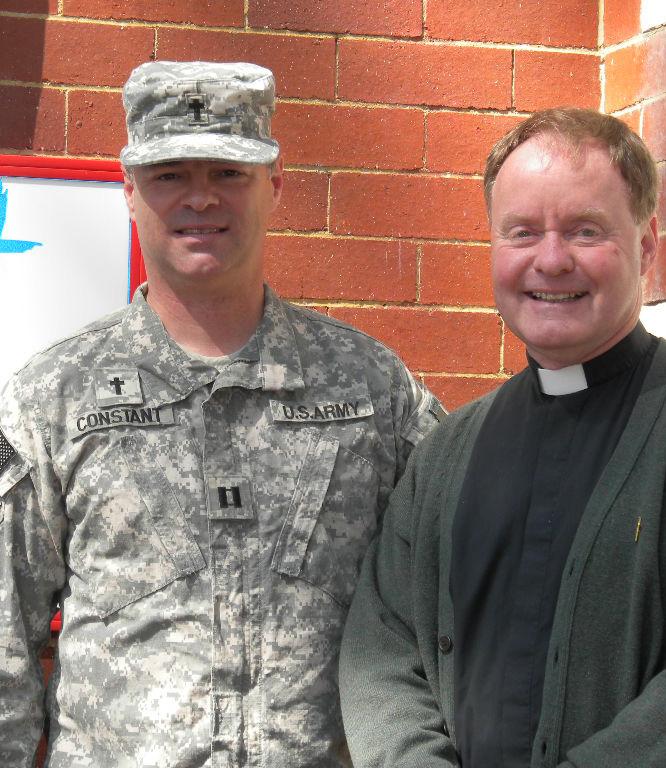
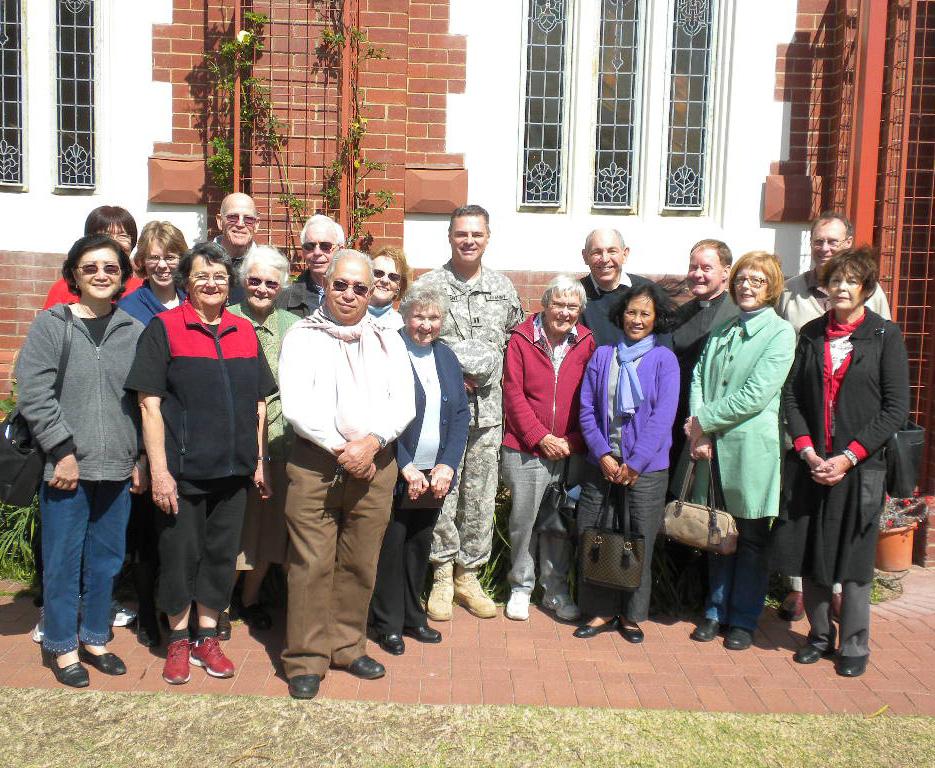
part of the Light Infantry Battalion where he spent 10 months at a US base in Afghanistan as the only Catholic chaplain on a base with 2,500 people, including locals, US military, civilian contractors and ‘third-country nationals’ who work for companies who provide support for the US military.
“You’re living with a bunch of
Want to know more about your fertility? Contact Billings Life on 1800 819 841 for a free information leaflet.
The 2010 Social Justice statement of the Australian Catholic Bishops is called Violence in Australia - a message of peace. The Catholic Social Justice Council of Perth invites you to a seminar that will consider both personal and structural forms of violence in our lives. It will present case studies as to how people experience and deal with violence in their daily situations and ask whether violence can be transformed by more peaceful ways of living together. Some constructive ways of responding to violence will be discussed.
When: Sat, 9 Oct, 10am–4pm, Catholic Pastoral Centre, 40A Mary St, Highgate. BYO light lunch; tea, coffee, juice provided. $8 ($5 students, senior card holders or unemployed). RSVP by Fri, 8 Oct. Ph 9422 7900. Enq Terry Quinn 9422 7926.
Annual Mass: 10am at St John of God Hospital Chapel, Murdoch followed by morning tea. All health care workers are invited. RSVP to Natalie by 1 Oct on 9242 4066 or ljgbc@iinet.net.au.
When: 11 Oct, 7pm, Bioethics Centre, 39 Jugan St, Glendalough. Talk given by Alex Schadenberg, Director/Founder of Euthanasia Prevention Coalition. All welcome. Enq 9277 1644 or email afawa@msn.com.
By Fr Paul Glynn SM. Theme: With the help of the Holy Spirit, to pray to Jesus and the Father. When: Sat, 9 Oct, 9am-5pm (BYO lunch to share); Sun, 10 Oct, 9am–5pm (lunch provided). Where: Bioethics Centre, 39 Jugan St, Glendalough. Enq John 0412 798 932.
Wellington Rd, Morley. On the third Sunday of every month at 9.30am the Personal Advocacy
guys who aren’t always conscientious of their neighbour, so you’re constantly reminding them of being on their best behaviour to keep the latrines at a certain dig-
Service join the parishioners at Morley to celebrate Mass together. This Inclusive Liturgy is adapted to encourage participation of people with special needs. Dates for the next Masses are 17 Oct and 21 Nov. For further details phone 9275 5388.
An inspirational, family-friendly conference that will provide Catholics of all ages with new and exciting ways to explore Scripture and prayer and apply it to their everyday life will be held at the Queen of Apostles Parish in Riverton from 7-9 Oct. Entitled Seek 2010 - Seeking the God who is seeking you, the conference brings together gifted speakers from Perth and interstate who will share their wisdom and experience and provide practical ways to assist participants in discovering, rediscovering or deepening their relationship with God.
Talks, workshops, worship, prayer, Mass and a youth night on Saturday evening are all part of a programme designed to help people find God in the busyness of life, deepen their understanding of the Eucharist, evaluate the often distorted perceptions of God and establish a real relationship that can impact on their everyday life.
There will be activities for children as well as a crèche so that all members of the family will be able to participate and benefit from the spiritual smorgasbord on offer. There will also be facilities available to make the conference accessible to those with hearing impairments. Cost: $20 single/$25 family.
When: 7.30pm, Thu, 7 Oct to 4.30pm, Sat, 9 Oct
Where: Queen of Apostles Parish, 57 Tudor Ave, Riverton.
Brochures and registrations for this event should be available from local churches. They can also be found, along with more details on the programme and speakers at www.seek2010.org.
For more information, ring Barbara or Su Goh on 9328 8113 or email familylife@perthcatholic. org.au.
Fr Roy Pereira is expecting 900 people at the Malaysian-Singaporean Catholic Community Youth Spring Dinner and Dance, including live bands, spacious dance floor, authentic Asian cuisine available for purchase, raffle prizes, licensed bar and BYO food and drinks - all to raise money for the MSCC’s multi-faceted aims of Youth Development, Aboriginal Youth Spiritual Development, a new Migrant Welcoming Ministry, Children and Adult Spiritual Development, and Fellowship/Networking. For tickets, contact Soma Muthucumaru 0403 536 805 or Fr Roy 0417 936 449.
Where: Leisurelife Centre, Kent Street, Victoria Park.
When: 7pm, 15 Oct. Cost: $20/person.
nity, etc. “Using public facilities with other men is the biggest thing to get used to as priests live solitary lives, and there’s nothing solitary about this - we might be in a tent with 100 guys and one toilet.”
While he celebrates Mass up to three times a week for up to 300 people on the base, “the vast majority” of his work involves helping US men and women struggling with their family situation back home while in combat situations, which causes stress.
“I help them work out in their minds solutions they can set in place now as they’re in a foreign environment, to discuss with their family in civil tones, while thousands of miles away, and help them to understand that their time in Iraq is coming to an end, and to help mothers, fathers, etc with family difficulties,” he said.
“They see me as a neutral person who can keep a secret so they can have the personal release to get things off their chest.”
While the military has had some accidental deaths due to wheels getting caught in a rut while going at speed and the vehicle turns over, (the most vulnerable position is at the gun turret) and it has also had
its share of broken ankles and legs (someone jumps from vehicle four feet down onto loose gravel), he only deals with those who come into US military installations, including Iraqis.
Almost all of these Iraqis have dual citizenship with the US, and those who are Christian have told him that “it’s a dangerous situation for Christians” in the country, but he adds that “no one to this point has elaborated as to what it means now or in the future”.
He has only experienced one death, which “everyone on the base was broken up about”. In April, a man was riding in a convoy – always a dangerous proposition – that was hit by an explosive device; and it was a death that was totally avoidable. The man was merely riding the convoy seeking information as an expert on how vehicles were performing.
Riding by convoy is a rare experience for chaplains, who mainly travel between bases by helicopter, preferably Black Hawks.
Chaplains are non-combatants, are not allowed to carry weapons but are assigned assistants who are trained soldiers to be their bodyguards.
Fr Constant is a Captain due to his age and will progress to Major next year.
Despite the emotional journey of dealing with troops in combat, he says life as a parish priest is much more demanding, meeting the needs of so many parishioners over a much larger space.
In Iraq, he’s mainly stuck in one installation and everyone knows where he is.
People just approach him as they please.The most he’ll travel is a helicopter ride maybe twice a week.
His journey to the army was providential. Having befriended US military personnel assisting with Hurricane Katrina in 2005, they asked him to join as Catholic chaplains were few. At 41 he thought he was too old, but the limit entry age was 45, so his Bishop agreed he could serve the National Guard every five years and the diocese the rest of the time.
Now offering courses at the new centre, 33 Williamstown Rd, Doubleview
Term Four 2010: Tues 12 Oct - Fri 3 Dec
8 WEEKS - COST $50
Tuesdays 9.30am -12pm, Julian of Norwich “…all shall be well…” Mrs Stephanie Woods 1.00pm - 3.30pm, Finding God in all Things: The Spirituality of Teilhard de Chardin Mr John Auer
Thursdays 9.30am – 12pm, Teresa, John and Therese: Spirituality of the Carmelite Doctors Miss Michelle Jones 1.00pm - 3.30pm, Mary, Mother of God and first Disciple! Mrs Jan O’Connor
Fridays 9.30am - 12pm, Women as Peacemakers: the Spirituality of Non-Violence Mrs Judith Woodward, Mrs Ann Graham, Mrs Ann Semaan, Mrs Grace Reid
Mon 25 Oct - Wed 1 Dec
6 WEEKS - COST $35
Mondays Beginning Theology Sr Philomena Burrell
Following Christ in the Third Age of Life Mr John Auer
Wednesdays “Prophetic Voices – Old and New” Mrs Stephanie Woods
Christian Worship - Christian Ritual: Celebrating Our Faith Sr Philomena Burrell
To register or for more information, contact Maranatha office:
Phone: (08) 9241 5221 Fax (08) 9241 5225 Email: maranatha@ceo.wa.edu.au
Outback missions established by Blessed Mary MacKillop’s Religious Order are in serious jeopardy unless lay workers replace the ageing Sisters, the director of the Pontifical Mission Societies’ Australian arm said.
Paying tribute to the pioneering work of the Sisters in the East Kimberley, Catholic Mission director Martin Teulan said the shortage of pastoral associates in the Broome diocese needed to be “urgently addressed if the faith missions the Sisters of St Joseph have pioneered with Aboriginal people are to be carried into the future”.
Five Sisters currently work as pastoral and family support workers in remote areas with three lay volunteers managing the Mirrilingki Spirituality Centre in Warmun, 600 miles north east of the diocesan centre in Broome.
There are no lay pastoral associates in the region, sources told The Record.
“There is a real need for volunteers for practical and pastoral work with the Kimberley Lay Missionary Association,” he said, calling on Catholics to financially support its Home Mission Fund during World Mission Month in October.
“There is a great need for funds to undertake many worthwhile projects with the indigenous people. These projects are led by priests, Sisters and wonderful Aboriginal elders.”
He said the Sisters had been answering the call to bring Christ to the East Kimberley for over 45 years, since they set up their first school at Wyndham in 1964; 2,000 miles north east of Perth.
Catholic Mission, he said, is trying to tap into Mary MacKillop’s “Christlike humility; working for the poor in the face of persecution” to inspire Catholics to help give Third World countries more access to the Eucharist in the lead-up to World Mission Sunday on 24 October.
Blessed MacKillop’s humility, modelled on the suffering of Christ on the cross is “a humility that Catholic missionaries throughout the world emulate
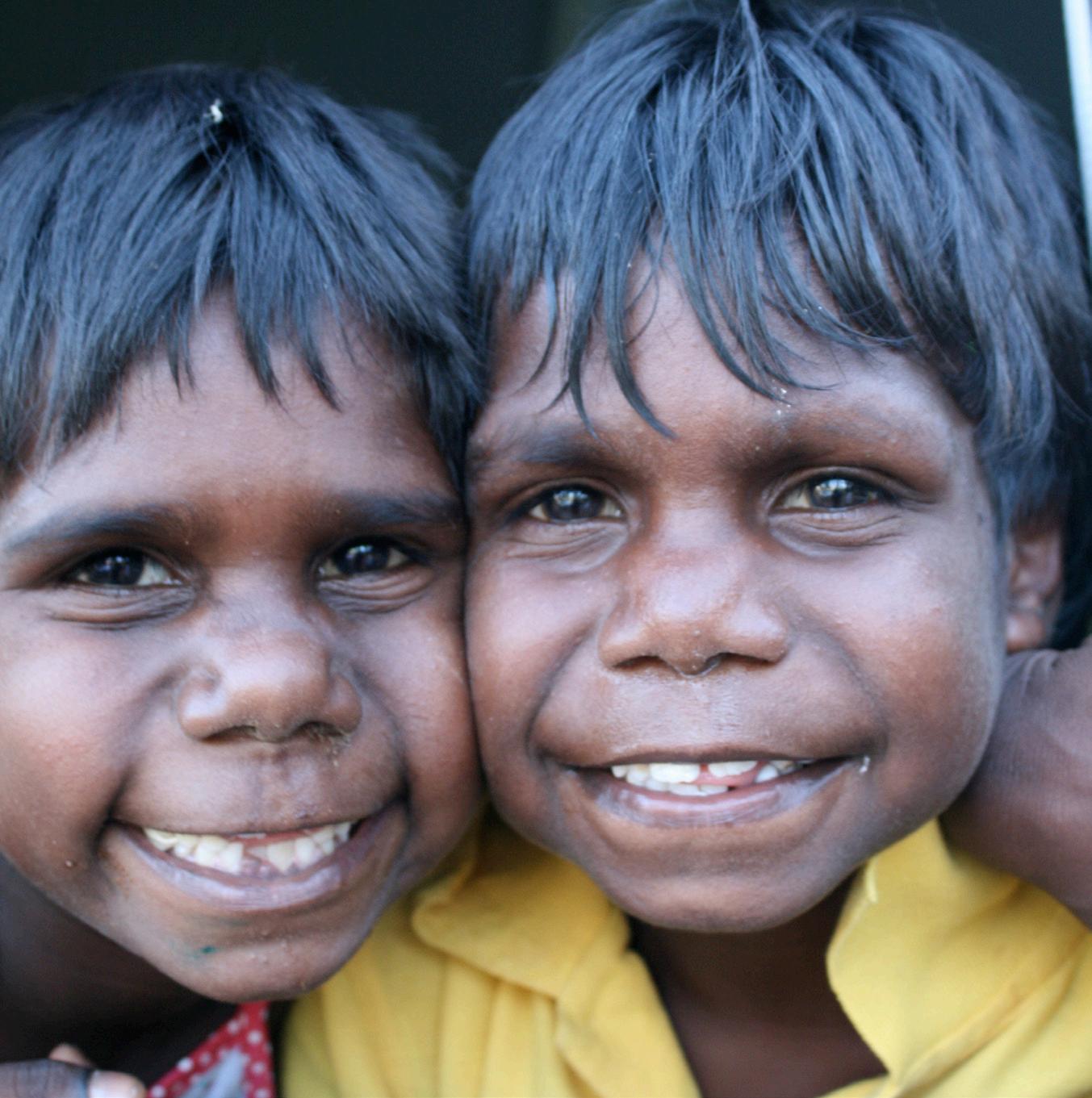
in the midst of terrible human suffering and persecution,” a 24 September Catholic Mission statement said.
Catholic Mission’s Perth Archdiocesan director Francis Leong said this humility enables Catholics to “build authentic communities united in Christ, exalting the lowly, the marginalised and persecuted, the poorest of the poor.”
“It is a humility we are all called to support and emulate as missionaries in our own community.
“In his World Mission Sunday 2010 message, Pope Benedict XVI reminds us that ‘building ecclesial communion, communities united together in Christ, is the key to mission’, and that
‘an authentically Eucharistic Church is a missionary Church’.”
Catholic Mission also wants to ensure that the Eucharist is “present, accessible and available”, especially to the Third World, “to peoples desperate for the healing and hope that it offers amidst unrelenting suffering”.
Mr Leong also cited the Pope’s February 2007 Apostolic Exhortation, The Sacrament of Charity: “Those who eat the Bread of Christ cannot remain indifferent before those who lack daily bread.
“We cannot approach the Eucharistic table without being drawn into Christ’s Mission in the world, which is meant to reach all people.”
Continued from Page 1
Contrary to the bill proponents’ claims that euthanasia avoids the possibility of people dying without dignity, SJOGHC’s holistic approach respects the dignity and worth of each person, affirms life and regards dying as a normal process, he said.
“This underpins its delivery of palliative care, a service in which it continues to advance and excel,” he added.
The group’s services have attracted commendations from the Australian Council on Healthcare Standards for ensuring the care of the dying is managed with dignity and comfort.
The group has also implemented End of Life Care Pathways which reflect leading practice in care of the dying, in collaboration with other palliative care agencies.
“Voluntary euthanasia or physician assisted suicide are not part of palliative care practice, which among other things provides relief from pain, integrates psychological and spiritual aspects of patient care, and offers support systems to patients and their families,” Dr Henderson said.
SJOGHC has also produced Advance Health Care Directives in WA, which ensure a patient’s personal treatment decisions are recorded and respected, and set out the rights of adults to make
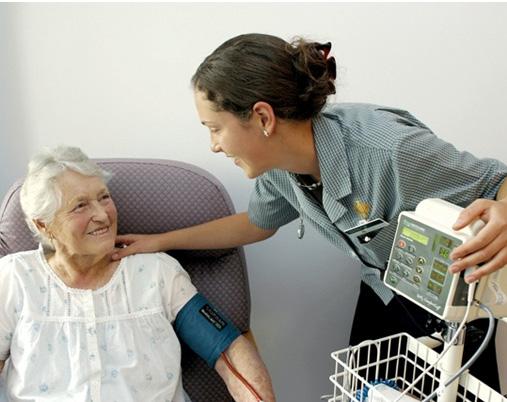
Mirrilingki Spirituality and Retreat Centre, between Kununurra and Halls Creek, is in urgent need of volunteers during September, October and November this year.
Volunteers will help with cooking, cleaning, gardening and general maintenance. A companion to assist with general caretaking of the centre is also needed during the wet season holiday of December, January and February, into 2011.
The centre is nestled in between the ranges around the Warmun community and close to Highway 1, two hours south of Kununurra, two hours north of Halls Creek and close to the Bungle Bungles.
The centre caters for pastoral and personal development programmes run for personnel, parishioners and employees of the Broome diocese as required by parishes, schools and pastoral workers.
It is close to the local Warmun Aboriginal Community, which includes a Catholic primary school, Josephite community, clinic, store and aged care facility.
The local community has always regarded Mirrilingki as a warm and welcoming place, and the interaction between the community and the centre happens quite naturally, Diocesan Family Support Worker Sr Alma Cabassi RSJ said.
The Warman community often uses the centre for meetings and other gatherings.
The viability of the centre is greatly enhanced by the presence and talents of volunteers who have been part of its operation for many years.
Some have returned many times to offer their services.
The diocese provides accommodation and ‘keep’ in return for work at the centre for periods ranging from three months to a year or more.
Volunteering at Mirrilingki offers the opportunity to see some wonderful country and to meet some wonderful people, Sr Alma said.
“It offers the opportunity to learn something of the sometimes shameful history of our nation’s interaction with Aboriginal people in the north-west of Australia and of the more recent struggle to overcome the longterm effects of colonisation and dispossession,” she said.
“Mirrilingki stands as an ‘oasis in the desert’, a place of quiet and healing, of sharing and learning, of service and reconciliation.
“Could this be the place for you to spend a few months?
“You may come to give, but, if most people’s experience is anything to go by, you will return home having received much more.”
Please contact Sr Alma Cabassi RSJ, Diocesan Family Support Worker, at PO Box 892, Kununurra 6743, telephone 9168 2246 or Cabassi.alma@gmail.com or the website www.broomediocese.org/mirrilingki or www. broomediocese.org/volunteers.
and have respected certain decisions regarding their future medical treatment within a legal framework, he said.
SJOGHC operates four hospitals in Western Australia, seven hospitals in Victoria and two hospitals in

Greens leader Bob Brown’s effort to rehabilitate the Northern Territory’s vetoed euthanasia law is “ham-fisted”, while the Bill itself is impractical and defective legislation even to euthanasia supporters, leading Jesuit Fr Frank Brennan said.
The global momentum is also presently against the euthanasia lobby, he said, based on an “eloquent (Senate) submission” in 2008 from the Australian Medical Association, evidence from UK medical authorities, the US Supreme Court’s declaration that there is no right to euthanasia and the failure of Lord Joffe’s UK legislation.
“On balance, nothing has changed or, if anything, the antieuthanasia case is probably slightly strengthened if we look at developments in equivalent jurisdictions,” Fr Brennan said.
Mr Brown stated on 19 September his intention to start a new debate on laws that prohibit the NT and ACT from legalising euthanasia.
Under the new agreement between Prime Minister Julia Gillard and the Greens to gain Labor government, the Greens has greater power to demand debate on private members’ bills; and Gillard’s spokeswoman confirmed, “The Prime Minister is happy to discuss Senator Brown’s proposal in their regular meetings”.
Mr Brown introduced his Rights of the Terminally Ill (Euthanasia Laws Repeal) Bill in 2008 which, if passed, “would have had the effect of resuming the operation of the original 1995 Territory law which by then even Dr Philip Nitschke had conceded in an article in The Lancet was defective legislation,” Fr Brennan said.
It is defective and impractical, Fr Brennan said, as “the NT law requires a psychiatrist to have ‘confirmed that the patient is not suffering from a treatable clinical depression in respect of the illness’ before a medical practitioner is allowed to administer the lethal injection.”
“To what extent was the psychiatrist trusted with important data and able to build an appropriate alliance that permitted a genuine understanding of a patient’s plight?” Fr Brennan, Professor of Law at Australian Catholic University’s Public Policy Institute, said in the Jesuit journal Eureka Street on 21 September. “The real quandary with assisted suicide through removal of nutrition and hydration is determining when the law will deem a decision to terminate life an act of informed consent, being irrevocable even though the patient has mood swings and moves in and out of consciousness. Not everyone who says, ‘I wish to die. Please terminate all nutrition’ will remain clearly of that resolve.”
The law will need to specify the conditions for presuming that a patient has made an irrevocable choice for death, even when no one would be adversely affected by the health provider complying with the later revoked wish of the failing patient clutching to life, he said.
“Presumably, there will be a need to impose an obligation on health professionals to ensure that the choice to die remains firm until loss of consciousness. If this obligation were always to be faithfully
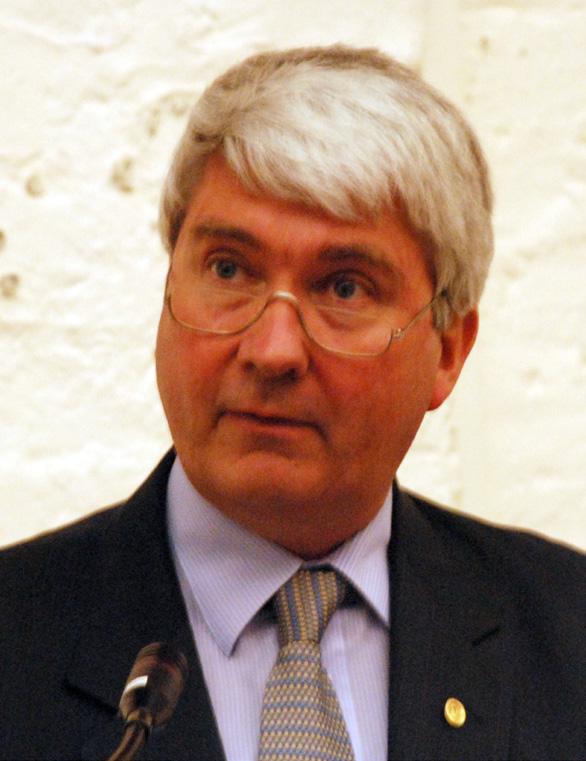
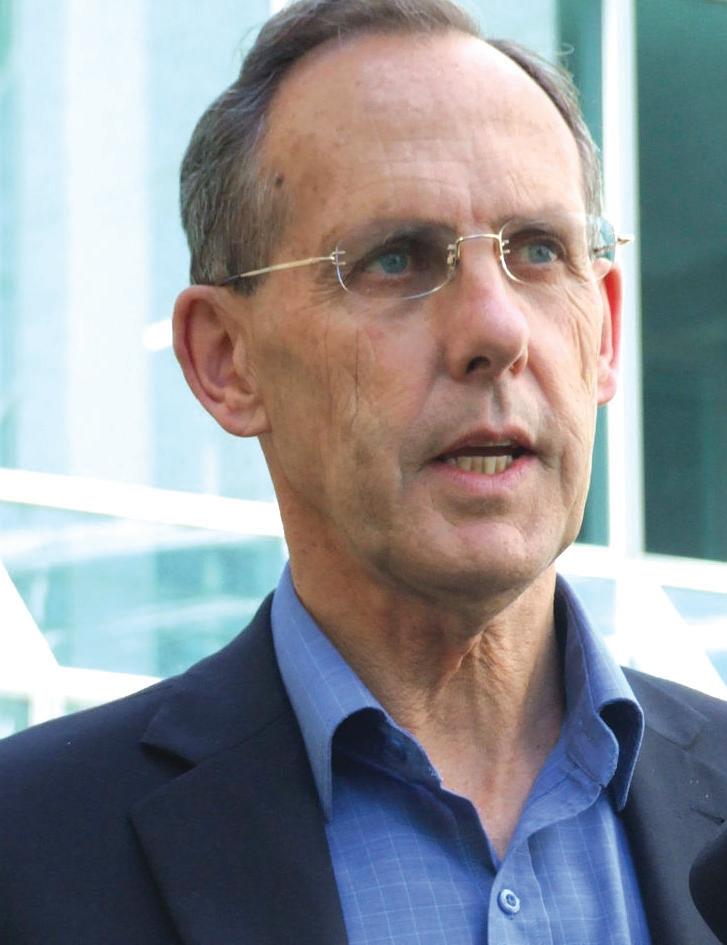
discharged (which it won’t be), it would be very onerous,” he added.
A hung parliament would not have the time or resources to consider such a complex issue, Fr Brennan said, and backed Opposition Leader Tony Abbott’s claim that “there are real ‘bread and butter concerns’ that this parliament needs to get its head around” first.
Even claims by patients who have been used by the euthanasia lobby had proven to be misdirected, Fr Brennan said. In the case of the much-publicised WA case of Christian Rossiter’s request in the WA Supreme Court for termination of hydration and nutrition, Fr Brennan noted that Rossiter had been “particularly cheered by the ministrations of an outreach carer from Perth Home Care services”.
The Sunday Age reported that the woman, who has been refused permission to speak to the media, had encouraged Rossiter to record his life story, notably about his childhood in South Africa, with the idea of publishing a memoir.
“What then was the court case about? He may well have been suffering intense pre-mortem loneliness, as distinct from depression. He died of a chest infection more than a month after the court gave the all clear for his carers to terminate hydration and nutrition should he request it,” Fr Brennan said.
In the ACT case of doctors wanting to terminate treatment of Mr JT, Chief Justice Terence Higgins said: “The patient here lacks both understanding of the proposed conduct and the capacity to give informed consent to it. Thus, those charged with JT’s care remain under the common law duty to provide that care to the best of their skill and ability.”
“The Chief Justice had cause to comment on ‘an outrageous approach to ethical standards’ disclosed in the case,” Fr Brennan noted.

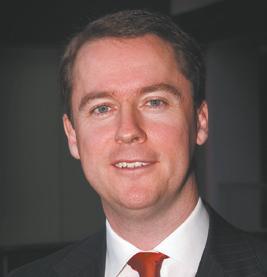
Only the wealthy are healthy, according to landmark study commissioned by the advisory body to Australia’s Catholic Bishops
Economists divide Australia into five income groups.
A report released today finds people in the lowest of these income groups live 3.1 years less than those in the highest income group.
The report, Health Lies in Wealth, finds 65 per cent of people in low income groups have long term health problems, compared with only 15 per cent in high income groups.
The report also finds obesity rates are three times as high in low income families as they are in high income families.
For the duration of the Rudd Government, health reform focused mostly on hospital beds.
There are 84,000 hospital beds in Australia - roughly one hospital bed for every 266 people. Catholic health services operate about 9,000 of these total hospital beds.
The Rudd Government made changes to hospital financing to better position State and Territory Governments to meet the cost of public hospital services into the future. For this, the Government deserves credit.
But health reform in the last term of Government was rather limited.
Reform did not prioritise keeping people out of hospital in the first place.
It did not prioritise the social determinants of health.
Health reform needs more than a focus on hospital beds.
Catholic Health Australia, the voice of 75 not-for-profit hospitals across the nation, is deeply interested in the working of hospital beds.
We’re more motivated to keep
people healthy and out of hospitals altogether.
Health reform requires action in three distinct areas, only part of which concern hospitals.
The first step of reform is to strengthen the responsive or reactive components of health care.
Hospitals need to be funded to cope with demand. There need to be enough doctors and nurses to treat patients. Universal access to medical and pharmaceutical treatment is required.
There is much on the ground work to be done in strengthening responsive health care.
More dollars are needed, but at least government policy is focused on the traditional components of hospitals and health care professionals that are the backbone of Australia’s health system.
The second step of policy reform is to ensure community commitment to preventive health.
There is growing awareness of the need for physical activity and healthy diets, combined with tobacco and alcohol control.
The policy focus on preventive programmes could be better, but again governments are at least aware of the need for more action.
The third, and mostly ignored component of health reform, is action on the social determinants of health.
Social determinants are the building blocks of good health.
The determinants are such things as the experience of an unborn child in the womb.
If an unborn child is exposed to undue stress, trauma, or substance abuse, it is possible that child’s long term health will be adversely impacted upon.
Other social determinants include early childhood development, primary and secondary schooling, and the level of education a person completes. A United States study reveals non-completion of high school is a greater risk factor than biological factors for development of many diseases.
Another US study found the level of a person’s formal education better predicted cardiovascular death than random assignment to an active drug during a three year clinical trial.
Income levels, job status, housing, and whether a person
lives in a metropolitan, regional or remote setting are all social determinants of health.
Put together, a person’s education, access to income, and access to housing greatly impacts upon a person’s health status to the point that on national average, those in the lowest socioeconomic group will die 3.1 years earlier than those in the highest socioeconomic group.
There is nothing new about the social determinants of health.
In 1998, the American College of Physicians said job classification, as a measure of socioeconomic status, better predicted cardiovascular death than cholesterol level, blood pressure, and smoking combined.
In 2008, the World Health Organisation (WHO) developed a framework for countries like Australia to take action on the social determinants of health.
The WHO was rightly critical of the low life expectancy for Indigenous Australians.
The WHO framework has not been adopted in Australia, but at least the ‘Closing the Gap’ initiative is taking action on Indigenous health.
If early childhood development, schooling, income levels, housing, and welfare services are so important to health outcomes, how can we integrate them into the health reform agenda this new hung (and regionally focused) parliament will be asked to implement?
As new Local Hospital and Primary Health Care networks are established around the country, they must be tasked to report and act on the social determinants of health.
The most disadvantaged areas of Australia, many of which are in regional and remote locations, will need extra resources for social service interventions.
Action on the social determinants of health does not mean less focus on hospital policy, or less focus on preventive health.
Instead, it requires broader recognition that if we only worry about a person’s health when they present at a doctor’s surgery, for many the social determinants will have already dictated their eventual health outcome.
Martin Laverty is the Chief Executive of Catholic Health Australia, which released the report Health Lies in Wealth on 27 September.
The baptism of a baby boy born in detention in Sydney has signalled a new life for a Sri Lankan refugee family who arrived illegally by boat as asylum seekers.
Risen - so called as he was born 7 April, the Wednesday after Easter Sunday - was baptised on 12 September by Jesuit Fr Sacha Bermudez-Goldman, director of the Jesuit Refugee Service, at St Canice’s Church, a Jesuit parish in Sydney harbourside suburb Kings Cross.
The baby’s godparent, also a Tamil Sri Lankan who arrived in Australia 27 years ago, is now helping to have baptised the baby of a Hindu couple - from the same village as Risen’s parents – who made a promise to Our Lady to convert if they arrived safely to Australia.
Risen was born at St George Hospital in Sydney under security to ensure the family would not try to escape after his mother went into labour when she and her husband were in detention at Villawood Immigration Residential Housing in Sydney.
His father was given special permission to spend a few days with his family at the hospital. A source told The Record that the authorities were “very compassionate” towards the family in their difficult circumstances.
The family returned to Villawood a few days after the birth, but have since been granted permanent residency and released.
The couple, who prefer not to be named, had been in detention for a year, including eight months at Christmas Island Immigration Detention Facility - located 1,600 miles north of WA - which in April exceeded its official capacity of 2,040 after a number of boats had been intercepted on their way to Australia.
They also spent four months prior to the birth in detention at Villawood, which has been a flashpoint for the Federal Government’s controversial asylum-seeker detention policy this week.
On 21 September, officials from the UN High Commission for Refugees persuaded 11 asylum seekers to climb down from a roof where they had staged a 30-hour sit-in protest. Some had threatened to throw themselves off and had to be restrained by fellow protesters, while others cut themselves, The Australian reported.
Sydney Australian Tax Office worker Tarcisius Matthias, who migrated from Sri Lanka 27 years ago, agreed with his wife to be Risen’s godparents after his local Toongabbie parish secretary contacted him and said a recently released refugee couple needed godparents for their baby.
Tarcisius, 66, told The Record that the baby’s parents befriended a Hindu family on the boat trip from the same village who

“pledged to Our Lady back in Sri Lanka that they would become Catholics if Mary gave them safe journey to Australia”.
Tarcisius - the eldest of six whose younger brother is a diocesan priest back in Sri Lanka and whose late uncle was a Benedictine priest - is now helping them organise to have the Hindu family’s baby baptised and then the parents.
having stopped on an island on the way for “mechanical repairs”.
Blessed Mary MacKillop, known as a prolific letter-writer, will be immortalised on an Australian stamp and limited edition medallions to be issued on 18 October, the day after Pope Benedict XVI will canonise her as St Mary of the Cross in Rome.
Sr Sheila McCreanor, Secretary General of the Sisters of St Joseph who has edited three published volumes of Blessed MacKillop’s letters, told The Record that the stamp series is “entirely appropriate given she was such a great letter-writer”.
She added that the stamp series was a “mark of honour” and a “wonderful reminder to people of Mary’s heroic goodness and the great impact that a life lived in fidelity to God can have on the world”. It is also a testament to her legacy as a pioneer in education.
An Australia Post spokesman told The Record that doing so is “the Australian public’s way of recognising the country’s first saint”.
The Canonisation of Mary MacKillop stamp issue is accompanied by a stamp and medallion cover featuring three medallions, which depict images of Mary’s first Schoolhouse in Penola, South Australia, Mary with Schoolchildren and a portrait of Mary. The stamp and medallion cover will be sold for $29.95 from Australia Post retail outlets and online at aus-
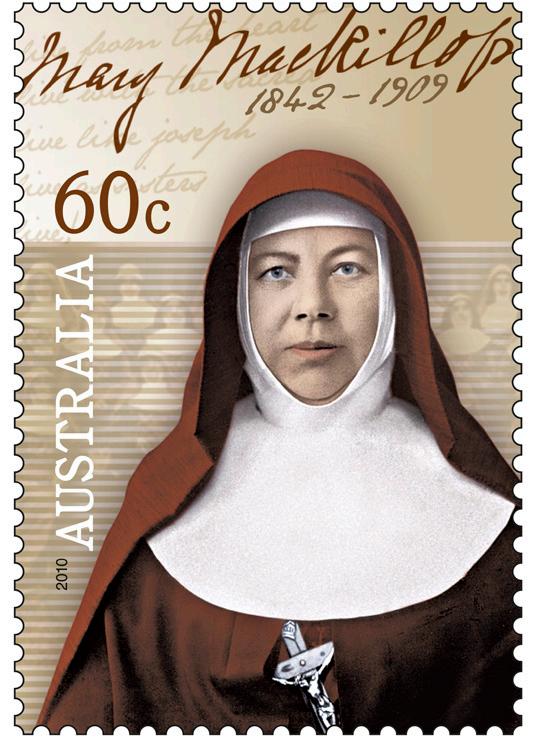
post.com.au/stamps from 18 October. The Mary MacKillop stamp series has been designed by Adam Crapp from Australia Post Design Studio who also designed the Mary MacKillop prepaid envelope released in April 2010.
As Blessed MacKillop’s canonisation will be celebrated around the world with services, vigils and pilgrimages, Australia Post will mark the occasion and “recognise the selfless acts of this inspirational heroine in its own way with a special stamp issue”, Australia Post Philatelic group manager Noel Leahy said.
WA Province leader of the Sisters of St Joseph of the Sacred Heart, Sr Pauline Morgan, told The Record that, aside from their foundress being recognised by Catholics through her canonisation, the stamp would promote her works to the secular side of Australia.


Risen’s father, an electrician by trade, now works two jobs, in a restaurant with the Hindu family’s father and in a carwash. He plans to re-train in his field of expertise, while Risen’s mother will start English lessons when he is six months old.

Tarcisius, a Tamil, said his involvement helping other Sri Lankan refugees has been rewarding, and he will begin visiting more at Villawood after he retires within the next year, as it is less then 30 minutes’ drive from where he lives.

“I consider it as a gift from God. It’s an honour’, said Matthias of being Risen’s godparent. “You can help people with zero dollars. You just need to give your time.” His wife Matilda told Province Express Jesuit online journal that while “we came on a plane … these people came on a boat. You have to really suffer to take that kind of risk.”
Tarcisius, who has been involved in the Tamil Community Catholic Association since its inception in 1991, told The Record that Risen’s parents’ boat trip was “hazardous”,
Following the call to secular consecration we remain in our chosen work, social, and living situation, in the world, our mission is one of service, living Gospel values, in the spirit of St Francis
Visit website: www.catholicozvocations.org or Write to : The Vocations Director, Secular Institute of the Missionaries of the Kingship of Christ P O Box 356, Doveton Vic 3177.




There is a strange kind of phenomenon that has come to apparently dominate large swathes of the Church in Australia, especially in Catholic Church bureaucracies, which might be defined as a fear of disagreement with others. It might be a peculiarly Australian thing, something to do with our convict background. Then again, it could be something to do with a general loss of character as Christians. This occasionally charming sensitivity to others’ feelings, a remainder of 19th century manners, has rapidly evolved into a blandness across the life of much of the Church in this country that is impressive only in its extent. It actually has deadly, strangling consequences. Many have come to accept that Catholicism is niceness.
Of course, the Church can never be in a state of final crisis leading to extinction. It is the only institution in the world that has a divine guarantee to last until the end of time. Beyond that guarantee nothing is certain. On the other hand, the Church has certainly effectively died out in parts of the world. One thinks of northern Africa, one of the early heartlands of Christianity. The point is important because the blandness of much contemporary Australian Catholicism, from parish life to Catholic bureaucratic offices, gives the observer every reason to conclude that the same sort of thing could happen in this country.
If one were, for example, to have a friend who says “I have read the Gospels. Where do I find this Christian community that is spoken of in them?,” one wonders whether the average Australian parish would impress such an individual. There is a good chance that many would not. The music in many Australian parish Sunday services, to take just one relatively minor example, is so far from uplifting as to be almost beyond parody. The experience of it is something that can only be humanly borne by offering it up to God as penance for one’s own sins while conducting at the same time a searching personal examination of conscience with the object of humility. What makes it even more difficult to experience is the enormous enthusiasm that parish musicians seem to have for it. Often, it is difficult to tell the difference between music used in a parish and music used in a childcare centre. Of course, there could be benefits. Paradoxically, much normal liturgical music in Australian parishes is possibly the single most effective way ever hit on by Catholics in Australia to help those who have gone before us marked with the sign of faith to get out of Purgatory. Perhaps that is what the liturgistas who helped introduce it in the 1970s were really thinking. What goes with this state of affairs is a singular lack of courage or initiative in showing the faithful the richness and beauty of what they could be experiencing. This does not mean going backwards 50 years, as so many seem to suspect if one raises the subject, but it might mean occasionally researching the family tree and going back 500 or 1,000 years to meet some of our relatives. Of course, it is such a dangerous thing in the Church in Australia to criticise the status quo of visible Australian Catholic life because people can be quick to take offence at being disagreed with. Once again, it’s the problem of the ‘we’re-Catholic-and-we’re-nice’ mentality.
PO Box 3075
Adelaide Tce PERTH WA 6832
editor@therecord.com.au
Tel: (08) 9220 5900
Fax: (08) 9325 4580
Music is only one ‘tonal’ problem of Australian Catholicism, but it has its own importance. There are many others. The danger of parish life as the equivalent of an inoffensive suburban morning tea gathering is that it impresses almost no-one and certainly not those searching for spiritual truth. This is one reason why those seeking spiritual truth and meaning in our society flock to (originally) eastern forms of mysticism and what is generally called the New Age, because they sense, albeit incorrectly, that the mysticism has gone out of Christianity. It is an understandable error. So often it can look and behave as if it really has.
When still a Cardinal, Josef Ratzinger was extensively interviewed in the mid-1990s by German journalist Peter Seewald. The book-length interview was published as Salt of the Earth, something like a followup to the remarkable Ratzinger Report, published a decade earlier with Italian journalist Vittorio Messori. Both books are illuminating and astonishing in the frankness the then-Cardinal exhibited in addressing the contemporary problems of the Catholic Church. They are also refreshing and heartening. In them, the future Benedict XVI addressed many issues but among them was the problem of the widespread perception that Christianity has become stale. He might also have added that so often we Catholics behave as if it has.
To argue that much of the Catholic Church in Australia has settled into conventionalism is not to automatically argue that Christians should set out to offend others. But fear of disagreement with others in the interests of being ‘nice’ leads all too often to paralysis. It can lead to the dictatorship of the bland, in liturgy, in music, in architecture, but far worse, in our own lives. Christianity is not something that is meant to exist in a state of paralysis. The faith of the ages does not subsist in elevating the blandness of committees and bureaucracies over the needs of the faithful in the Church. It is alive, with blood running through it. ‘Niceness’ does not attract people searching for the meaning of their lives in a society which has rejected the very idea that life has any meaning. If anything, it repulses them and becomes, to a certain degree, repulsive. Christianity as mere conventionality offers no serious answer to anything other than one path among many to becoming conventional. Everywhere, and especially among the young, Australians are searching for meaning, for an explanation of why they are alive and how to become happy. Offering them childcare centre theme music and churches that look and feel like führerbunkers is one way to ensure that they won’t find answers.
ferent light. While members were united in their objections to political interference, privately, or in small goups, they developed several different streams of thought.
Among these were some who came to believe that the Church of England was in error and many of these sought admission to the Catholic Church. Some saw the difference between Roman Catholic, Anglican and Orthodox Churches as being simply local differences of administration yet all really remaining one.
From your summary under the picture of Rev John Henry Newman (The Record, 15 September) I quote: “Cardinal Newman was an Anglican cleric who founded the Oxford Movement to bring the Anglican Church back to its Catholic roots.”
I question the accuracy of the words I have quoted. I know this is a common belief and in fact it was what I taught at both primary and secondary Catholic schools in this State. While researching other matters, I have gathered further information and I believe the situation was as follows. Strange as it now sounds, the Oxford Movement started as a University Protest group though not an unruly one. Instead of it being made up only of anxious undergraduates, members were any person at Oxford University at all levels who were either ordained in the Anglican Church or aspiring to be: Fellows, Masters, Graduate Students and Undergraduates.
The reason for their protest was the extent of Parliament’s interference in the affairs of the Anglican Church. Bills were being presented in Parliament without consultation with the Bishops. The monarch was the head of the Church but that did not give Parliament the right to ride roughshod over it, neglecting custom and courtesy. The protestors did not just protest and write letters. They researched their topic to support their opinion that the Church was, by divine plan, superior to the State. This meant serious study of Scripture and the early Fathers of the Christian Church.
In the process of studying these, many of them came to see their own Church of England in a dif-
Others regarded the differences between the Roman Catholic and Anglican Churches as being a necessary adaptation within the Anglican Church to the progress of society and the needs of changing times, thus seeing the Roman Catholic Church as antiquated and unecessarily conservative, with some of its liturgy (in their eyes) bordering on superstition.
Newman was not the only ‘founder’. There were others just as active and between them there were often differences. However the Movement remained in existence for some time after Newman converted to the Catholic faith, and to some degree it achieved its primary purpose of forging a better relationship with the Parliament of the day.
Hilary Thomas EsperanceThe Greens MP Robin Chapple has done our community a service in bringing to our attention once again the needs of the chronically and terminally ill. Although his euthanasia bill has failed, he is right in thinking that it will surface again.
But I believe he is misguided, however well intentioned, in thinking the answer to human suffering is euthanasia. What is needed is good palliative care.
Currently, only a few specially trained nurses and doctors are qualified palliative care practitioners. Not even our average GP understands the principles of palliative care, let alone the general public. The current euthanasia debate gives the medical and nursing professions the opportunity to
hear our concerns regarding needless human suffering. Then they must take the necessary steps to ensure that palliative care becomes part of the basic training of all medical and nursing students, and that doctors and nurses currently in practice be taught the principles of palliative care as part of their regular in-service. This will take time to achieve but we must begin. Only when good palliative care has become the norm for our frail aged and the chronically and terminally ill, will the cry for euthanasia be significantly diminished.
Fran Ellyard
North Perth
Thank you for you article
‘Cloud of doubt hangs over Pakistan’s future’ (Record 22 September) highlighting the continuing flood disaster in Pakistan.
What you did not report was that in the past week, Australia’s newly appointed Foreign Minister, Kevin Rudd, toured flood affected Pakistan to see firsthand the impacts on families and livelihoods.
As flood waters continue to inundate communities in southern regions, the Australian government pledged an additional 40 million dollars to the relief effort and highlighted the imminent threat of water borne diseases like malaria. Australia is now the fifth major donor to Pakistan’s devastated communities and you can be proud of your contribution to this generosity.
Caritas Australia has raised more than $2.5 million to assist those made homeless by the floods - whose dignity will be restored through your compassion and generosity. Caritas’ partner in Pakistan is Catholic Relief Services.
To donate to Caritas Australia South Asia Floods AppealPakistan, call 1800 024 413, donate online at www.caritas.org.au or send your donation to GPO Box 9830 in your Capital City.
Ray Lowe
Diocesan Director Caritas Bunbury
Brothers, sisters, united by the RosaryBy Anthony BArich
When six siblings aged between 79 and 90 travelled to Geraldton last month to celebrate the eldest’s 90th birthday and her 70th anniversary of profession as a Religious Sister, it was really just an excuse to get away. Thanks to their faith, all are very close, even after all these years and the death of two other siblings. Going away together was a chance to reminisce on old times and spin some yarns after praying the Rosary together every night.
Monica Kirby, a Sister of St Joseph of the Apparition, started the prayer life of her siblings by initiating the Rosary when they were children. Each would alternate leading it every night.
Their 16 children are also very close as a result of the bond formed between these six; the children of Irish migrants, Patrick and Ilene Kirby.
In Northam, they developed a strong friendship with newly ordained Irish priest Fr Tom Gaine. The Kirby family became his second home as Patrick and Ilene still had strong Irish accents.
A strong Catholic ethos developed in the family, with the priest a regular visitor.
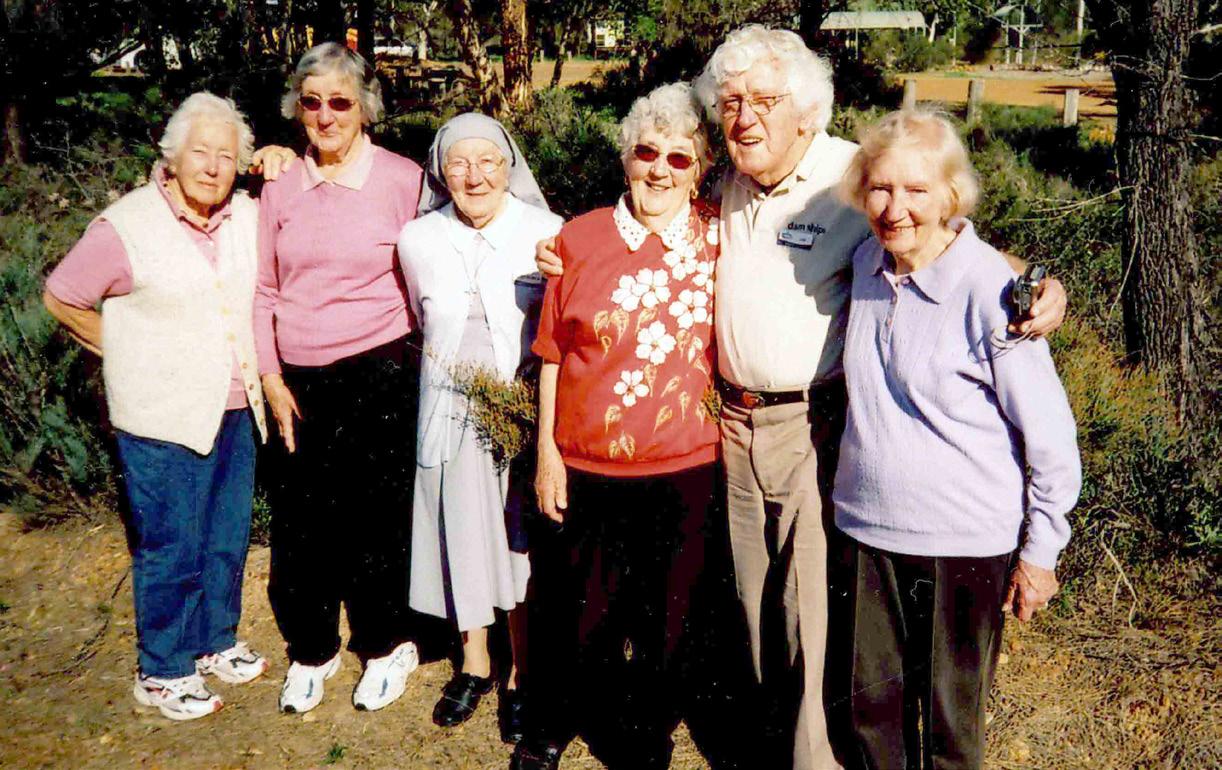
Genevieve, 85 on 12 October and the fifth sibling in line, told The Record that Archbishop Barry Hickey’s comment during his homily at Girrawheen’s recent 25th Anniversary celebrations is completely true – that prayer in the home is essential for the faith formation of children.
“We’re a very lucky family to be so close and regularly visiting and calling each other, and it’s due in no small part to the fact that we’ve
prayed together since we were children,” she told The Record
The strong bond forged between the siblings praying the Rosary together helped them spend quality time with each other, especially when it mattered.
Monica still works two days a week at the Willetton parish office, takes Communion to those who can’t attend Mass and spends much time sitting with those who have no one.
It’s leading Marxists who are scathing in their criticisms of anti-religious figures such as Richard Dawkins, Christopher Hitchens and the new intolerance of the anti-religion movement, as displayed during the recent UK visit of Pope Benedict
The new atheism:
“crusades and Galileo 101” - a socialist thinker comes to the rescue of believers
The literary critic and professor, Terry Eagleton, has made a timely contribution to the God debate, and a unique one. Up until the delivery of his Terry Lectures given at Yale, and their publication in 2009, the God debate had largely consisted of scientists and evolutionists on the one side and religious writers on the other.
The scientists, led by Richard Dawkins, have been writing about God and religion as if they were akin to the gods found in the recent cinema blockbuster Clash of the Titans
In this Louis Leterrier film, the pagan gods are moody and capricious supermen and women who confound and frustrate humanity to the point where humans get thoroughly fed up with them and declare war on their stronghold of Olympus.
On the other side of the debate have been religious apologists trying to defend their faith, quite courageously in most cases, from the emotionally charged harangues of Dawkins, Christopher Hitchens and the French philosopher Michel Onfray.
In doing so, however, they have themselves, at times, presented a watered down and simplified view of religion in their efforts to defend the literalism of the Bible and strange forms of New Age spiritualism.
Eagleton aligns himself with neither of these camps but has a good deal to say in defence of the religionists, whom he considers abused by the caricature of religion presented by Dawkins and Co.
Eagleton was raised in an Irish Catholic household but left the Church during his years as an undergraduate and, in his subsequent academic career, adopted a Marxist outlook.
This he has tempered somewhat after the failures of Soviet Communism but he retains an allegiance to socialism.
In Reason, Faith, and Revolution: Reflections on the God debate - the published and expanded version of his lectures - Eagleton argues that the description of religion, and mainly Christian religion, offered by Dawkins and Christopher Hitchens largely consists of a 101 course on the Crusades, the persecution of Galileo, and the case of Pius XII during the Holocaust.
For good measure, they throw in the consequences of 9/11 - just to show that they have some idea of the religion outside the Christian context.
Dawkins’ The God Delusion , Hitchens’ God Is Not Great, and Onfray’s The Atheist Manifesto, draw on some well worn clichés and straw men to show why we should shun religion.
Eagleton points out that such a view of religion is biased and unfair.
The importance of religion for a great many people today and throughout history is excised in a view that narrows down to the controversies in its history.
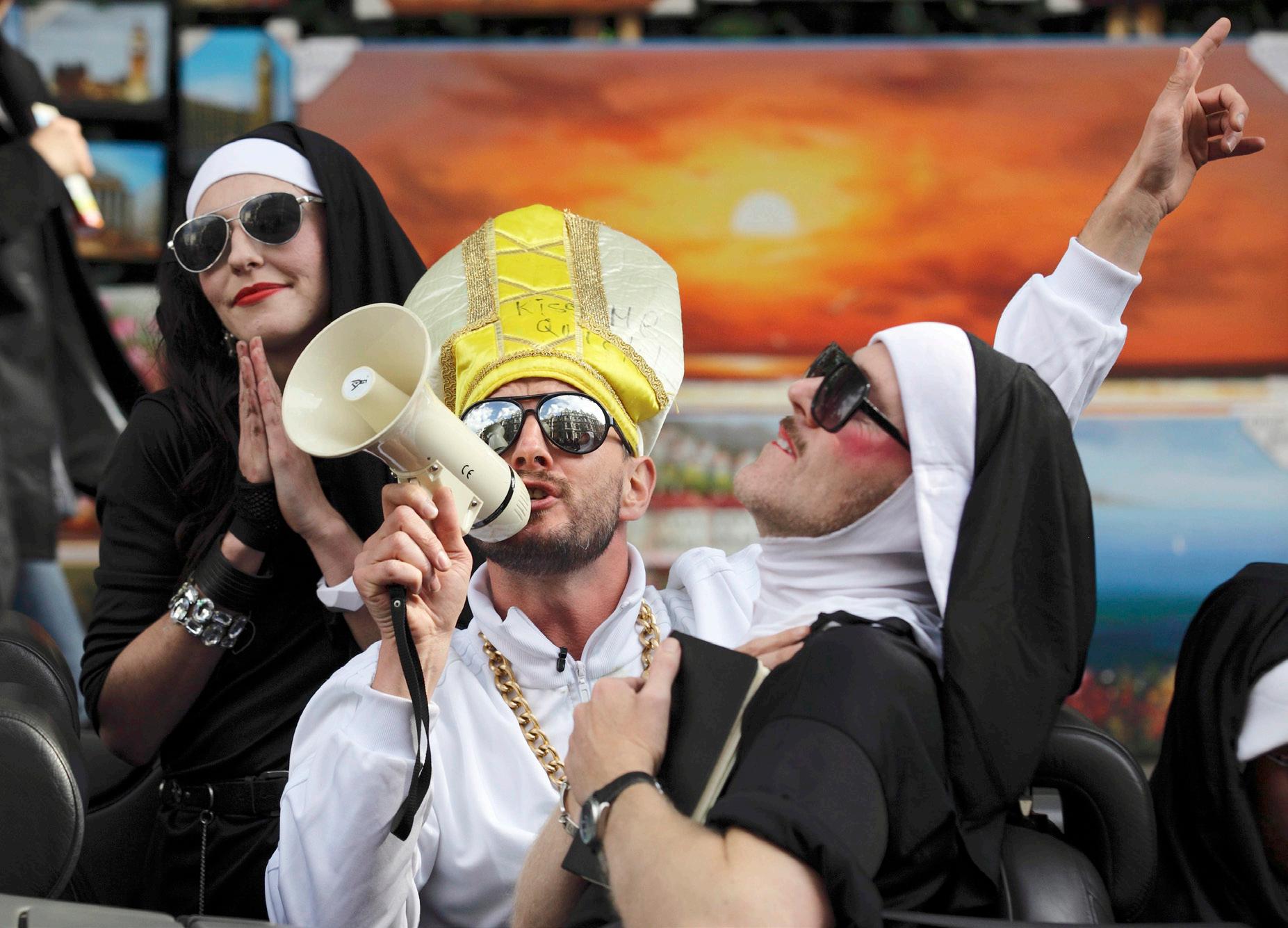
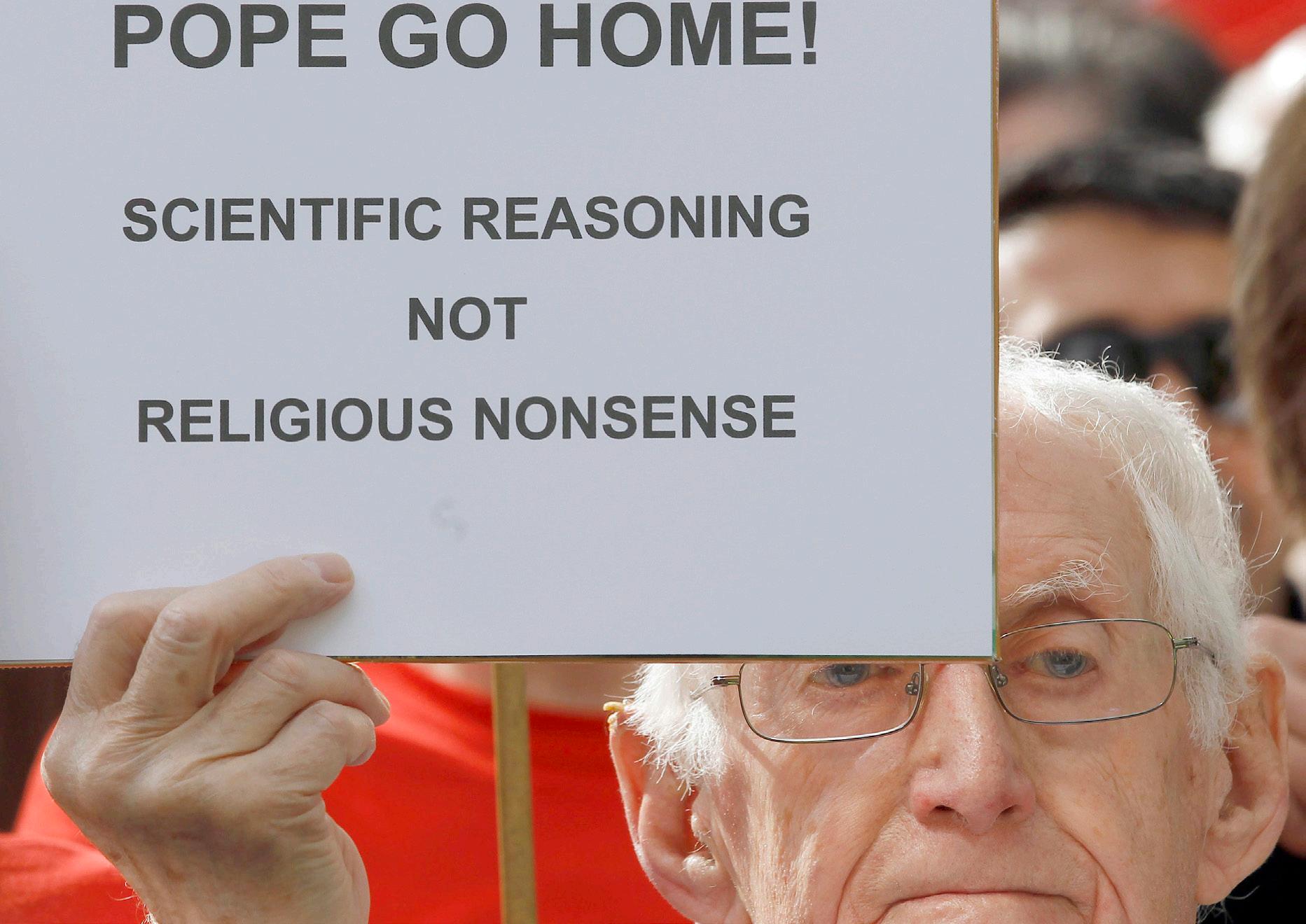
These atheist writers make little or no mention of the contributions made by religion to education,
health, civil planning, and to the development of such institutions as the university where Dawkins him-
Among the remarkable defenders of Pope Benedict and the Catholic Church during the Pontiff’s recent visit to Britain was Brendan O’Neill, editor of the Spiked website, a current affairs and analysis site run by Marxists. This excerpt from one of several comment pieces he wrote gives some of the flavour of what O’Neill thought of the protests.
“T
his was less a coherent protest against a real problem, and more a madcap attempt to transform the Pontiff into a political pin cushion, into which every group desperately seeking a sliver of purpose could then stick their particular pin. So some were protesting against paedophilia, others against AIDS; some were concerned about Holocaust denial, others about homophobia, and others still about the undermining of human rights. And apparently the Pope, taking over from money, is the root of all of these problems and of evil in general, being a wicked, Prada-wearing, Bush-meeting devil and all. Some even waved placards saying ‘STOP STONING’ and ‘Religion flies planes into buildings’, which, correct me if I’m wrong, are problems that are associated with the Islamic faith rather than the Catholic one. But who cares. Got a grievance? Pin it on the Pope.” WWW.SPIKED-ONLINE.COM/INDEX.PHP/SITE/ARTICLE/9598
slumber to realise that God was redundant in a world of instant coffee and microwave ovens.
The thesis was itself based on an atheistic and agnostic outlook, transferring faith to the mechanisms of social change and Progress (yes, with a capital P). As Eagleton makes clear, the new atheists place a great deal of faith in science.
But science alone cannot provide all of the answers to life and its meaning; it may tell us what a quark is, but it cannot tell us how it impacts upon our daily lives. Likewise, secularisation suffered from a misplaced trust in the powers of social science, and that social progress would benefit humanity more than would belief.
What Eagleton also brings back into focus is the importance of the Christian scriptures for modern social life. The Gospels, according to Eagleton, are revolutionary texts and a wake-up call to all of us living in the complex times of modernity and globalisation.
One might be tempted to think that Eagleton is in the same camp as the liberation theologians who drew similar conclusions from the Gospels as they did from Marx’s call to arms in The Communist Manifesto
Where Eagleton departs from such a reading is in his insistence that the Gospels are essentially about how we live each day, regardless of the social situation in which we find ourselves.
The Gospels call us to help our neighbour, thus they are a call to action, immediately and always. Eagleton shows us a view of the Gospels that are revolutionary, but in a different way than they were interpreted by the liberation theologians; not reducible to political texts, but a call to lead a better life, through the love of others, in the here and now.
This brings us to one of the essential points about the Gospels and religion generally that the new atheists completely miss: that faith is not about proving the existence of things, but is rather about what makes us truly human in the first place.
Dawkins, Hitchens and Onfray attempt to capture the mantle of reason for themselves, arguing that religion is irrational, a “delusion” in Dawkins’ words. In doing so, they sound increasingly unreasonable.
self is gainfully employed. Eagleton is right to pull these authors up on their unsophisticated analysis of what religion actually is, and he will have struck a chord with any informed religious person who has read the work of the new atheists and grimaced at their simplistic notions of religion, faith and churches.
Ironically, these writers have risen from obscurity only because of the contemporary resurgence of interest in religion.
As Eagleton points out, even Marxists and cultural theorists are again pondering issues of faith and ritual.
Predictions that religion would fade away before the forces of secularisation have proved to be hubristic.
The secularisation thesis proposed that advances in technology and industrialisation, along with the prevalence of rationality, would awaken humanity from its religious
Says Eagleton: “Hitchens fails to distinguish between reasonable beliefs and unreasonable ones. His belief that one should distrust anything that outrages reason is one example of a reasonable belief, while his belief that all belief is blind is an example of an unreasonable one” (p 125). Reason, it seems, has it limits.
Terry Eagleton shares an outlook with many new left intellectuals who continue to draw sustenance from the upheavals of the 1960s. Although his beliefs differ from Christians and people of faith more generally, he has provided something of a service to the “believing classes” who labour under the misrepresentation of their faith by the new atheists.
The new atheists have dug in, to use a military term, for a long and drawn out campaign, and it will be interesting to see whether they maintain their influence on public debate about religion.
By Dr Andrew Lynch, who teaches English and History at Redfield Secondary College, Sydney.

My response to the recent documentary of Ben Cousin’s journey into drug addiction was probably not a common one, because it led me to contemplating the hunting habits of the Spiny Spider of north-eastern Australia.
This species is unique in the otherwise dark, creepy-crawly world of arachnids as it glitters with bright colours, which it uses to attract and lure its prey. It is a mirror image of the world of drugs.
The majority of society, particularly the older generations, live at a safe distance from this insidious culture and cannot fathom what motivates young people to delve into such a blatantly destructive environment. After all, illicit drug use rarely gets good press. It is usually doom and gloom, often identified as the catalyst for personal, family and social collapse.
Yet, despite its overwhelmingly negative public image, the number of people indulging continues to rise. Why?
One of the recent criticisms of Ben Cousins’ documentary was that it glamorised the lifestyle associated with drug use. Some viewers believed that there was too much footage of the highs and the partylife that Cousins indulged in and were concerned that this perception would entice young people.
But what Cousins wanted to portray was the complete picture of this treacherous world.
I regularly interact with people addicted to drugs and they are all painfully aware of the risks associated with their choices - everything from death to rotten teeth – but these factors do not prevent them from entering into this dangerous lifestyle.
What Cousins’ documentary portrayed was a reality that is known to all users - and is usually ignored by those outside it - that it does indeed provide them with access to a world of self-absorbed euphoria. That is what reminded me of the Spiny Spider - because the path that leads to this living hell is paved with sparkle and glitter. The culture of illicit drug use is
the ultimate lie. This is what makes it so difficult to protect our children from it. They exist in a society that equates self-satisfaction with success and endorses everything from sex to food with an attitude of “if it feels good, do it”, yet we expect them to put aside these attitudes when it comes to drugs, despite the fact that increasing numbers perceive them to be the gateway to the ultimate feeling of immediate gratification?
The answer obviously isn’t found in increasing the amount of information we provide or even by flooding our children with the devastating long-term impact that drugs can inflict. These have been tried, yet the numbers continue to grow. The fact is, that the seductive nature of drugs appeals to the selfish instincts that characterise our human condition.
These instincts may serve a purpose when small children are exploring and finding their place in the world, but if we, as guardians, do not teach them ways to counter this egocentric drive by the time they are able to reason for themselves, then they will continue to be guided by them during their journey into adulthood.
Our Christian faith holds the key. Jesus’ demonstration of selfsacrifice is the very antithesis of the nature of addiction. A person is drawn into the world of drugs by their own desires, whether that be for personal pleasure or to escape a harsh reality, and then once entrapped by these counterfeit feelings they become prisoners to them.
Their entanglement in this web of deceit is in direct contrast to the selflessness of the cross as they become increasingly focused on their own existence. All of us in some way are enslaved by our desires, but the intensity of this entrapment is at its most extreme with those addicted to drugs.
That is why it is essential that, from an early age, we instil in our children, through prayer, discipline and example, sacrificial virtues such as self-denial, sharing and self-control. These need to become the cornerstones of a fortress that will one day protect them from the inevitable temptations of adolescence.
But, most importantly, we must nurture in them an understanding that the freedom provided by this fortress was born from an act of sacrificial love on a cross two thousand years ago.
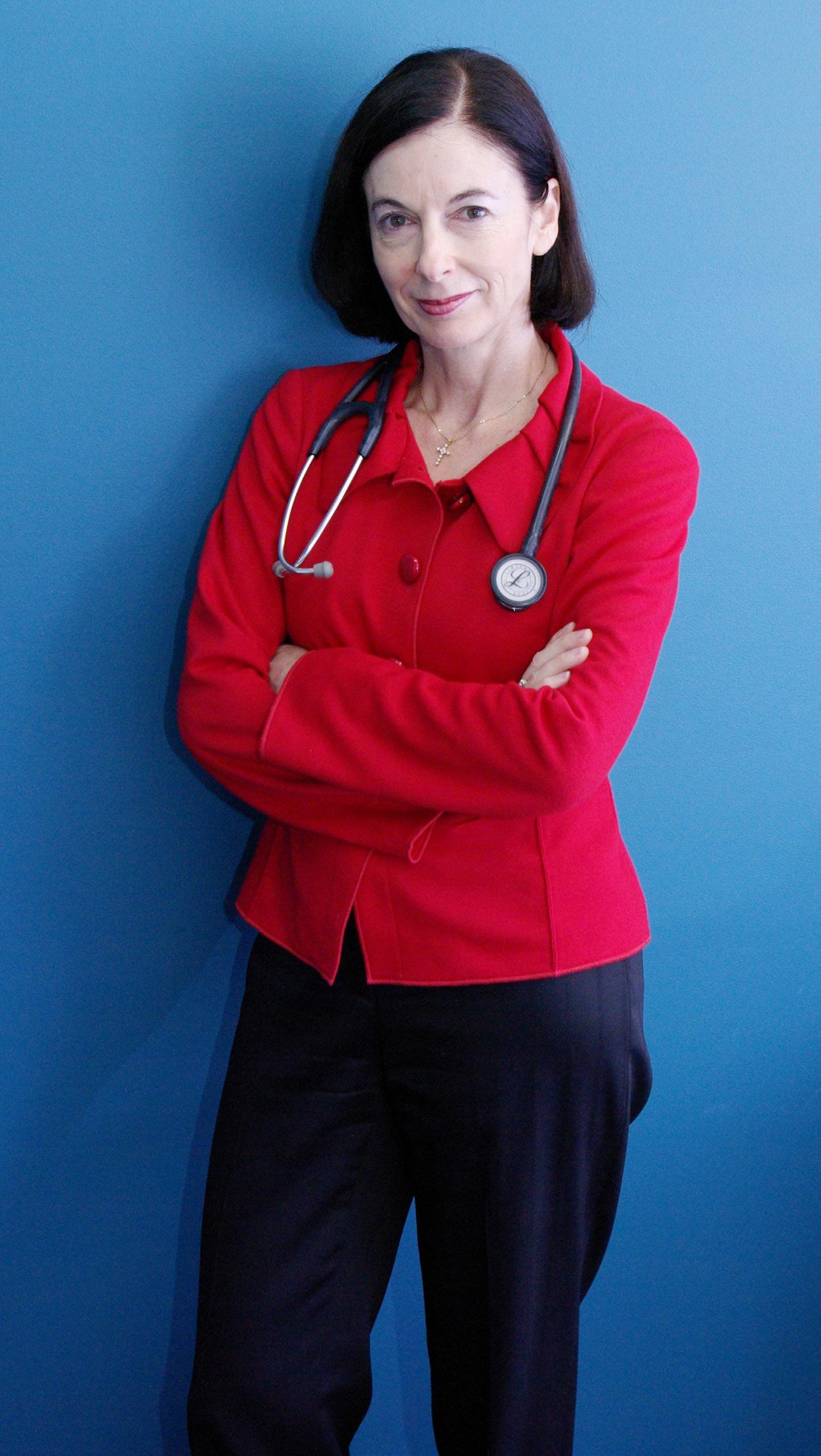
Continued from Page 1
Notre Dame Australia
Associate Professor Dr Rosanna
Capolingua reflects on the the conflicts doctors can face in everday situations, especially when confidentiality can place a barrier between parent and child ...
As a doctor, I am bound by the confidentiality of the doctor-patient relationship. When it comes to the care of a minor, it is always easy if they are accompanied by a parent or guardian who is part of the understanding, decision making and consent.
When I see young people under the age of 18, and in our society 16 years, then it is my duty to assess the maturity of the minor and respect privacy within the context of appropriate and safe care, the ability for the minor to understand and comprehend management, and provide informed consent.
Doctors have parameters by which we make assessment of maturity and attempt to discover the context of the young person’s home, education and social supports.
At times there are some things that need to be kept confidential from the parent in order to protect the child.
It can be a challenging situation. Whenever possible if you are looking after someone who is ill or at risk, no matter what age they are, then it is appropriate with the consent of the patient to bring in close support.
helps trainee
-ence-based credentialling, this app becomes vital in order to keep track of procedures performed,” he said.
“Before the application, I found myself often collecting patient stickers to keep records of cases I had been involved in for my surgical logbook or for follow up.”
During iDoctor’s development phase, Dr Clark asked interns, residents, registrars and consultants to test the application in their particular field. He adapted the application
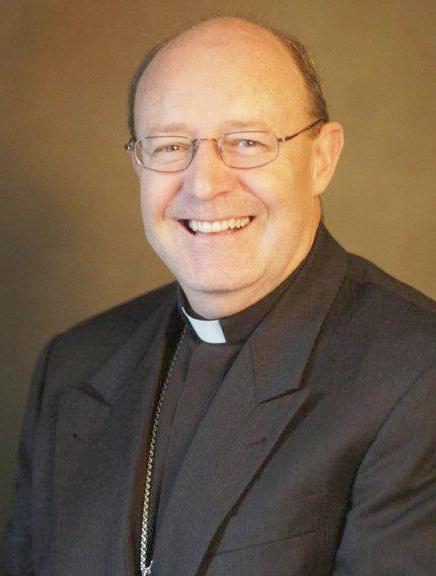
This can be by friends, relatives, loved ones, work colleagues or community and allied health providers.
There are times when the confidentiality of the doctor-patient relationship can be broken.
These are when the patient is at risk of harming someone, when the patient is at risk of abuse, and when the patient is at risk of self harm.
The doctor can advise the patient that they are going to break the confidence in order to protect the patient.
This all sounds very neat and ordered and fairly logical. But life practice can sometimes be confused by order and practicality.
Sometimes the more challenging situation is when you have a child who is a mature adult; beyond the definition of a minor and by assumption is an independent individual with a right to privacy.
As the caring doctor you feel that you need to negotiate a path which maintains the patient’s trust in the physician.
At the same time, there may be parents, a spouse or close friends who are desperate to help but are shut out by the confidentiality principle.
This is particularly pertinent in the situation where loving and respectful parents can see their adult child self destructing; see them disappearing before their eyes, transforming from the human that could be held and protected in their arms into a soul that is flailing about and breaking.
The influence of drugs often is culprit for the destruction, and drugs and mental health break down dovetail into one tortuous and agonising existence.
The parents of these souls are desperate to help, to embrace whatever is necessary to save their child from the clutches of the illness of drug addiction and abuse.
While there is still life in that
body that they used to hold then there is still the hope and ability to retrieve them.
An unexpected unbelievable barrier can be placed in the way. The confidentiality of the doctor patient relationship may block the important support and involvement of parents in assisting in the care of their child.
They can be refused entry into the care and management. They can be given silence when asking about their child. They can be shunned in their effort to be involved. It is a confusing place to be.
As a parent you innately know your child is at risk; you know your child will be trying to do it without you because they feel they are a burden or have failed, and it is painful to have parents with you.
And yet as a parent you know that if you get over that barrier there is a better chance of saving your child.
The doctor must be open to hearing and feeling all of this and broker the junction between patient and parent.
It requires knowledge of the relationship which can only be gained by knowing your patient and attempting to understand the dynamics between the parties.
It must be safe for the patient to be taken there. Sometimes the call must be made when the patient is at risk of harm, and the confidence must be broken to save a life.
Too many times in this age of ‘rights’ we aim to preserve the principle. Principles will always be there to be discussed and situations analysed, but a life once gone cannot be revisited or retrieved.
Associate Professor Rosanna Capolingua pictured at left, is a member of the UNDA Board of Governors, and a former President of the Australian Medical Association.
in response to advice provided by colleagues prior to its release on the iTunes store.
Dr Clark said he also received feedback regarding tracking hours worked as many doctors reported they were often too busy to record overtime and were not keeping track of the wages owed to them.
“I have also missed out on many dollars owed to me. Often we will work late or be asked to take extra shifts beyond our normal paid hours.
“In order to keep track of these hours, I
also developed a logbook for overtime within iDoctor,” he said.
Dr Clark said he would continue to develop iDoctor as new software and feedback became available.
Since iDoctor’s release in June, Dr Clark said he had been overwhelmed by positive feedback received from colleagues using the software.
“At first, I got a real buzz when I saw people using it on the wards or in medical meetings; however, this is now becoming common-
place,” he said. “Many doctors have told me how useful they find it and lots ask for it to be made more specific to their specialty which we are looking at doing. “I have plenty of other ideas but at this stage we are just focusing on rolling out this app and having doctors using it in their everyday working lives,” he said. Part proceeds from the sale of iDoctor will go to Australian Doctors for Africa, a charity providing volunteer doctors and nurses to areas of need in Africa.
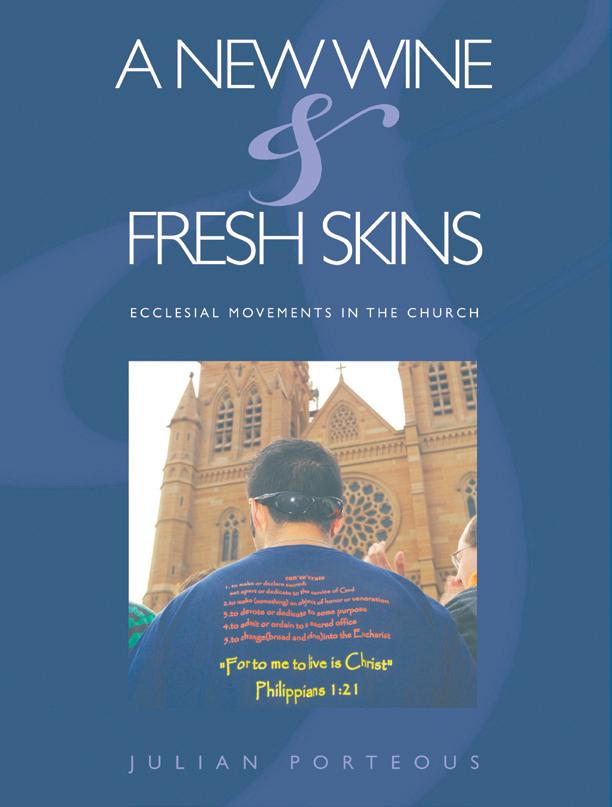
The World Turned Upside Down Published by Encounter Books
RRP: $42.95+p/h
Available from The Record bookshop
Anew book on religion, values and an increasingly secular world is turning a growing number of heads around the world - incuding heavyweights such as former CIA Director Richard Woolsey, who describes A World Turned Upside Down by Melanie Phillips as “a trenchant sequel to George Orwell’s Politics and the English Language.” Comparing anyone to Orwell is pretty high praise, especially when it comes form someone like Woolsey.
In what we tell ourselves is an age of reason, writes Phillips, we are behaving increasingly irrationally. More and more people are signing up to weird and wacky cults, para-psychology, seances, paganism and witchcraft. There is widespread belief in ludicrous conspiracy theories, such as the 9/11 terrorist attack being an American plot.
The basic cause of all this unreason is the erosion of the building blocks of western civilisation.
We tell ourselves that religion and reason are incompatible, but in fact the opposite is the case. It was Christianity and the Hebrew Bible that gave us our concepts of reason, progress and an orderly world - the foundations of science and modernity.
The loss of religious belief has meant the West has replaced reason and truth with ideology and prejudice, which it enforces in the manner of a secular inquisition. The result has been a kind of mass derangement as truth and lies, right and wrong, victim and aggressor are all turned upside down. In mediaeval-style witchhunts, scientists who are sceptical of global warming are hounded from their posts; Israel is ferociously demonised; and the United States is vilified over the war on terror - all on the basis of falsehoods and propaganda that are believed as truth.
Thus the West is losing both its rationality and its freedoms. It is succumbing to a “soft totalitarianism” which not only is creating an ugly mood of intolerance but is undermining its ability to defend itself against Islamic aggression.
While the Islamists are intent on returning the free world to the 7th century, the West no longer seems willing or able to defend the modernity and rationalism that it brought into being.
Internationally-known human rights lawyer and prominent atheist
Geoffrey Robertson
QC, who wanted Pope Benedict XVI arrested during his recent visit to the UK, has been stung by an Australian Bishop’s response to some of his claims in a recent article
By Anthony BArichBritish QC Geoffrey Robertson’s claim that the Church has merely admonished priests it knows “to be guilty of raping children” is false and malicious, Sydney Auxiliary Bishop Julian Porteous said. His comment came after Robertson challenged Bishop Porteous to point out any errors after the prelate stated in the Catholic Weekly on 16 September that the QC’s latest book The Case of The Pope: Vatican accountability for Human Rights Abuses “contains many false claims”.
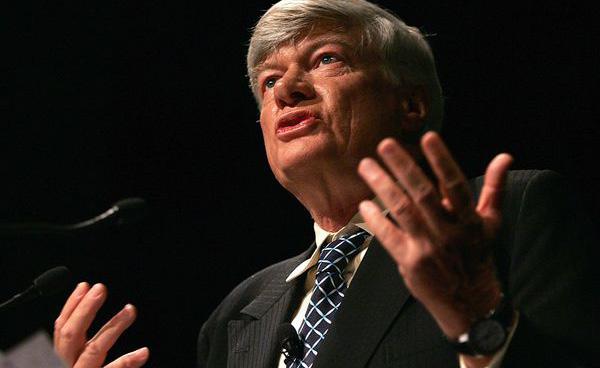
Bishop Porteous expanded on these claims in a column published on 22 September in The Record
In a 26 September statement issued to The Record after Robertson’s challenge, Bishop Porteous said the QC’s claim of “the Church” admonishing guilty priests and switching them between parishes is false.
Bishop Porteous quoted Austen McIvereigh’s 6 September article
The Case against Geoffrey Robertson in America Magazine “The Vatican does not deal with abusive priests, local dioceses or congregations do. Where these have failed to act against abusive priests, it has not been because they have resorted to canon law instead of civil law, but because they failed to resort to either canon or civil law”.
The prelate also refuted the internationally known QC’s assertion that canon law does not allow cross-examination or DNA and other testing.
“Church legal proceedings allow the judge to interrogate the parties in the case, including the accused priest, call expert witnesses,” he said.
“While there is a different approach to the trial (inquisitorial rather than adversarial), both systems of law allow for the testing of claims and evidence, and the introduction of scientific or any other evidence.”
Robertson said it was clear the Bishop had not read his book and accused the prelate of “negativity”, saying: “I wrote the book in the hope that my suggestions for canon law reform might help in the present crisis.”
“I would be obliged if (Bishop Porteous) would point the (errors) out: if I have made any error of fact, I will ensure it is corrected,” he said. “The only example he
gives is not a mistake, but rather a conclusion that I have drawn from the evidence, namely that the imposition of ‘pontifical secrecy’ at the beginning of the canon law process and forever after (Crimen Sollicitationis paragraphs 11 and 23) effectively precludes the reporting of offenders by the Church to the police, because to do so would make the reporter liable to excommunication.”
Robertson said his conclusion is the same as that drawn by the recent judicial commission in Ireland, which found that these canonical secrecy provisions “undoubtedly constitute an inhibition on the reporting of child sex abuse to the civil authorities or others”.
He also charged that Bishop Porteous had erred in suggesting that, in April, the Congregation of the Doctrine of the Faith “affirmed the importance of crimes being reported to the police”.
“In my book – which he evidently has not read – I explain that this appeared in a Vatican website guide for laypersons in April but was implicitly disavowed when the Pope promulgated his ‘New Norms’ – de gravioribus delictis – in July, which omitted any mention of reporting offenders to the police. (Jesuit) Fr (Federico) Lombardi, the Pope’s spokesman, admitted that inclusion of such a duty had been considered, but rejected,” Robertson said.
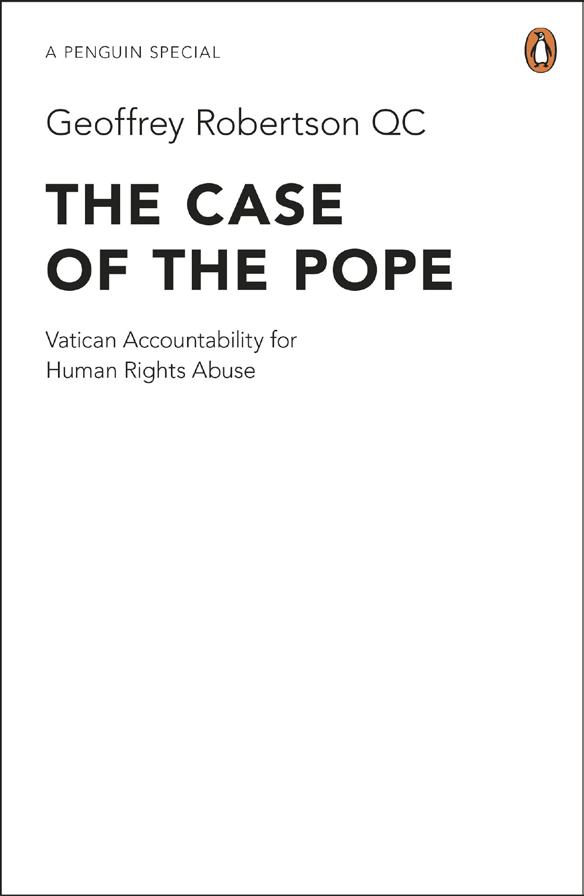
However, Bishop Porteous pointed out that while Robertson’s claim that the 2010 version of the protocols omitted reference to reporting offenders is correct, “his assumptions about the reasons are not correct”.
“This is a protocol for the universal Church and different countries have their own laws of reporting,” the prelate said. “In Australia, there are different reporting requirements in various States.”
Bishop Porteous also rejected Robertson’s claim that the Church claims immunity from civil or criminal action.
As Austen Ivereigh had already pointed out, he said, as part of its sovereignty, the Vatican claims the right, in all States where its Church operates, to deal with its priests and other Religious under canon law. But canon law is not contingent on recognition of its sovereignty.
“Church law does not replace or override civil law; it is a parallel, complementary jurisdiction, not an alternative.”
Bishop Porteous’ article in The Record, which was also quoted in The Catholic Weekly, was responding to an article of Roberston’s published in The New Statesman on 8 September.
Christians’ cowardice prevents cultural renewal, Archbishop Chaput tells Catholic scholars
BALTIMORE, Maryland (CNA/ EWTN News) - Christians’ lack of faith and cowardice are the primary obstacles to Christian culture at a time when unbelief is the spirit-destroying “state religion” of the modern world, Archbishop Charles Chaput has told a gathering of academics.
Addressing the annual convention of the Fellowship of Catholic Scholars, which awarded him the organisation’s Cardinal O’Boyle Award in Baltimore on 26 September, he urged personal repentance and witness as the path to cultural renewal.
He told the scholars that their task is to strengthen their zeal in advancing the Gospel, their courage in struggling against sin, and their “candour in naming good and evil.” He advised them to use their God-given skills to strengthen this spirit in each other, their students and their colleagues.
“If you do only that, but do it well, then God will do the rest,” Archbishop Chaput declared.
Comparing American Catholics to the ancient Israelites who “forgot their faith because they weren’t taught,” he said that if Catholics no longer know their faith or their obligations, “we leaders, parents and teachers have no one to blame but ourselves.”
His general remarks focused upon the “construction” of Christian culture and the state of American society.
Noting the 70th anniversary of theologian Fr John Courtney Murray’s college talks on Christian culture, the Archbishop cited Murray’s belief that there is a “profound religious truth” at the base of democracy: the “intrinsic dignity” of human nature and the “spiritual freedom” of the human soul.
Fr Murray, a Jesuit whose thought was influential at the Second Vatican Council, said the task of constructing a culture is “essentially spiritual” and all man’s cultural effort is at root an effort to submit to “the truth and the beauty and the good that is outside him” in order to conform his soul to an “ordered harmony.”
While these thoughts are true and beautiful, Archbishop Chaput continued, “they bear little likeness to our real culture in 2010.”
Briefly summarising “what’s gone strange with America,” the Archbishop said that listing and complaining about problems achieves little.
“And, more importantly, as Murray would say, it isn’t a Christian response,” he continued, suggesting that the missionary obligations of Christians include renewing their country’s ideals.
The Archbishop noted the influences of the United States’ Protestant and Enlightenment roots. Catholics were largely absent from the American founding and have “always been strangers in a strange land.”
He also recalled the influence of the Roman Empire on early

American colonists, saying that despite Rome’s flaws the Roman virtues of piety, austerity, courage, justice and self-mastery were “revered” by the American Founders.
“As with Rome, the fruits of American power now surround us. But success has always its cost in personal and national illusions. As a people, we seem to become more foreign to our origins every year.”
A healthy civic life depends on “permanent virtues” rooted in God and not self-developed “values,” he continued.
Citing St Augustine, CS Lewis and the political philosophers Leszek Kolakowski and JL Talmon, Archbishop Chaput warned that the self-evident truths spoken of in the Declaration of Independence are “not at all self-evident to the modern intellectual world.” Democracy too can become totalitarian.
“Unbelief – whether deliberate and ideological, or lazy and pragmatic – is the state religion of the modern world,” he commented.
“The fruit of that orthodoxy is a compression and destruction of the human spirit, and a society without higher purpose. This is the logic of the choices that America is already making. But they can be unmade. And they can be redeemed.”
For Fr Murray, he told the scholars, “there is no real ‘humanism’ without the cross of Jesus Christ. And dismantling the inhuman parody we call ‘modern American culture’ begins not with violence but with the conversion of our own hearts.”
“The central problem in constructing a Christian culture is our lack of faith and the cowardice it produces,” the Archbishop stated. “We need to admit this. And then we need to submit ourselves to a path of repentance and change, and unselfish witness to others.”
He recounted his reaction to the Manhattan Declaration, a manifesto by leading Protestant and Catholic thinkers about pro-life issues, marriage and religious freedom.
He took the document as a caution that a certain kind of America he and many others knew “no longer exists.”
Nonetheless, he urged the Fellowship of Catholic Scholars to look to Christ to renew themselves and their country:
“Sunday is the day we celebrate the Risen Christ, the real source of our freedom and joy. Christian faith in the Risen Jesus converted an empire. It changed the course of history and gave meaning to entire civilisation. And in the Risen Christ, I believe God is now calling us, starting with those of us here today, to do the same.”
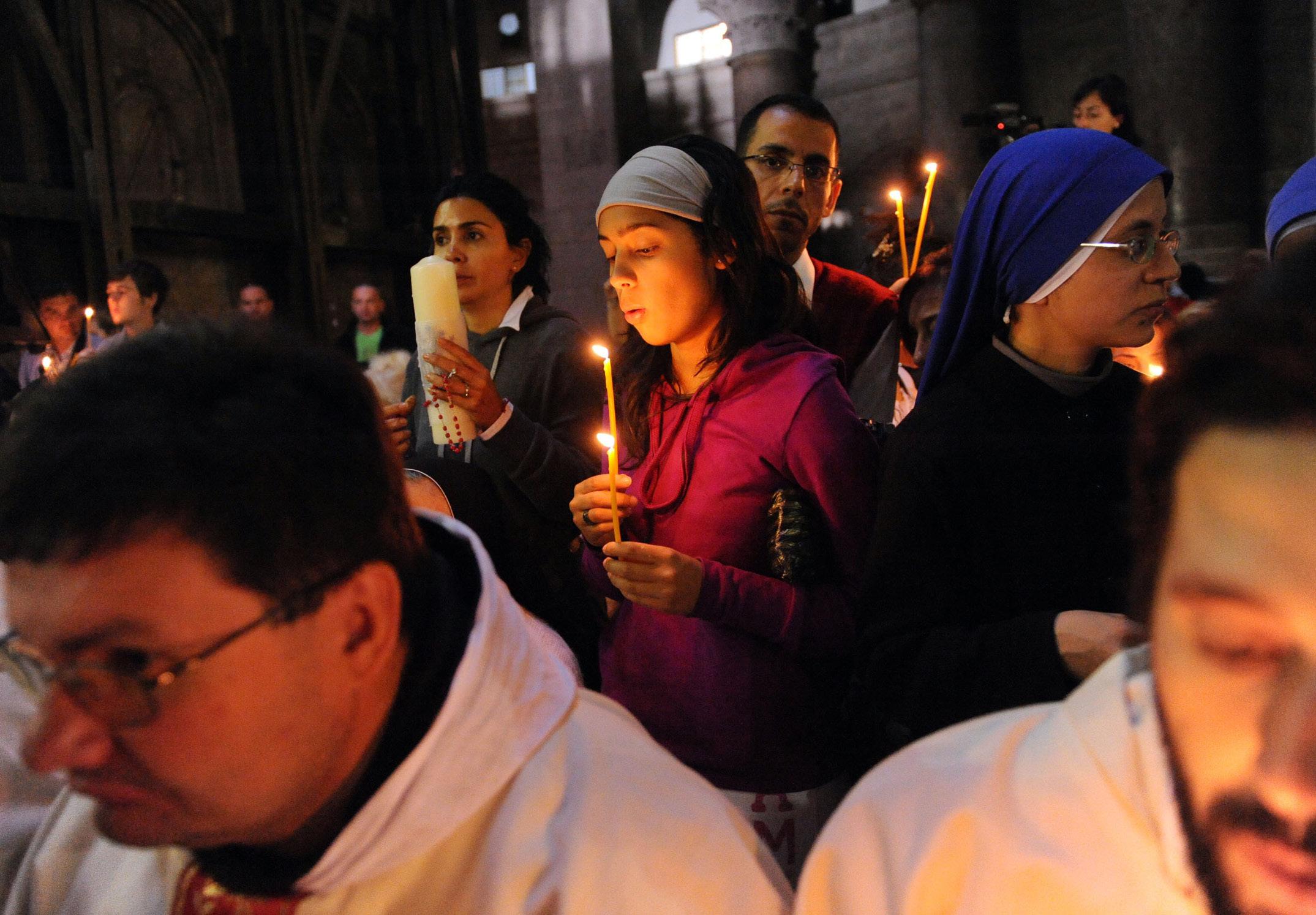
BEIRUT - Catholic Church leaders, anticipating the Synod of Bishops for the Middle East, view it as an opportunity to call attention to the problems facing Christians in the region.
The Synod, to be held at the Vatican from 10-24 October, will focus on “communion and witness.”
Chaldean Archbishop Louis Sako of Kirkuk, Iraq, who had asked the Pope in January 2008 to convene such a Synod, said the meeting “is an opportunity to revise the whole situation for Christians in the Middle East.”
He said it is a pastoral and practical Synod, and not a dogmatic one.
Archbishop Sako stressed that because there are so many crucial issues to tackle - liturgical reform; formation of clergy and other Religious; dialogue among the Churches; and particularly the political status of Christians - he hopes this Synod will be highly productive.
Chaldean Auxiliary Bishop Shlemon Warduni of Baghdad said the Synod represents “a big grace for the Middle East.”
“We need it because our faithful are leaving their countries,” he told CNS.
“If we have peace and security, our people would not leave.”
The Middle East has many Catholic rites, and there is some division among them, Bishop Warduni said, “but like the first Christians, we must have one spirit and one heart, as when the Holy Spirit descended upon them.”
For those participating in the Synod, he said, the Holy Spirit “will guide us to do what we must do for ecumenism and dialogue with other religions.”
“We ask the Lord to give us the wisdom to guide each of us, so we can arrive at some solutions that
will be good for the glory of the Lord, the good of the Church and the good of the faithful,” Bishop Warduni said.
In Israel, Melkite Catholic Archbishop Elias Chacour of Haifa said local Church leaders would like the Synod to articulate why Christians should remain in the Middle East.
He said he hopes the Synod will “define the reason why we need to stay in this country, which is not very favourable to our presence. What reason is there for our presence here as Christians? To propagate and introduce the value of reconciliation, which is not on the political agenda in this country?”
“We expect better understanding of our mission in this country, our role in the Catholic Church and more attention to our human presence than to that of the presence of the holy shrines,” he said.
“We are hoping for very simple things. We don’t want miracles,” he added.
Though Catholics’ role in the Holy Land is recognised by the Holy See, Archbishop Chacour said they would like to see more consciousness of what they should do as a Christian minority within two large majorities, “facing the challenge of meeting every day thousands of pilgrims who come not only to walk on the dirt and see artefacts but also to see what remains of Jesus Christ, the ‘living stones.’”
Archbishop Chacour said he would like to see the Holy See “encourage the local Christians here so they can really be aware of their role. We need the Catholic communion to become more real,” he said.
Mgr Raphael Minassian, who administers the Armenian Catholic Exarchate of Jerusalem and Amman, Jordan, said Catholics “have many hopes for the Synod: hope to strengthen the communion between the Churches; to give knowledge to the (Western) Churches about the existence of the (Eastern) Churches; to define how the destiny of our land will be practised; how to define our presence under the current conditions.”
Mgr Minassian identified the
emigration of Christians from the region as a “major problem” and said the Synod should work to “find a way to approach this problem and to solve it.”
Syrian Catholic Patriarch Ignace Joseph III Younan of Antioch, who is co-president of the Synod with Cardinal Leonardo Sandri, prefect of the Congregation for Eastern Churches, sees the Synod as an opportunity for the world to look more carefully at the plight of Christians in the Middle East.
“I think we all, religious leaders of the Churches in the Middle East, hope that something will come out of this Synod, particularly that the Western world will understand the region - its culture, its history - and urge people, governments and nations in the Middle East region to not only generally live together, but to abide by the laws of respecting civil liberties for all,” the patriarch told CNS.
“I think until now we spoke very little of this need,” he said.
“Unfortunately, the countries of the West, especially the governments, have been linked to mostly compromise and silence regarding the civil rights of all citizens (in this region), because they think that in urging those governments to respect the human dignity and the laws for all means that they would insult Islam and, therefore, they prefer to keep silent.
“For us (Christians), it’s a matter of survival,” the patriarch said. “We can’t just close our eyes and say we happen to be here and we have to continue. We have to ... try to convince the whole world, especially the developed world, that we can’t accept just to endure or take our destiny so negatively, as in saying ‘It’s the will of God, and that’s it.’ We have to fight for our human rights.”
Melkite Bishop Elie Haddad of Sidon, Lebanon, said the Synod “can send a message to the world to save the countries in this region.”
Noting that a Synod, by its very nature, orients the faithful toward the Gospel, Bishop Haddad said, “It is the Church that can lead us again to the safe side.”
Chinese Academy of Social Sciences calls for a rethink of religious policy towards Catholics
Beijing (AsiaNews/Églises d’Asie) – A researcher at the Chinese Academy of Social Sciences (CASS) said the Chinese government should review its religious policy towards Catholics.
In the study, she criticises the current role played by the Chinese Patriotic Catholic Association (CPCA) and the Bishops’ Council. She also raises doubts about the National Assembly of Catholic Representatives, the governing body of the official Catholic Church in China.
In the CASS annual report on religions in China that was released in mid-September, Wang Meixiu, a member of the Institute of World Religions, a research unit at CASS, noted that Chinese Catholics have increased their ties with the universal Church.
A keen observer of Catholic affairs in China, she said that
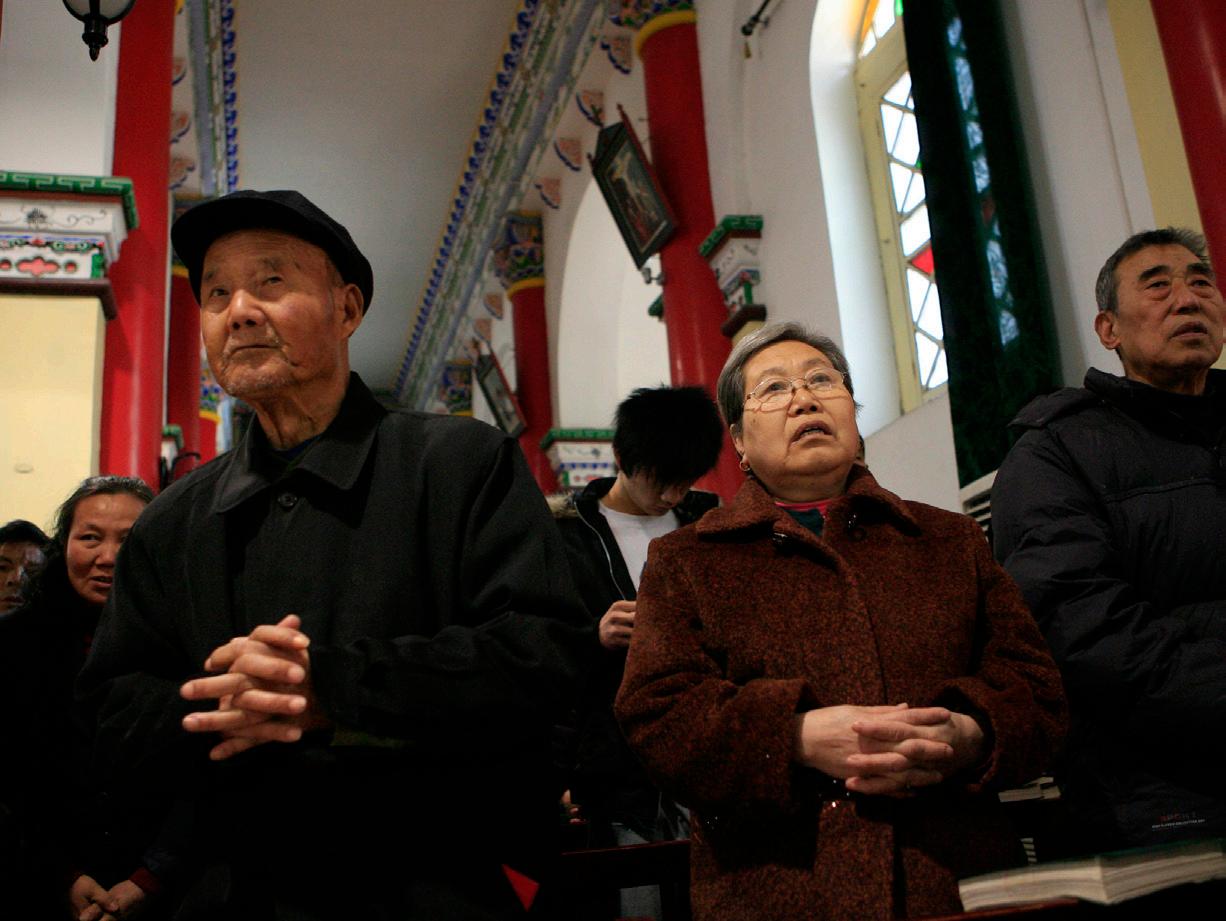
China constitutes a unique case because of the existence of the National Assembly of Catholic Representatives, whose “democratic” choices are imposed on official Bishops, and the CPCA which
Pope says entire West needs to see role of faith in public lifeBy Cindy Wooden Catholic News Service
VATICAN CITY - Pope Benedict XVI said his message in Great Britain about the enduring importance of faith-based values in public life is valid for the entire Western world.
The Pope said one of his key messages was “the importance of evangelising culture, especially in our age when pervasive relativism risks overshadowing the unchanging truth about the nature of man” and about the importance of faith in the education of active, creative and responsible citizens.
During his weekly general audience in St Peter’s Square on 22 September, the Pope reviewed the trip he made to Scotland and England from 16 to 19 September.
“In the four beautiful, intense days I was able to spend in that noble land, I had the great joy of speaking to the hearts of the inhabitants of the United Kingdom and they spoke to mine, especially with their presence and the witness of their faith,” he said.
Despite repeated descriptions of Great Britain as one of the most secular countries in Europe, the Pope said, “I was able to see how much the Christian tradition is still strong and still active in every strata of social life. The hearts and existence of the British are open to the reality of God and there are numerous signs of their religiosity, which my visit helped make more evident.”
The Pope said his first priority in visiting Great Britain was to encourage the nation’s Catholics “to defend the unchanging moral truths - contained in, enlightened and confirmed by the Gospelwhich are at the basis of a society that is truly human, just and free.” Speaking in Great Britain, a
“crossroads of the world’s culture and economy,” he said he also was speaking to the “entire Western world.” “This apostolic visit confirmed in me a profound conviction that the ancient nations of Europe have a Christian soul, which is part and parcel of the genius and culture of its peoples, and the Church does not cease working to keep this spiritual and cultural tradition alive,” he said.
The Pope described his 18 September meeting with victims of clerical sex abuse as “an intense moment of emotion and prayer” and he said that his later meeting with child protection officers for dioceses and parishes underlined the importance of their work in the Church, which always has dedicated special attention to caring for and educating children. Pope Benedict said the key moment of his trip was the beatification on 19 September of Cardinal John Henry Newman, the 19th century theologian and intellectual. The Pope said Blessed Newman’s teaching on the importance of following one’s conscience was not meant to encourage people to focus on themselves and their feelings, but to open themselves to the truth of the Gospel and moral law.
At the end of his audience, Pope Benedict asked Catholics to pray for the success of the international Roman Catholic-Orthodox theological dialogue commission, which was meeting from 20-27 September in Vienna. The commission members were continuing a study of the role of the Pope, especially during the first millennium when Christians were still united.
“Obedience to the will of the Lord Jesus, as well as the great challenges facing Christianity today, require us to make a serious commitment to the cause of re-establishing full communion between the Churches,” the Pope said.
The text of the Pope’s audience remarks in English will be posted online at www.vatican.va/ holy_father/benedict_xvi.
gests that the two organisations ought to specialise according to tasks. The Bishops’ Council should be left to run the Church, whilst the CPCA should act as a “bridge” between Church and State.
Currently, the CPCA, whose secretaries are often atheist, runs every aspect of Church life from vocations and Episcopal appointments to financial matters. For Ms Wang, clearly defining the responsibilities of each organisation should improve the government’s religious policy.
As for the National Assembly of Catholic Representatives, she notes that it has failed to meet since 2004 even though it is viewed as the governing body of the official Catholic Church.
earthquake and the Olympic Games in 2008, the 60th Anniversary of the People’s Republic in 2009 and the Shanghai Expo this year. Still, as Wang Meixiu points out, the government is bound to convene the assembly after Expo in late October to avoid “criticism” which is coming from various directions.
With the CPCA pushing for the election of unlawful Bishop Ma Yingli), official Bishops recognised by the Vatican would face a major dilemma over whether to participate or not.
supervises the Bishops’ Council, roughly the equivalent of a national Bishops’ conference elsewhere in the world, but without Holy See recognition. In the report, Wang Meixiu sug-
The next meeting should elect the new presidents of the CPCA and the Bishops’ Council, both of which are vacant. Patriotic Bishop Michael Fu Tieshan, elected CPCA president tin 1998, died in 2007. Mgr Joseph Liu Yuanren, patriotic Bishop of Nanking and president of the Bishops’ Council, passed away in 2005. For one reason or another, the meeting to elect their replacements has been postponed, because of an
In March, the Vatican Commission for the Church in China issued a statement in which it called on Bishops accepted by the Pope to avoid “actions (like sacramental ceremonies, Episcopal ordinations and meetings) that contradict the communion with the Holy Father.”
Above all stands Benedict XVI’s Letter to Chinese Catholics, which said that the National Assembly of Catholic Representatives and the charter of the CPCA are irreconcilable with Catholic doctrine.
The annual report on religions, issued by CASS, provides only suggestions to the government, which is free to heed them or not.
CASTEL GANDOLFO, ItalyBlessed Chiara Badano, an Italian who died of bone cancer just before her 19th birthday, witnessed to the world the fact that God’s love is stronger than suffering and death, Pope Benedict XVI said.
“Only Love with a capital L gives true happiness,” and that’s what Blessed Badano showed her family, her friends and her fellow members of the Focolare Movement, the Pope said on 26 September during his midday Angelus address.
At Rome’s Shrine of Divine Love on 25 September, Archbishop Angelo Amato, prefect of the Congregation for Saints’ Causes, presided over the beatification of the young Italian who died in 1990.
Pope Benedict said that young people can find in Blessed Badano “an example of Christian consistency,” because she was certain of God’s love and trusted in that love even as she was dying.
“We give praise to God because His love is stronger than evil and death; and we give thanks to the Virgin Mary who leads young people, even in the midst of difficulty and suffering, to fall in love with Jesus and discover the beauty of life,” the Pope said.
At the beatification Mass, Archbishop Amato called Blessed Badano a missionary of Jesus, “who invites us to rediscover the freshness and enthusiasm of the faith.”
Even as she lost the use of her legs and was dying, she shared her faith and God’s love with the dozens of people who would visit her each day, he said.
“Her last gift was her corneas, the only organs that were still
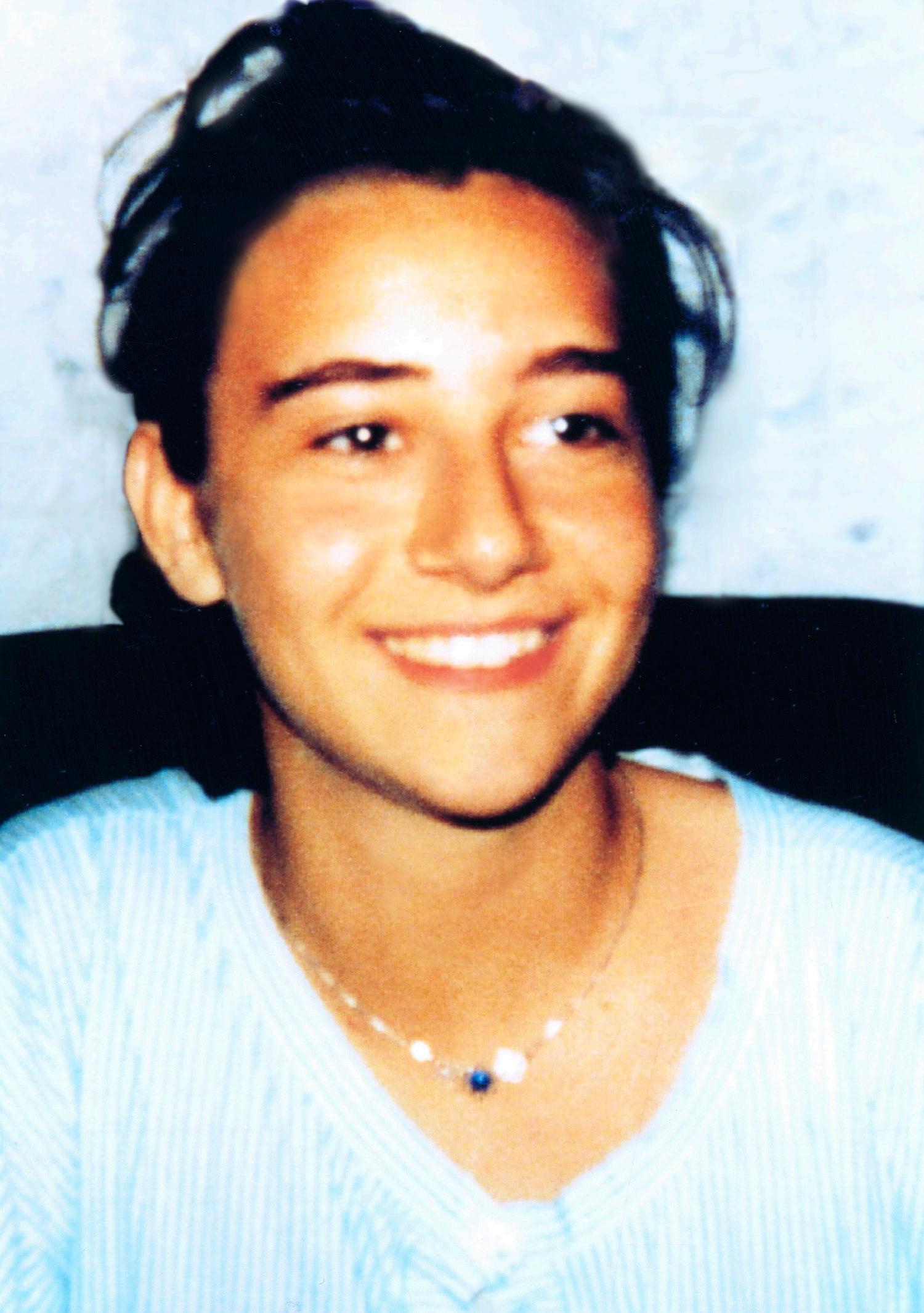
This is the official picture used for the beatification cause of Chiara Badano, an Italian who died of bone cancer just before her 19th birthday. She was beatified on 25 September at the Sanctuary of Our Lady of Divine Love outside Rome. PHOTO: CNS/COURT ESY OF BEATIFICATION CAUSE OF CHIARA BADANO
transplantable” because they were not damaged by the cancer that had spread throughout her body, the Archbishop said. “They were given to two young people who can see today thanks to her.”
Blessed Badano’s parents, Teresa and Ruggero, attended the beatification Mass. Her mother told Vatican Radio that Chiara’s religiosity grew gradually and normally.
When Chiara got sick, she said, “She taught us how to do God’s will, like she did, because you don’t just say ‘yes’ when everything is going well.”
After the beatification, about 8,000 young members of the Focolare Movement gathered in the Vatican audience hall for a night time celebration of Blessed Badano’s life with readings and singing.
GREEN BAY, Wisconsin - The role priests play in counselling people touched by abortion is critical, yet they often do not know what to say or do, Green Bay Bishop David Ricken said at a workshop for priests to help them learn about post-abortion healing.
He recalled an event that put the abortion topic in a new and disquieting light.
At a recent diocesan youth retreat, a 15 year old girl was found crying before a crucifix. “One of the youth ministers went up to her and said, ‘Can I help you?’ and what came out was that this 15 year old girl has already had three abortions,” said Bishop Ricken.
“So brothers, this is getting to be a very serious societal problem among Catholics,” he said. “I would say we are (needed) now more than we’ve ever been as far as our catechesis, our pastoral preaching and reaching out because there are so many broken families.”
He made the comments in an opening talk at the recent inservice session sponsored by the diocesan Respect Life Office. The event, which drew some 65 priests, focused on the ministry of Project Rachel, a post-abortion ministry founded in Milwaukee in 1984.
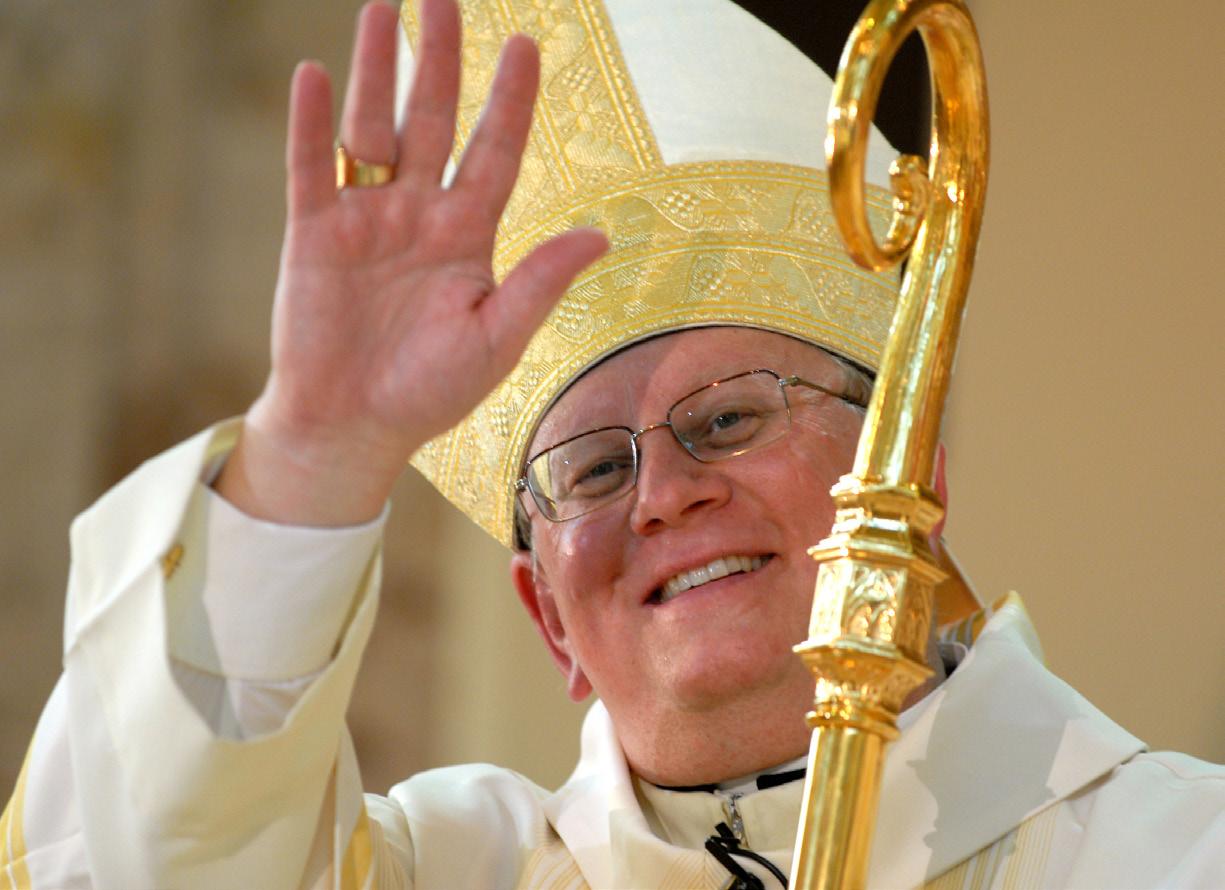
Vicki Thorn, founder of Project Rachel and executive director of the National Office of PostAbortion Reconciliation and Healing, was on hand to help the priests recognise some of the signs that accompany post-abortion trauma and discuss how to help grieving people.
“I don’t know about you, but when I’ve heard confessions and it involves abortion,” Bishop Ricken told the priests, “sometimes I feel helpless, not knowing what to do, what to say,” he said.
Thorn told the priests that “from the beginning, priests were at the core of this ministry. What you do, what you say, your presence is so
important to the walking wounded that you encounter - and they are everywhere.” She said that while some 50 million abortions take place each year in the United States, it is difficult to know exactly how many people have been touched by them.
“Why do I say we don’t know?
Because abortion didn’t start with Roe v Wade,” Thorn said about the 1973 US Supreme Court decision that legalised abortion virtually on demand.
“It’s been forever a human problem. So we need to know there are old women in our congregations and in our nursing homes who have had abortions.”
‘Too many Catholics don’t get that Christ and Church are one’By mike NeLSoN Catholic News Service
LOS ANGELES - Jesus and the Catholic Church are one, “a package deal”, that a disturbingly increasing number of people seem to ignore even as they profess to be religious, Archbishop Timothy Dolan of New York told a crowd of more than 1,500 people on 21 September at the sixth annual Los Angeles Catholic Prayer Breakfast.
“Our number one pastoral problem today is that too many people don’t see the intrinsic connection between Jesus Christ and the Catholic Church,” he said to those gathered on the Cathedral of Our Lady of the Angels’ plaza in downtown Los Angeles.
Archbishop Dolan cited the conversion story of St Paul to illustrate the connection, noting that “Jesus did not ask, ‘Saul, why do you persecute my people?’ or ‘Why do you persecute my Church?’ Jesus asked, ‘Why do you persecute me?’”
He invited his audience to consider those words carefully as he noted that, once converted, Saul/ Paul “seeks out the Church, the united followers of Jesus. He sought out the Church in order to find Jesus, so that he could be united in the disciples’ work of evangelisation.” Yet, he said, that connection seems to be lost on many of today’s people, including many lapsed, inactive and fallenaway Catholics - some of whom have renounced and rejected the Catholic faith.
“We are living in an era where people believe in Christ, but not in His Church,” said Archbishop
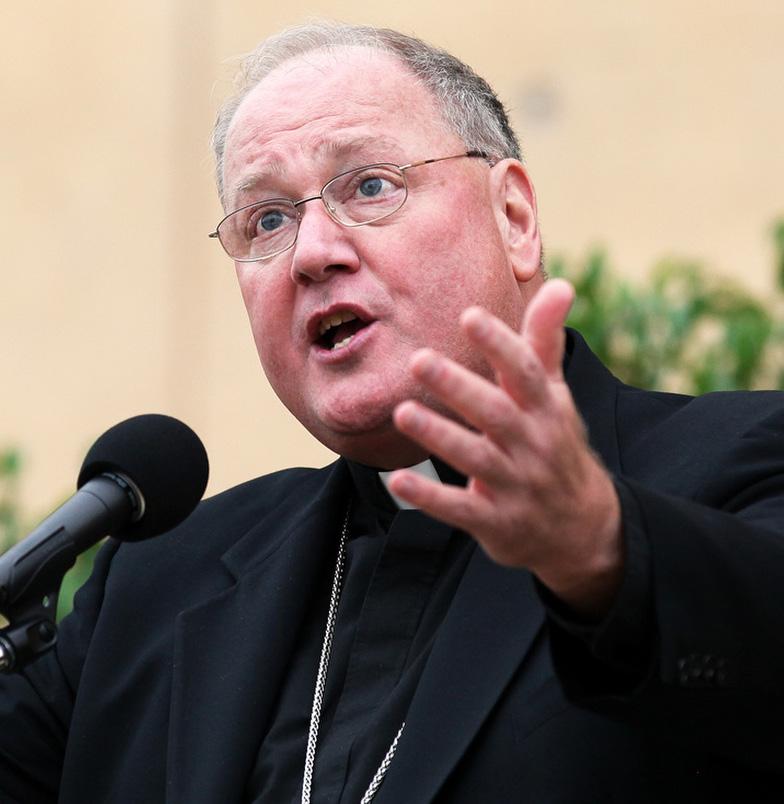 Archbishop Timothy Dolan
Archbishop Timothy Dolan
Dolan. “They want the king, but not the kingdom; they want to believe without belonging; they want the faith, but not the faithful. But for the committed Catholic, the answer to that is, ‘no can do.’ Jesus and the Church are one.”
Not that all is negative, the Archbishop said, noting that last year more than 3,000 people in the Archdiocese of New York entered the Church. “And, thanks to immigration, the Church still grows, and the vast majority of Catholics are faithful,” he said. “But for committed Catholics, the great challenge for us today is addressing those who believe, ‘We can have Christ without His Church.”
What can be done to address this issue? Archbishop Dolan offered three suggestions:
l Begin to concentrate on a new model of the Church: “the Church as our spiritual family.” Just as in any family, where there are disagreements and people get mad and angry, “so, too, do we get mad and angry at our Church. And
Thorn then offered the priests practical advice.
“If you get a call from the nursing home or the hospital that Mrs So-and-So should have died yesterday but she’s so agitated, get your stole and get to the hospital and say to her there’s nothing that God can’t forgive. And then name a couple of the favourite sins of your parish and put abortion in there. You’ll see her eyes fill with tears,” she said. Older women did not have counselling or support after abortions, Thorn continued. “They went to confession many times, but in death there’s a series of questions they need answered and you can be the person” to answer them.
Thorn reminded the priests that abortion touches everyone and she shared personal experiences of friends and relatives who had abortions.
She talked extensively about the impact of abortion on women’s health, including an increased risk of being diagnosed with cancer.
“We live in a society that says (having an abortion is) just like an appendectomy or having your tonsils out,” she said. “No, it’s not, because you’re forever carrying this biological memory in your body. Furthermore, you started a pregnancy and you didn’t finish it. That has implications.
“Our first pregnancy as women is very important to changes in our body,” she said. “It’s critical. So there are lots of things that happen here in terms of this abortion loss.”
Thorn also cited research by a cancer specialist in Seattle who
discovered that girls under 18 who have abortions, and who have a history of breast cancer in their immediate families, increased their risk of breast cancer by 100 per cent.
Thorn told the priests that she understood the challenges they face talking about abortion.
“I know that when it comes to pro-life stuff, you can’t do anything right,” she said. “Because whatever you say, someone’s going to be unhappy with you. It’s either too much or not enough.”
She called abortion a “heart debate (because) people are so impassioned” about the issue.
Thorn told the priests that when an angry parishioner confronts them at church, “don’t argue with them because nobody’s ever been argued into the pro-life movement. Simply say to them, ‘Why don’t you share with me why you feel so strongly about this. I’d like to understand.’
“Shut up and just let them talk,” she continued. “When they are done, thank them. If you can, lay your hand on their arm. Gentlemen, 20 seconds of touch is powerful healing in people. It sets off that chemistry of connection.”
By following these steps, she told the priests, “You broke a stereotype because they were convinced you were going to yell at them and argue with them. You listened to them; you heard them, which is different than just listening. Now all of that toxicity that was sitting in their gut is gone. And pretty soon you might find them in your office.”
yet, like our family, we still love our Church, because it is our home, and the older we get the more we appreciate it.”
l Rediscover apologetics - “not the combative, in-your-face clashes” that many associate with apologetics, but the ability to “credibly, convincingly and compellingly articulate our Catholic faith” to counter an often-hostile culture outside the Church, as well as educate those within the Church.
l Show the world your wounds, or, in the Archbishop’s words, “’Fess up to the sinful side of the Church.” The number of people identifying themselves as exCatholics has grown from the sex abuse scandal of the past decade, he noted, and the Church, “in her human side, can be sloppy, awkward and even corrupt.” And yet, he said, as St Paul said in his Letter to the Romans: “Where sin abounds, grace abounds all the more.” During the Great Jubilee of the Year 2000, “Pope John Paul II apologised 55 times for the sins of the Church,” said Archbishop Dolan, who also cited the words of Oblate Fr Ron Rolheiser: “The Church is always Christ hanging between two thieves.”
“The first time that Jesus appeared to the disciples after His resurrection, he showed the disciples His wounds,” the Archbishop pointed out. “The Church is on a cross, and the Church is at its best when we show our wounds to others. For by Christ’s wounds we are healed.” The Church, he concluded, “is the bride of Christ. What would I ever know of Him without her?”
CASTEL GANDOLFO, Italy(CNS) - Forgiveness is the backbone of all true reform, both in the life of an individual Christian and in the life of the whole Church community, Pope Benedict XVI said.
Today’s spiritual crisis, in fact, is rooted in “obscuring the grace of forgiveness,” the Pope said on 25 September as he met with a group of Bishops from Brazil.
The Bishops were making their ad limina visits to Rome to report on the status of their dioceses.
When forgiveness and the Sacrament of Reconciliation are not recognised as being “real and effective,” people tend to feel free from guilt because “the conditions for the existence of (guilt) are never verified” or examined, the Pope said.
However, even though people may think they are free from guilt, “deep down they know it’s not true, they know that sin exists and that they themselves are sinners,” he said. No one is “so cold as to not experience feelings of guilt,” he said, adding that such feelings are necessary “for the health of the soul.”
Everyone needs God “to remove the layers of dust and filth that have collected on God’s image inscribed in us,” Pope Benedict said.
The layers of sin make God’s image within each person unrecognisable, he said. When those layers are removed, the individual begins to look like
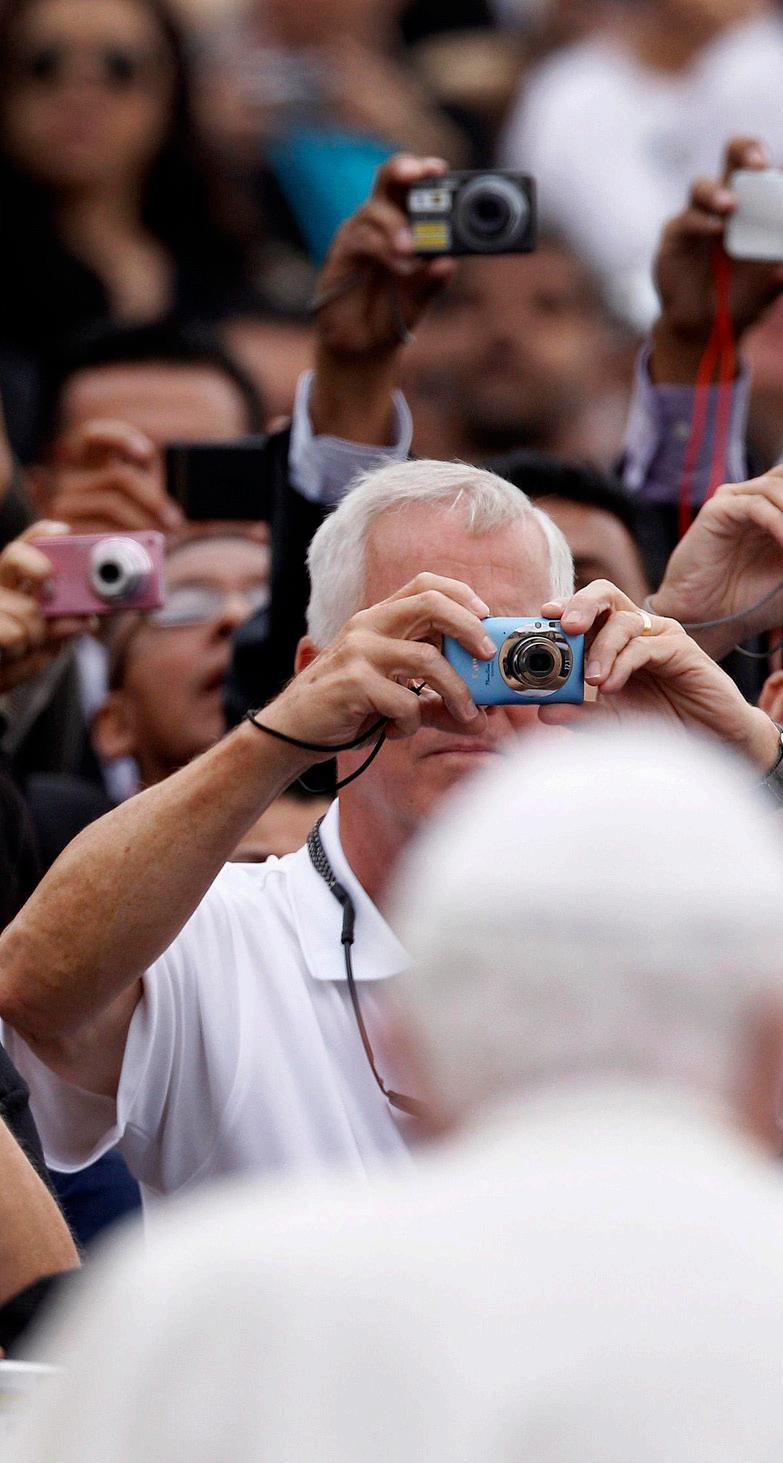
Pilgrims take pictures of Pope Benedict XVI as he arrives to lead his general audience in St Peter’s Square at the Vatican on 22 September.
PHOTO: CNS
Christ and more like everyone else who has become more Christ-like through purification, said the Pope.
“We need forgiveness, which is the backbone of every real reform,” he said.
The renewal of the individual “also becomes the core of the renewal of the community,” he said. When people realise that it is Christ who lives in them, they are “torn from isolation and welcomed” into the community of believers, the Pope said.
The Church accompanies each individual in the process of purification, which can start out as a long, arduous process, but will always become more joyful, he said.
LONDON - In terms of his primary objectives - preaching the Gospel to his flock and defending the influence of religion in society - Pope Benedict XVI can look at his four day visit to Great Britain as a major success.
The big question going into the 16-19 September visit was whether the German Pope would be given a fair hearing in a country where scepticism about religion runs high.
The answer was a resounding “yes.” Not only did the Pope speak his mind, but he also received unprecedented gavel-to-gavel coverage in the British media.
Papal events were broadcast live and every newspaper devoted several pages each day to the Pope’s words which focused largely on the right of the Church to have its voice heard in the public square. Some newspapers even published full texts of his major speeches and sermons - something that rarely happens on papal trips.
The flip side of such interest was that the Pope’s critics also had their day in the limelight.
Thousands of protesters took to the streets in peaceful but vehement dissent on issues ranging from AIDS and condoms to the Church’s record on sex abuse.
Vatican officials said they accepted this as a part of public debate in Britain.
“We expected this. We know there are groups that have differences with the Catholic Church, and they have a right to express it. But, in general, the attitude of British society and the faithful has been positive,” Jesuit Fr Federico Lombardi, the Vatican spokesman, told reporters.
Not surprisingly, the image of the 83 year old Pontiff seemed to soften during his stay. Many people, Catholics and non-Catholics, often react to sound bites and headlines in forming opinions about Pope Benedict. When he comes to visit, they get a firsthand
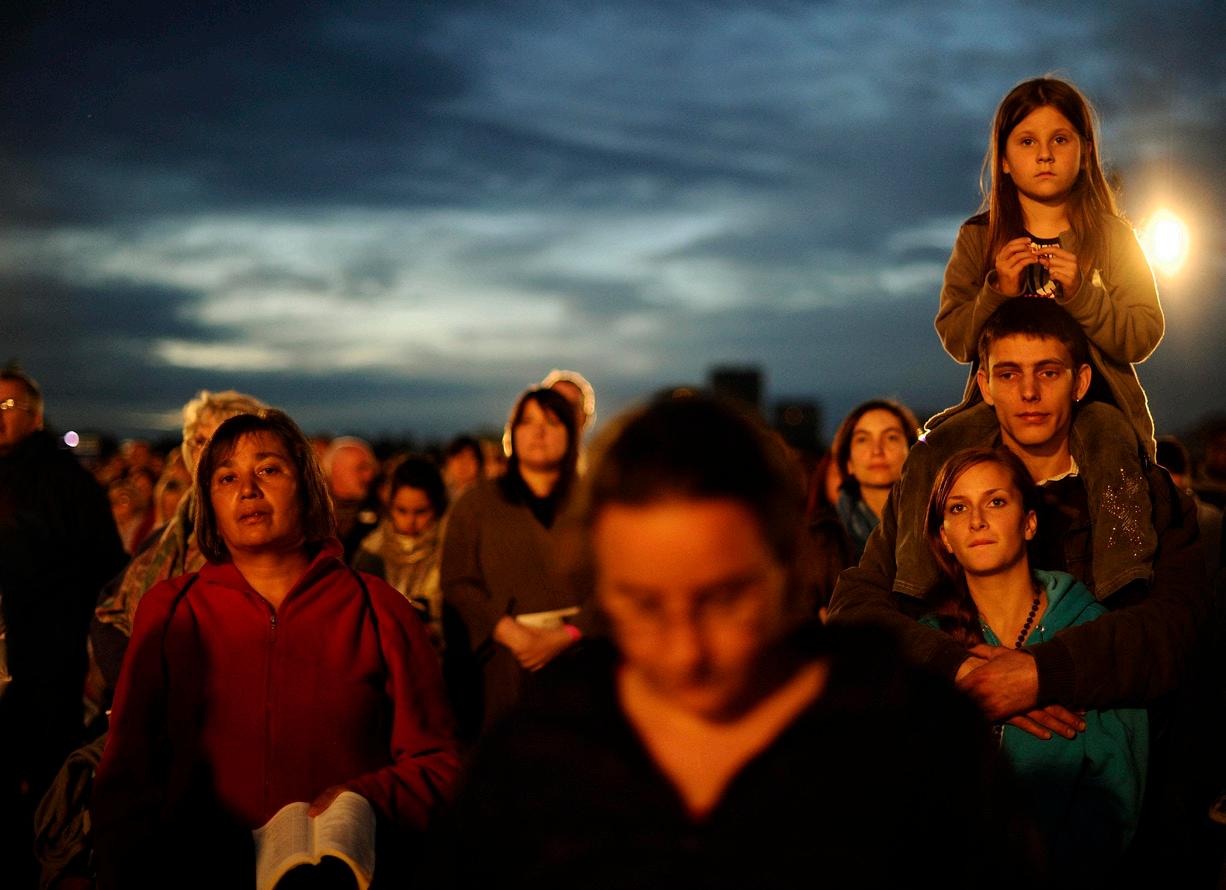
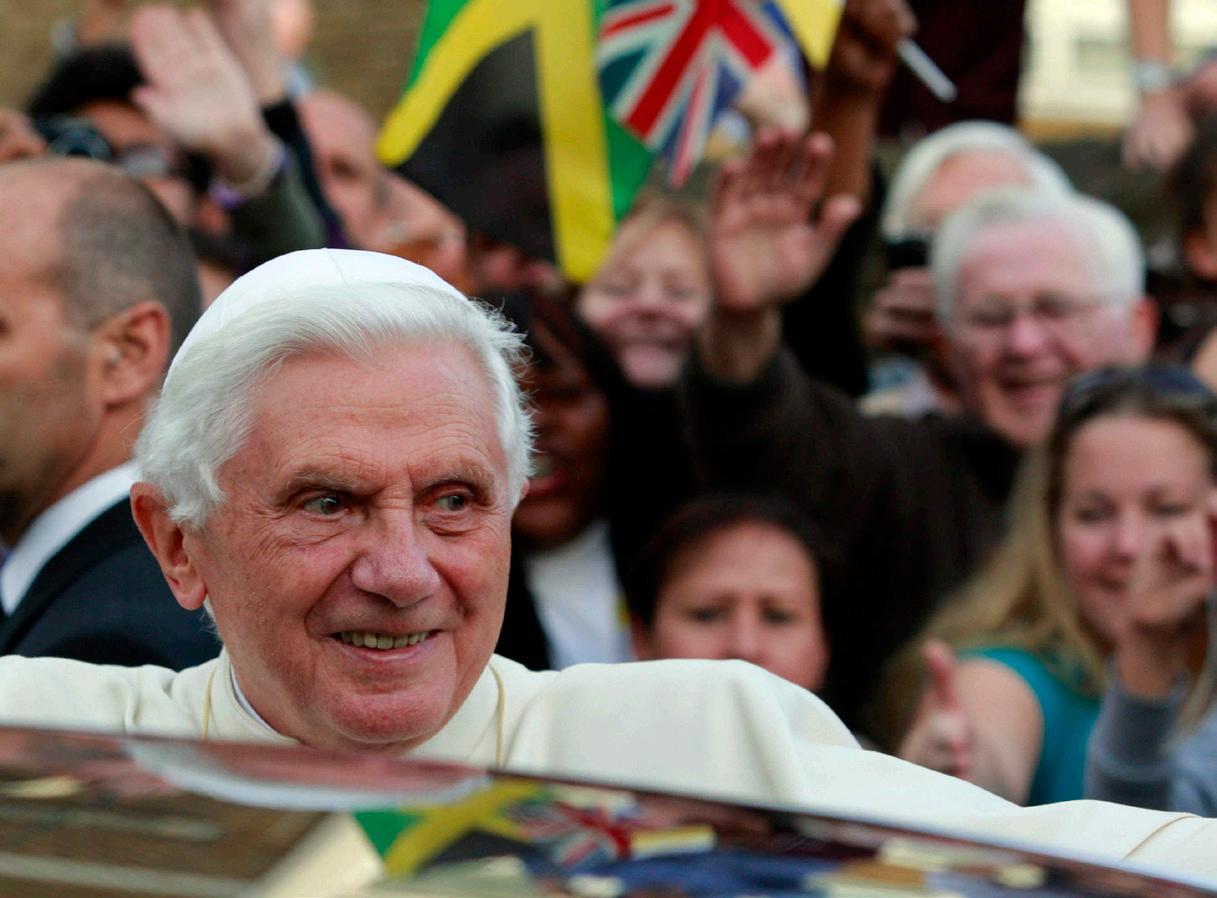
look and a double dose of content - something that usually works in the Pope’s favour.
What also impressed the British was the Pope’s patient and gentle manner which contrasted with the frequently strident tone of his critics. The Pope has “a shyness that attracts,” a commentator said.
“A guest who took the time to charm his guests” read one newspaper headline after the Pope lingered with schoolchildren in a London suburb, listening to their testimonials and posing for pictures. His smile seemed genuine, and why not? He was looking out at a sea of banners and posters that offered friendship in language like, “We (heart) U Papa.”
Pope Benedict came to Britain as a teacher, and his lesson plan was clear from the beginning.
In a 16 September meeting with Queen Elizabeth II and about 400 civic and cultural leaders in Edinburgh, Scotland, he warned against “aggressive” forms of secularism that risk undermining traditional religious values.
His words came across as reasonable and respectful, largely because he drew examples of Christian cultural contributions from British history - the selfless service of Florence Nightingale, for example, or the missionary David Livingstone’s efforts to stop the slave trade. And, when describing “atheist extremism,” he said the
most sobering example was the Nazi regime, striking a chord with Britons as they commemorated the 70th anniversary of massive Nazi air strikes against the country.
In Glasgow, he donned a Tartan scarf and listened to bagpipe bands, then told Catholics it was not enough to live their faith privately; they should defend the Church’s teachings in the public square, he said.
“There are some who now seek to exclude religious belief from public discourse, to privatise it or even to paint it as a threat to equality and liberty.
Yet religion is, in fact, a guarantee of authentic liberty and respect,” he said at a Mass with more than 80,000 people.
The Pope’s words were clearly aimed at critics such as Richard Dawkins, the popular British author who has championed atheism and who considers religion a destructive force in society. But the Pope’s most eloquent answer to high-profile atheists came in his 17 September meeting in London with some 4,000 young Catholic students, when he described belief in God as a “friendship” that can fill one’s life with love of virtue.
“We need to have the courage to place our deepest hopes in God alone, not in money, in a career, in worldly success or in our relationships with others, but in God. Only He can satisfy the deepest needs of
our hearts,” he said. The keynote address of the papal visit came in Westminster Hall later that day, where the Pope laid out his vision of how religious belief can help shape the moral and ethical life of a society. He warned against an effort to marginalise religion, and he pointed to an example that resonated with many: the campaign by some groups to ban public celebration of Christmas.
In his meetings with Anglicans, the Pope deliberately steered clear of ecumenical differences and instead underlined the common task of fighting for the voice of religion in public affairs. In ecumenical terms, he made his biggest impact simply by his historic presence in two places never before visited by a Pope: Lambeth Palace, where he met with Anglican Archbishop Rowan Williams of Canterbury, and Westminster Abbey, where he joined an Anglican prayer service that a Vatican aide later described as liturgically “wonderful.”
The beatification of Cardinal John Henry Newman in Birmingham on 19 September was the central religious event of the visit. The Pope held up Blessed Newman as an inspiration in two significant ways: in the wider culture, for his vision of religion’s “vital” role in society; and in the Church, for his vision of Catholic laity who know their faith well
and can defend it articulately. The Pope’s arguments about God, religion and the social order were much debated in the media and not everyone agreed with him. But, as British Prime Minister David Cameron said in a departure ceremony, the Pope’s words had challenged the whole country to “sit up and think.”
Finally, the British trip underscored that the priestly sex abuse crisis will never go away when Pope Benedict is on the public stage. The Pope has embraced that fact, as illustrated by his decision to address the issue on his plane, at his only public Mass in London and in a private meeting with sex abuse victims.
He used dramatic language, expressing his “deep sorrow and shame” and acknowledging the failings of priests and the failure of Church officials to respond to abuse allegations with enough speed and vigilance. That was not enough for some sex abuse advocacy groups and other critics, who called for greater Church accountability during a large protest demonstration in downtown London.
The image of thousands of protesters marching through the streets is not one Vatican officials will put on the highlight reels of this trip, but it illustrated the price to be paid in a pluralistic society if the Church wants to be part of the public discourse.
In June, Pope Benedict XVI announced he was establishing a major Vatican agency to deal with “new evangelisation” in traditionally Christian countries.
It was seen as a bold stroke in the Church’s ongoing effort to engage the modern world. But three months later, the project is still stuck in the slow wheels of Vatican bureaucracy.
Officially, the Pontifical Council for Promoting New Evangelisation doesn’t yet exist.
Although the Pope proclaimed its formation and then named its president, Italian Archbishop Rino Fisichella, the office will formally be launched only with publication of an apostolic constitution, in which the Pope will lay out the council’s structure and tasks.
In the meantime, Archbishop Fisichella is in a kind of limbo.
“We’re hoping it will come around the end of September. I don’t know any more than
that. We need to be patient with the bureaucracy here,” he said. The Pope keeps mentioning the importance of the new council. Most recently, he urged British Bishops to “avail yourselves of its services.” But the council has no address, no phone number and no official mission. Work is proceeding on the council’s office - after the construction team took a month off for the traditional August holidays.
As Archbishop Fisichella said, “Pazienza.” And at the Vatican, patience is more than a virtue; it’s a way of life. The refusal to be rushed can be seen in long delayed appointments, the slow gestation of documents and the methodical preparation of events such as synods or consistories.
For example, the Pope’s document on the 2008 Synod of Bishops on the Bible - described as an urgently needed text by the Synod participants - was expected late last year or early in 2010. It has been inexplicably deferred
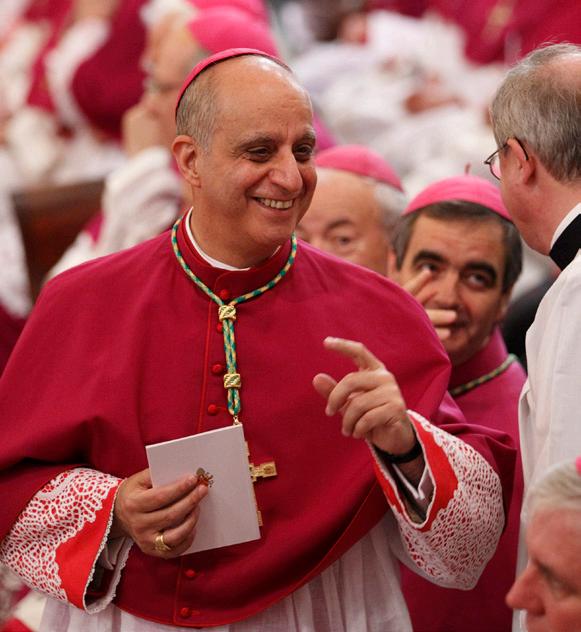 Archbishop Rino Fisichella
Archbishop Rino Fisichella
and is now due out in the fall. The timeline for that synod began with planning in 2006, making it a four year run.
The Pope can sometimes accelerate things, but even he is subject to the deliberate pace of the Roman Curia. A case in point: The Pope finished his longawaited second volume on Jesus of Nazareth last May, promoting
speculation that the book would be released soon. But Vatican officials are being so careful in their translations of the book that it’s not coming out until Lent of 2011. By that time, the Pope may have a good start on the third and final volume of the series which he began writing over the summer.
When it comes to appointments, the Vatican can move with lightning speed or slow motion. US Archbishop-designate Joseph Tobin was recently appointed secretary of the Congregation for Institutes of Consecrated Life and Societies of Apostolic Life, a position that had been unfilled for six months. That’s a long vacancy for the secretary job which handles much of the day-to-day business of a congregation that oversees the world’s Religious Orders.
On the other hand, the Pontifical Council for Social Communications was without a No 2 official for nearly three years before Irish Mgr Paul Tighe
was named secretary in 2008.
The College of Cardinals is one of the Church’s most important bodies, most significantly when it meets in a conclave to elect a new Pope. Yet, despite predictions to the contrary, Pope Benedict has shown no sense of urgency in filling vacancies among the 120 voting-age Cardinals.
Rumours of a consistory to create new Cardinals began more than a year ago and it’s now expected to happen in November, when the number of Cardinal electors will have dipped to 101, the lowest in many years.
Pope Benedict seems to be just fine with the go-slow mentality that reigns in the Vatican, an attitude that reflects his general approach to workplace speed and efficiency. In 2006, citing the mediaeval monk St Bernard of Clairvaux, the Pope warned against “the dangers of excessive activity” in every kind of occupation, “even those involving the governance of the Church.”
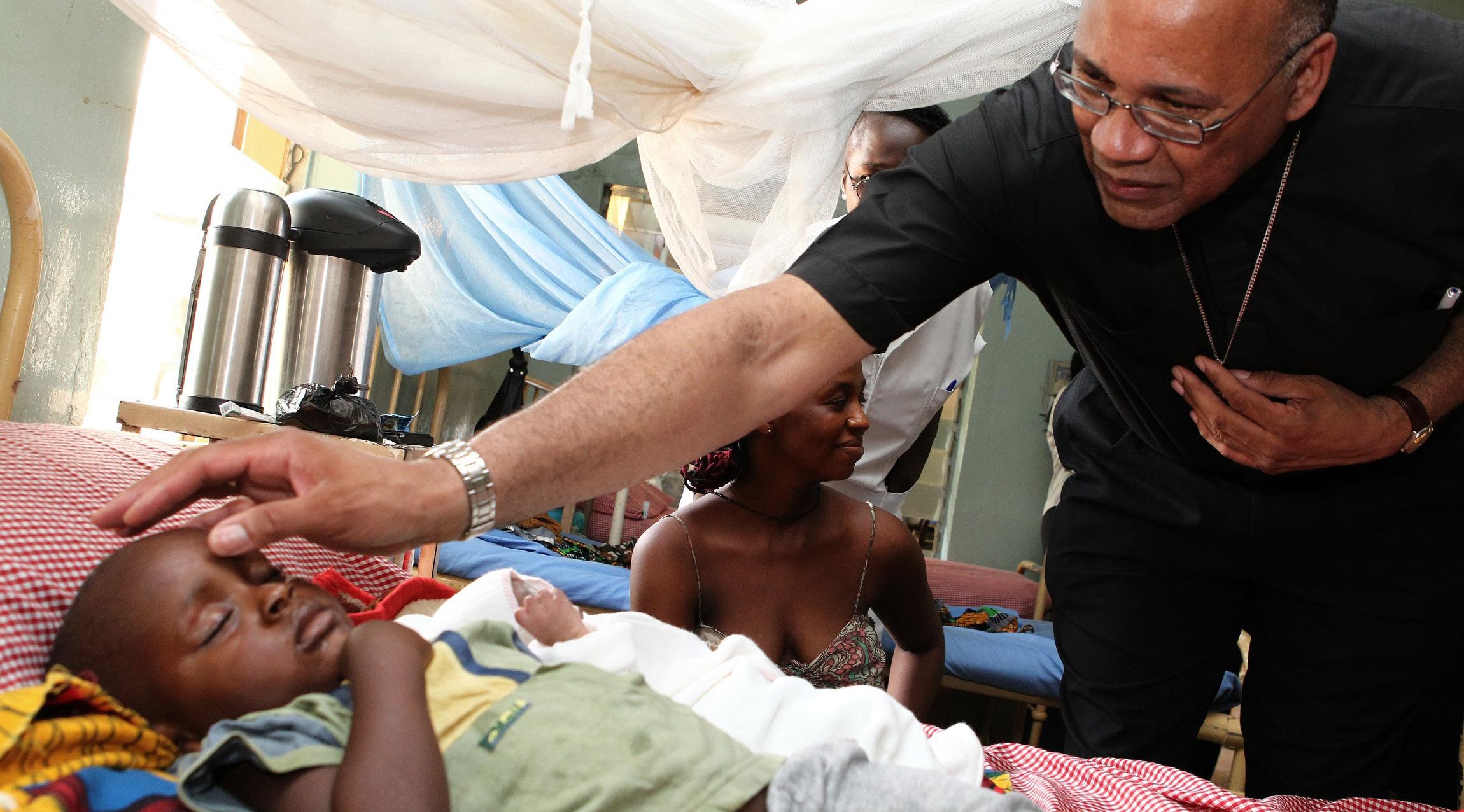 WIECHEC
WIECHEC
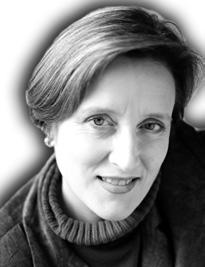 with Anna Krohn
with Anna Krohn
Youth and hope at this month’s United Nations Department of Public Information/ NGO Conference in Melbourne
Over many years the Catholic Women’s League Australia, which has maintained its consultative (Roster) status with the Economic and Social Council of the United Nations, has been a face of the “culture of life” at many complex and sometimes antagonistic debates which take place on the floor of United Nations’ Conferences.
Many will remember the important interventions made by Pope John Paul II and Mary Ann Glendon in the heated debates over “gender politics”, reproductive rights in population policy at the Cairo Conference in 1994 and again at the Beijing Conference on Women in 1995. These debates continue to this day at every meeting of different United Nations special interest conferences.
However, it was the positive presence of young people, especially those inspired and open about their faith which impressed the CWLA delegation who attended the important 63rd United Nations Department of Public Information/Non-Government Organisation (UN DPI/NGO) Conference held in Melbourne from 30 August to 1 September. The League’s delegation included Catholic women across gen-
erations and backgrounds. Participating in plenary and workshop sessions at the conference for the CWLA were: Madge Fahy (National President), Thora Reagan (National International Secretary), Catherine McGrath (nominee WUCWO Board Member, Australia), Betty Roberts (Social Issues Convenor), Anna Krohn (CWLA Bioethics Convenor and Anima Women’s Network), Marcia Riordan (Melbourne Archdiocese Life, Marriage and Family Office) and Olivia Meese (a medical student from The University of Notre Dame).
It was the first time that Australia had hosted a UN event of this size, at which 1600 delegates from over 350 non-governmental aid and health organisations were represented.
It was only the third time that the UN DPI/NGO conference has been held outside the United Nations headquarters in New York.
The conference was hosted by the Australian Government, the Victorian Government and Melbourne City Council.
The conference theme, Advancing Global Health, was given a sense of urgency because the UN is well aware that it must form successful partnerships with NGOs who are the first to attend to the most desperate people afflicted by the recent natural disasters, population displacements and the global economic crisis.
It is also the NGOs who stay long after political and factional differences dissolve government funding or the world’s attention.
The delegates heard a shocking role call of death laden statistics: one billion people are without access to food; 2.6 billion lack access to improved sanitation; eight out of 10 have no access to safe drinking water; nearly nine million children die before the age of five; and at least 340,000 women die each year of pregnancy-related causes.
During the conference, the
CWLA women shared their research and took inspiration from the life and example of Dr Mary Glowrey, the founding President of the Catholic Women’s League of Victoria and Wagga Wagga and the Catholic Hospital Association of India (CHAI).
Dr Mary Glowrey was one of the first women medical graduates in Australia and dedicated her life to the promotion of maternal and infant health, the provision of basic resources (food, water and sanitation) and the prevention of infectious diseases such as malaria. These same three health issues are central to the Millennium Development Goals (MDGs), the series of internationally agreed social and economic targets which world leaders have pledged to try to attain by 2015.
Thora Regan was impressed by the way in which young people at the conference, many of them inspired by Christian, Buddhist and Jewish traditions, were so willing to share their time and discussions with each other.
Matthew Restall, organiser of the youth organisation RISE (Restoring Integrity and Sexual Ethics) had some interesting observations about his time at the UN DPI/NGO conference: “One of the really important elements to the conference was the Youth Breakfast Programme.
“Each morning, young people from the NGOs met to share ideas and to network. I was at each one of these and it struck me that there was a great deal of common ground amongst us younger people on the urgent need to overcome poverty. These young people did not all agree with my thoughts about sexual integrity and the right to life, but they all were willing to listen with respect to my contributions.”
The Joint Youth Statements can be seen as a strong desire to contribute to the promotion of basic human needs such as water, sanitation, nutrition, economic justice, environmental sustainability and stewardship, and basic mater-
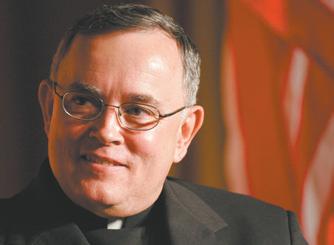 Archbishop Charles Chaput
Archbishop Charles Chaput
Invited to address Canon lawyers in Slovakia in August, Archbishop Charles Chaput of Denver called on Catholics in the West to overcome the world’s intolerance of Christianity. His words got many people talking. The Record presents Part 4 of his speech.
Let me sum up what I’ve been saying. My first point is this: Ideas have consequences. And bad ideas have bad consequences.
nal and infant welfare. Thora noted: “Their message to us was: do not be afraid to ask young people to step up and help.”
It was also significant that many of the most memorable media stories to emerge from the conference arose from the creative leadership, moral courage and blistering hard work of outstanding Christian women: Sister Mary Owens (IBVN) and the Nyambani Village for HIV affected children and their families (Kenya); the Caritas teams in Papua New Guinea and Salesian Mission’s response to violence against women, especially amongst women whose lives have been disrupted by forced migration.
Marcia Riordan said she was “delighted and surprised to see the diversity of work being done by so many faith-based NGOs evident at the conference.”
The concluding Declaration stated that some of the Millennium Development Goals, all of which affect the health of populations, have been difficult to achieve without wholesale support from governments and agencies.
The goals “are significantly offtrack for the poorest and least politically powerful people.” Although there were many well funded NGOs agitating for “contraception, abortion and sexual health rights and programmes”, the final Declaration steered clear of ratifying their claims.
Perhaps the greatest surprise for the CWLA delegates was the tone of the closing session.
Madge Fahy commented on the spirit of hope and cooperation captured in the closing statement by Dr Mary Norton, Chair of the 63rd Annual UNDPI/NGO Conference. Dr Norton recited the “Irish Blessing” and declared that the prayer was a vital part of her family’s tradition. Although many of the philosophical debates will continue on these important international events, this was a conference at which women of faith were both visible and effective.
Today we are living in a world that is under the sway of some very destructive ideas, the worst being that men and women can live as if God does not matter and as if the Son of God never walked this earth.
As a result of these bad ideas, the Church’s freedom to exercise her mission is under attack. We need to understand why that is, and we need to do something about it.
My second point is simply this: We can no longer afford to treat the debate over secularisationwhich really means cauterising Christianity out of our cultural memory - as if it’s a problem for Church professionals.
The emergence of a “new Europe” and a “next America” rooted in something other than the real facts of our Christian-shaped history will have damaging consequences for every serious believer.
We need not and should not abandon the hard work of honest dialogue. Far from it. The Church always needs to seek friendships, areas of agreement, and ways to make positive, reasoned arguments in the public square. But it’s foolish to expect gratitude or even respect from our governing and cultural leadership classes today. Naïve imprudence is not an evangelical virtue.
The temptation in every age of the Church is to try to get along with Caesar.
And it’s very true: Scripture tells us to respect and pray for our leaders.
We need to have a healthy love for the countries we call home. But we can never render unto Caesar what belongs to God. We need to obey God first; the obligations of political authority always come second.
We cannot collaborate with evil without gradually becoming evil ourselves. This is one of the most vividly harsh lessons of the 20th century. And it’s a lesson that I hope we have learned.
That brings me to my third and final point today: We live in a time when the Church is called to be a believing community of resistance. We need to call things by their
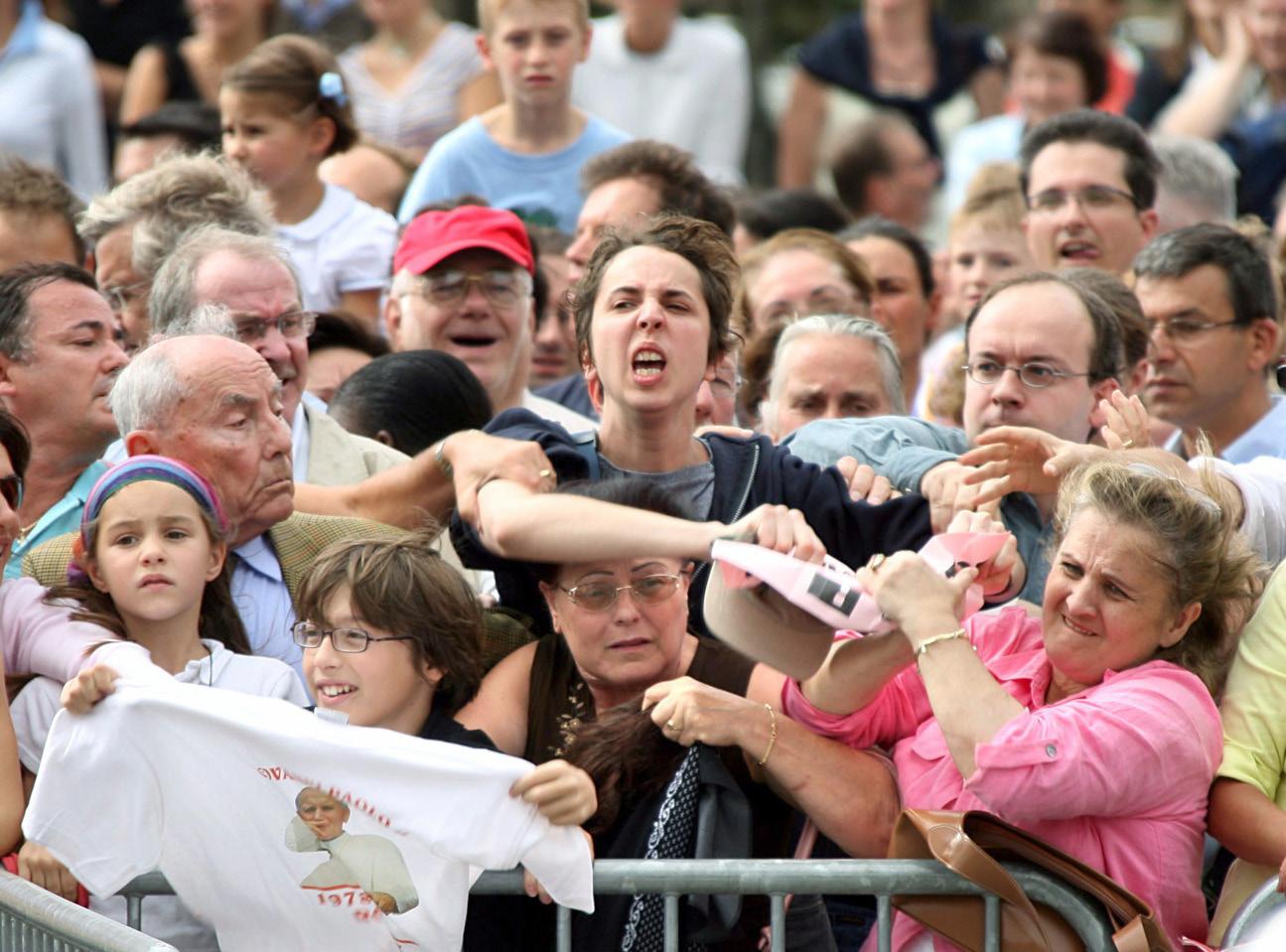
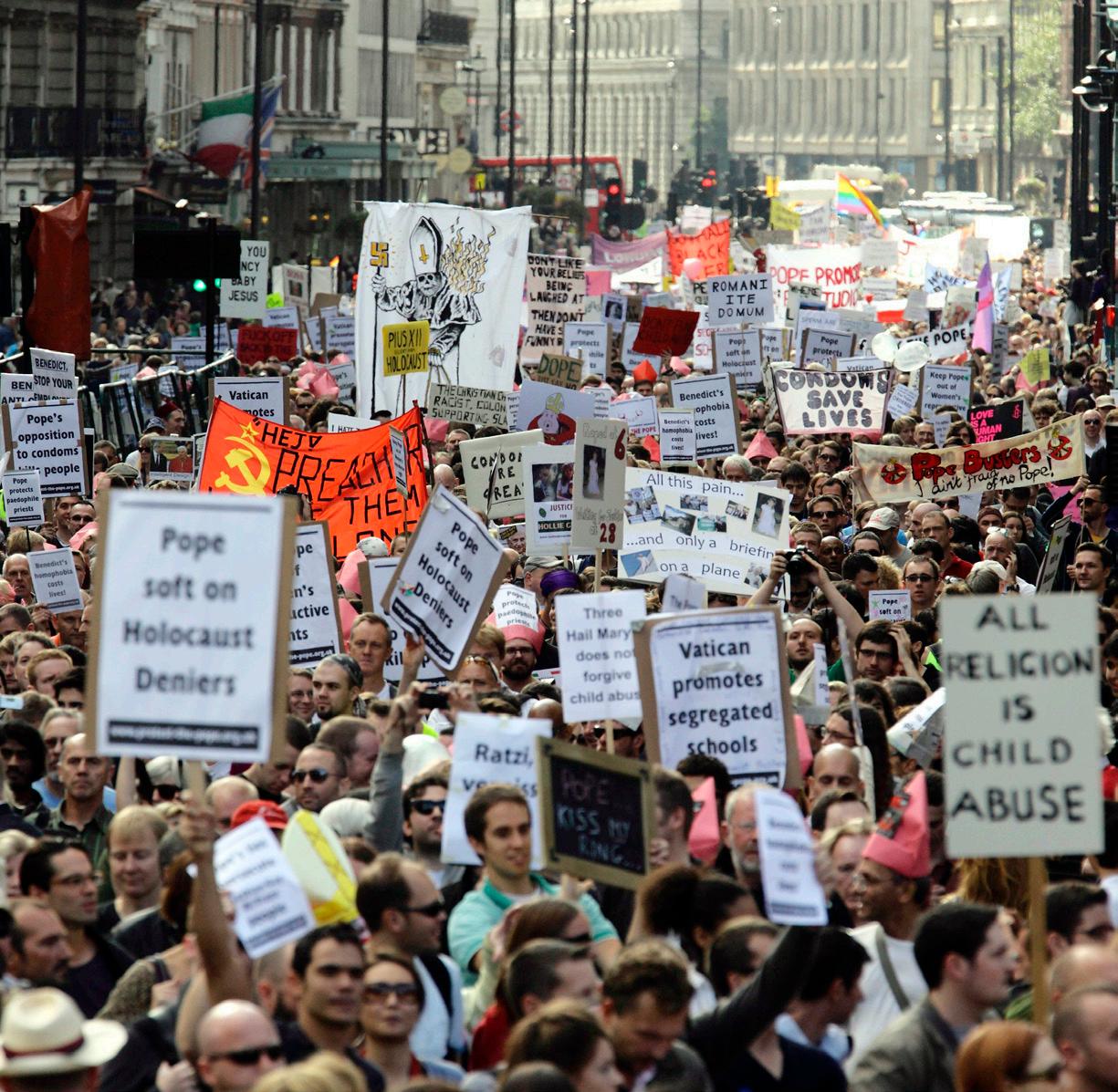
true names. We need to fight the evils we see. And most importantly, we must not delude ourselves into thinking that by going along with the voices of secularism and deChristianisation we can somehow mitigate or change things. Only the Truth can set men free. We need to be apostles of Jesus Christ and the Truth He incarnates.
So what does this mean for us as individual disciples? Let me offer a few suggestions by way of a conclusion.
My first suggestion comes again from the great witness against the paganism of the Third Reich, Dietrich Bonhoeffer: “The renewal of the Western world lies solely in the divine renewal of the Church, which leads her to the fellowship of the risen and living Jesus Christ.”
The world urgently needs a reawakening of the Church in our actions and in our public and private witness.
The world needs each of us to come to a deeper experience of our Risen Lord in the company of our fellow believers.
The renewal of the West depends overwhelmingly on our faithfulness to Jesus Christ and His Church. We need to really believe what we say
we believe. Then we need to prove it by the witness of our lives. We need to be so convinced of the truths of the Creed that we are on fire to live by these truths, to love by these truths, and to defend these truths, even to the point of our own discomfort and suffering.
We are ambassadors of the living God to a world that is on the verge of forgetting Him. Our work is to make God real; to be the face of His love; to propose once more to the men and women of our day the dialogue of salvation.
The lesson of the 20th century is that there is no cheap grace. This God whom we believe in, this God who loved the world so much that He sent His only Son to suffer and die for it, demands that we live the same bold, sacrificial pattern of life shown to us by Jesus Christ.
The form of the Church, and the form of every Christian life, is the form of the cross. Our lives must become a liturgy, a self-offering that embodies the love of God and the renewal of the world.
The great Slovak martyrs of the past knew this.
And they kept this truth alive when the bitter weight of hatred and totalitarianism pressed upon
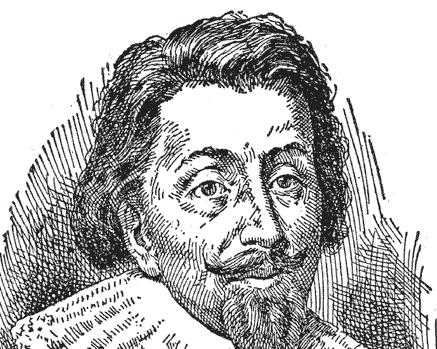
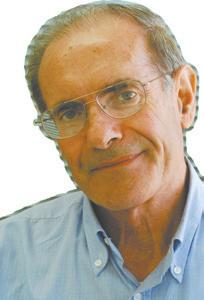 By Anthony Paganoni CS
By Anthony Paganoni CS
The 500 years since the discovery of America have yielded not only a series of celebratory events spanning across the Atlantic, but also considerable public debate over the benefits, as well as the drawbacks, experienced particularly by some of the most turbulent, in political and economic terms, Spanish-speaking peoples south of the Mexican border.
It was noted that, while the United States of America and Canada, who were colonised by the mostly protestant British settlers, had become powerhouses of civility and prosperity, the same could not be said for some nations in the Catholic part of the American continent.
tends to exclude or exaggerate the importance of some facts. These and other similar events need to be contextualised by serious historical perspective.
As a result, the Catholic faith, according to the same commentators, had been responsible for a string of systemic injustices that have left a legacy of underdevelopment and deep divisions.
While the controversy was raging, some dubious practices surfaced: in the process of apportioning large tracts of lands in North America, the original inhabitants, the Indians, had suffered the same fate.
The same treatment was also meted out by British explorers and colonisers in Australia to the local inhabitants, the Aborigines.
The beginnings of Catholicism in the United States of America is revealing.
your people. I’m thinking especially right now of your heroic Bishops, Blessed Vasil Hopko and Pavel Gojdic, and the heroic Sister, Blessed Zdenka Schelingová.
We need to keep this beautiful mandate of Sister Zdenka close to our hearts:
“My sacrifice, my holy Mass, begins in daily life. From the altar of the Lord I go to the altar of my work. I must be able to continue the sacrifice of the altar in every situation … It is Christ whom we must proclaim through our lives, to Him we offer the sacrifice of our own will.”
Let us preach Jesus Christ with all the energy of our lives. And let us support each other - whatever the cost - so that when we make our accounting to the Lord, we will be numbered among the faithful and courageous, and not the cowardly or the evasive, or those who compromised until there was nothing left of their convictions; or those who were silent when they should have spoken the right word at the right time.
Thank you. And God bless all of you.
- to see Archbishop Chaput’s full column, go to www.therecord.com.au.
In particular, the international media, orchestrated by news agencies in the US, loaded the word discovery with “conquest”, and far too many cases of “extermination” and “eradication” of native peoples and civilisations.
These, according to British and American commentators, had occurred at the hands of Catholic colonisers who originated from the then Catholic kingdoms of Spain and Portugal.
The media had adopted the view that the Indios in the Caribbean and South American continent were coerced to convert to the Catholic faith.
Exploitative abuses and disrespectful handling of local customs and lifestyles had indeed occurred and duly highlighted, but with barely a whimper reserved for some Catholic missionaries (for example Bartolomeo de las Casas) who had, in various nations and in various ways, opposed the lamentable deeds perpetrated by some of the now most famous conquistadores. Following a pre-set ideological agenda is always risky, as it
In his volume The Church in the Eighteenth Century, DanielRops states: Lord Baltimore’s noble endeavour during the 17th century to found a Catholic colony in Maryland came to nothing after his death … Whereas Lord Baltimore had generously thrown open his domains to all Christian creeds, emissaries of the Archbishop of Canterbury applied the anti-papist laws in full.
In 1704, the parliament of Baltimore forbade Catholics to celebrate Mass in public or to educate children. ‘Thus’, says the Protestant historian Bancroft, ‘the Catholics found themselves treated as helots in the country which, in their truly Catholic liberalism, they had made an asylum not only for themselves but also for all persecuted sects’.
In order to justify their hostility towards Catholics, the Protestant masters of the colonies used to say there was every reason to believe that the Papists were secret agents of France and Spain, great Catholic powers whose greed awaited nothing but an opportunity to swallow the free territories of His Majesty (p 332-333).
Of course, Catholics managed to survive. The American Catholic community is about 65 million people, with an ever greater number of “Hispanics”.
In 1789, the proclamation of liberty of conscience marked the conclusion of this historical struggle. But not the end of latent hostilities.
Panorama entries must be in by 12pm Monday.
Contributions may be emailed to office@therecord.com.au, faxed to 9325 4580, or mailed to PO Box 3075, Adelaide Terrace, Perth WA 6832.
FRIDAY, 1 OCTOBER
Pro - Life Witness
9.30am at St Brigid’s Midland. Mass followed by Rosary procession and prayer vigil at nearby abortion clinic, led by the Franciscan Friars of the Immaculate. All welcome to come and pray for the conversion of hearts. Enq: Helen 9402 0349.
Alliance of the Two Hearts
The Alliance, Triumph and Reign of the United Hearts of Jesus and Mary 9pm at St Bernadette’s Church, Glendalough. Exposition of the Blessed Sacrament, reflections, Rosary, hymns and alternating with healing sessions. Midnight Mass for the Lord’s second coming and His Reign on earth. Participate in the Lord’s mighty work in building a people of power. Enq: Fr Doug 9444 6131 or Dorothy 9342 5845.
FRIDAY, 1 OCTOBER TO SUNDAY, 3 OCTOBER
Brother Andrew’s 10th Anniversary
7pm Friday–2pm Sunday. God’s Farm warmly welcomes Marist Fr Dr Paul Glynn who will talk on Praying in the Spirituality of St Francis, Br Andrew and Immaculee Illibagiza. Celebrating Holy Mass daily, Prayers of the Church and Reconciliation. Enq: Betty or Mary Tel/Fax 9755 6212. Hired bus bookings Cheryl A/H 9409 8747 or Yvonne 93431897. Map available. God’s Farm, PO Box 24, Cowaramup 6284.
SATURDAY, 2 OCTOBER
Anglo-Indian Reunion 2010
9.30 to 10.30am at St Mary’s Cathedral. An Ecumenical Service of Praise, Petition and Thanksgiving for AngloIndians all over the world. Main celebrants for the Service will be Mgr Michael Keating and Bishop Brian Kyme. All are most welcome.
Witness for Life
8.30am at St Augustine’s, Gladstone Rd, Rivervale. Mass celebrated by Fr Paul Carey, followed by Rosary procession and prayer vigil at nearby abortion clinic. All welcome to come and pray for the conversion of hearts. Enq: Helen 9402 0349.
Day with Mary
9am to 5pm at St Anne Church, 6549 Great Northern Hwy, Bindoon. Day of prayer and instruction based on the Fatima message. 9am Video. 10:10am Holy Mass. Reconciliation, Procession of the Blessed Sacrament, Eucharistic Adoration, Sermons on Eucharist and Our Lady, Rosaries and Stations of the Cross. BYO lunch. Enq: Franciscan Sisters of the Immaculate 9250 8286. Bus Enq: Nita 9367 1366.
SUNDAY, 3 OCTOBER
Divine Mercy
1.30pm at Francis Xavier Church, 25 Windsor St, Perth. An afternoon with Jesus and Mary, Rev Fr Andre Nahhas will give homily on St Faustina Kowalska. A DVD ‘Divine Mercy Chaplet for Children’ will also be shown. Refreshments afterwards. Enq: John 9457 7771.
Transitus Celebration of St Francis of Assisi
6pm at Edel Quinn Centre, 36 Windsor St, East Perth. Come and join the Secular Franciscan Order in celebrating Mass and readings. Followed by supper. Enq: Angela 9275 2066.
Transitus Celebration of St Francis of Assisi
6pm at Edel Quinn Centre, 36 Windsor St, East Perth. Come and join the Secular Franciscan Order in celebrating Mass and readings. Followed by supper. Enq: Angela 9275 2066.
WEDNESDAY, 6 OCTOBER
The new movements in the Church - who are they and why are they important?
Book launch of Fresh Wine and New Skins by Bishop Julian Porteous of Sydney. Bishop Porteous’ fascinating book will be launched by Bishop Sproxton at St Mary’s Cathedral in Perth from 6.30pm-8pm.
WEDNESDAY, 6 OCTOBER AND THURSDAY, 7 OCTOBER
Protecting and Preserve Life in a Culture of Death 7-9pm at LJ Goody Bioethics Centre, 39 Jugan St, Glendalough. Second Venue: 7-9pm at University of Notre Dame, ND Building No 4 (Education Classroom
Building), Fremantle Campus. Dr Paul Byrne on brain death, organ transplantation, and end of life issues.
THURSDAY, 7 OCTOBER - SATURDAY, 9 OCTOBER
Seek 2010 – A Conference on Scripture and Prayer for Everyday Life
7.30pm at Queen of Apostles Parish, 57 Tudor Ave South, Riverton. Opportunity for the family to learn, experience and grow. Programmes for youth and adults on new ways to explore Scripture and prayer, plus activities for children and crèche. Brochures and registration forms available from your parish. Enq: Barbara or Su Goh 9328 8113 or email familylife@perthcatholic.org.au.
SATURDAY, 9 OCTOBER - SUNDAY, 10 OCTOBER
Retreat by Fr Paul Glynn SM from Sydney 9am-5pm at Bioethics Centre, 39 Jugan St, Mt Hawthorn. Theme: With the Help of the Holy Spirit, to pray to Jesus and the Father. Saturday, BYO lunch to share, Sunday lunch provided. Enq: John 0412 798 932, Annie 0422 083 716 or Bessie 0433 795 539.
SATURDAY, 9 OCTOBER
Divine Mercy
2.30pm at St Francis Xavier’s Church, Windsor St, East Perth. Healing Mass, main celebrant will be Fr Dennis O’Brien. Divine Mercy Prayers, followed by the Veneration of First Class Relic of St Faustina Kowolska. Reconciliation in English will be offered. Refreshments afterwards. Enq: John 9457 7771.
Voice of the Voiceless Ministry Mass for Those Travelling to Rome, 11am at Saint Joseph’s Convent Chapel, 16 York St, South Perth. 12 noon teatime followed by Reflection and tour. Picnic and get together around 1.30pm.
St Padre Pio Day of Prayer
8.30am at Our Lady of the Mission, 270 Camberwarra Dr, Craigie. DVD followed by Exposition of the Blessed Sacrament, Rosary, Divine Mercy, Silent Adoration and Benediction at 10am. 11am Mass, St Padre Pio Liturgy, Confessions available. Bring a plate for lunch. Tea and coffee supplied. Enq: Des 6278 1540.
SUNDAY, 10 OCTOBER
The World Apostolate of Fatima - Eucharistic Hour 3pm at St Jerome’s Church, Rockingham Rd and Troode St, Munster. There will be the National Pilgrim Virgin Statue of our Apostolate. All welcome. Enq: 9339 2614.
Catholic Doctors’ Association WA - Annual Mass 10am at Chapel, St John of God Hospital, Murdoch. Followed by morning tea. All health care workers are invited. Enter through the main entrance. RSVP to Natalie by 1 Oct. Enq: 9242 4066 or ljgbc@iinet.net.au.
MONDAY, 11 OCTOBER
Prevention of Assisted Suicide-Euthanasia
7pm at the Bioethics Centre, 39 Jugan St, Glendalough. Talk on suicide prevention/euthanasia by Director/ Founder Alex Schadenberg of Euthanasia Prevention Coalition. All welcome. Enq: 9277 1644 or email afawa@ msn.com.
Taize Liturgy celebrating MacKillop canonisation
7–8pm at St Joachim’s Parish, Shepparton Rd, Victoria Park. Enq: 9474 6604.
TUESDAY, 12 OCTOBER
Alan Ames Healing Service
7pm at St Joseph’s Church, 19 Hamilton St, Bassendean. Mass followed by talk and healing service. Enq: George 9275 6608.
THURSDAY, 14 OCTOBER
Mother’s Prayers Mass
10am at Our Lady Queen of Apostles Catholic Church, Tribute Street, Riverton. For all mothers, fathers and grandmothers, grandfathers coming together to pray for their children and grandchildren. An opportunity for God to hear and act upon the hearts and minds of parents and grandparents joining together as one here on earth. All welcome. Please bring a plate. Enq: Veronica 9447 0671. Healing Mass
7pm at Saints John and Paul Church, Willetton. There will be veneration of the Relic of St Peregrine Patron of
Cancer Sufferers and Helper of all in need and Anointing of the sick.
FRIDAY, 15 OCTOBER
WA Mental Health Week and Carers Week
7.30pm at St John’s Church, 16 Aberdeen St, Northbridge. Spirit of the Streets Choir in concert with Bernard Carney. Tickets for adults $20, for children $15. Enq: Harry 9444 4626, Irene 0433 789 785 or Adrian 0424 791 665.
SATURDAY, 16 OCTOBER
2010 Disciples of Jesus Annual Ball
7.30pm at Rendezvous Hotel. A night of celebration, great music, food and dancing. Theme: Black and White. Enq: Janny 0420 635 919.
St Joseph’s School Wagin Reunion
11am at the old school grounds. For all past students. Enq: Ronnie 9861 1422.
MONDAY, 25 OCTOBER
CYM World Youth Day 2011 Pilgrimage Meeting
7.30pm at Perth Catholic Pastoral Centre, 40A Mary St, Highgate. Catholic Youth Ministry is organising the official Archdiocese of Perth pilgrimage to World Youth Day in Madrid next year. If you have already been saving or still unsure and want to know more, come along to our information night. Go to www.cym.com.au and fill out expression of interest form. Enq: 9422 7912.
FRIDAY, 5 NOVEMBER - THURSDAY, 11 NOVEMBER
Creation Spirituality Retreat
St John of God Retreat Centre, Shoalwater. For the weekend or week. Enq: Sr Shelley Barlow and registration 0428 772 784.
SATURDAY, 6 NOVEMBER
Love Ministries-Charismatic Healing and Mass 6pm at All Saints, 7 Liwara Pl, Greenwood. Get prayed over and healed from past and present issues or stand in for a loved one who may be ill or facing problems at this time. All welcome. Enq: Fr Giosue 9349 2315 or Gilbert 0431 570 322.
SUNDAY, 7 NOVEMBER
Schoenstatt Spring Fair
9.30am-2pm at 9 Talus Dr, Armadale. A family affair with entertainment for the children, international food, a variety of stalls, prizes, silent auctions and lots more. Bring all the family and help support the Schoenstatt Sisters, and visit our beautiful shrine, where you can leave all your requests and petitions. Enq: 9455 3140.
EVERY SUNDAY
Pilgrim Mass - Shrine of the Virgin of the Revelation 2pm at Shrine, 36 Chittering Rd, Bullsbrook. Commencing with Rosary followed by Benediction. Reconciliation is available before every celebration. Anointing of the Sick administered during Mass every second Sunday of the month. Pilgrimage in honour of the Virgin of the Revelation, last Sunday of the month. Side entrance to the church and shrine open daily between 9am-5pm. Enq Sacri 9447 3292.
EVERY SUNDAY AND MONDAY
Extraordinary Form of Latin Holy Mass 11am Sunday and 7.30pm Monday except 3rd Monday of the month, at St Joseph’s Parish, 20 Hamilton St, Bassendean.
THIRD SUNDAY OF THE MONTH
Oblates of St Benedict
2pm at St Joseph’s Convent, York St, South Perth. Oblates are affiliated with the Benedictine Abbey of New Norcia. All welcome to study the rule of St Benedict and its relevance to the everyday life of today for lay people. Vespers and tea later. Enq: Secretary 9457 5758.
EVERY FOURTH SUNDAY OF THE MONTH
Holy Hour for Vocations to the Priesthood, Religious Life
2-3pm at Infant Jesus Parish, Wellington St, Morley. The hour includes Exposition of the Blessed Eucharist, silent prayer, Scripture and prayers of intercession. Come and pray that those discerning vocations to the priesthood or
Religious life hear clearly God’s loving call to them.
LAST MONDAY OF EVERY MONTH
Christian Spirituality Presentation
7.30-9.15pm at the Church hall behind St Swithan’s Anglican Church, 195 Lesmurdie Rd, Lesmurdie. Stephanie Woods will present The Desert Period of Christianity, 260 to 600AD. From this time period came the understanding of the monastic lifestyle and contemplative prayer. No cost. Enq Lynne 9293 3848.
EVERY TUESDAY NIGHT
Novena and Benediction to Our Lady of the Miraculous Medal
6pm at the Pater Noster Church, Marmion and Evershed Sts, Myaree. Mass at 5.30pm. Enq: John 0408 952 194.
EVERY WEDNESDAY
Holy Spirit of Freedom Community
7.30pm at The Church of Christ, 111 Stirling St, Perth. We are delighted to welcome everyone to attend our Holy Spirit of Freedom Praise Meeting. Enq 9475 0155 or hsofperth@gmail.com.
SECOND WEDNESDAY OF THE MONTH
Chaplets of the Divine Mercy
7.30pm at St Thomas More Catholic Church, Dean Rd, Bateman. A beautiful and prayerful sung devotion. Accompanied by Exposition and followed by Benediction. All are welcome. Enq: George 9310 9493 home or 9325 2010 work.
EVERY THURSDAY
Cathedral Praise Meeting
7.45pm at 450 Hay St, Perth. 30 September, The Lord is Watching to fulfill His Word and 6 October, See I Place My Words in Your Mouth and I Have Made of You This Day a Fortified City. A journey of Intercessory Prayer, Revelation and Healing by Kaye Rollings, FMI. Please bring a Bible. Enq: 9382 3668 or 0439 981 515.
Catholic Questions and Answers
7-7.30pm at St Joseph’s Parish Centre, 20 Hamilton St, Bassendean. Catechesis learned easily with questions and answers. The Catechism of the Catholic Church. Adult learning and deepening of the Catholic Faith, with Fr John Corapi DVD series, 7.30-9pm.
Divine Mercy
11am at St John and Paul Church, Pine Tree Gully Rd, Willetton. Pray the Rosary and Chaplet of Divine Mercy, and for the consecrated life especially here in John Paul parish, conclude with veneration of the First Class Relic of Saint Faustina. Please do come and join us in prayer. Enq: John 9457 7771.
EVERY FIRST THURSDAY OF THE MONTH
Taize - Invitation to Prayer in Our Community
7.30-8.30pm at Our Lady Of Grace Church, 3 Kitchener St, North Beach. Taize Prayer is a meditation in which we pray beautiful chants together and spend time in prayerful silence. Christ is present in each of us and we pray as one. Enq: Joan 9448 4457 or Parish 9448 4888.
FIRST FRIDAY OF THE MONTH
Catholic Faith Renewal Evening 7.30pm at St John and Paul’s Parish, Pinetree Gully Rd, Willetton. Songs of Praise, sharing by a Priest followed by Thanksgiving Mass and light refreshments after Mass. All welcome to attend and bring your family and friends. Enq: Kathy 9295 0913, Ann: 0412 166 164 or catholicfaithrenewal@gmail.com.
The Alliance, Triumph and Reign of the United Hearts of Jesus and Mary. 9pm at St Bernadette’s Church, Glendalough. Commences with exposition of the Blessed Sacrament followed by Reflections, Rosary and alternating with healing sessions. Vigil concludes with the Holy Mass at midnight. Come, be healed and be part of the Lord’s Mighty Work. Enq: Fr Doug 9444 6131 or Dorothy 9342 5845.
Healing Mass
7pm at St Peter’s Parish, Wood St, Inglewood. Reconciliation, praise and worship, exposition of Blessed Sacrament, Benediction, anointing of the sick, and special blessing. Celebrants Fr Sam and other clergy. All welcome. Enq: Priscilla 0433 457 352, Catherine 0433 923 083 or Mary-Ann 0409 672 304.
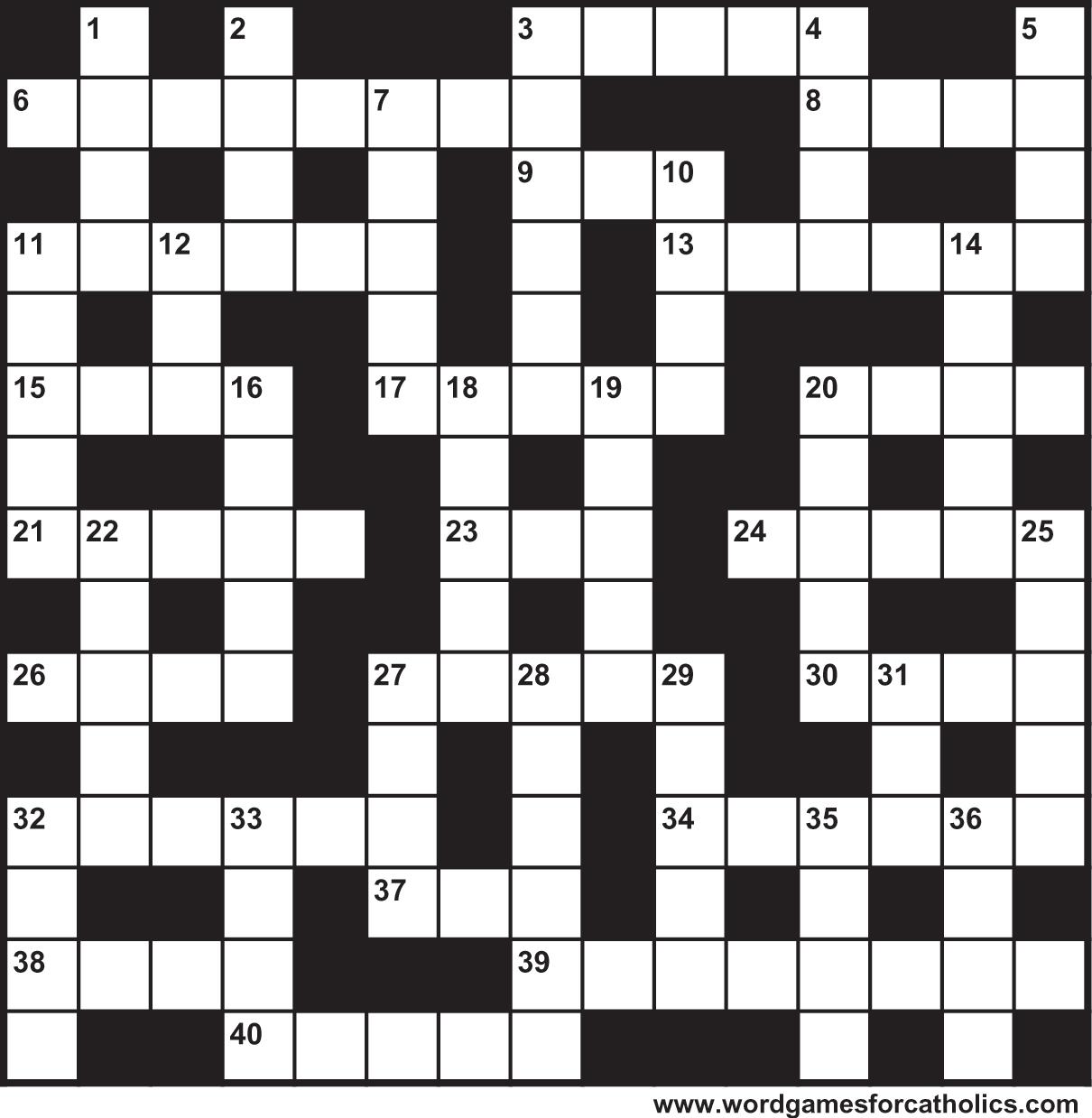
ACROSS 3 Blow on the cheek delivered by the Bishop at Confirmation
6 Marked with oil
8 Title for Jesus
9 ____ Dolorosa
11 Vessel for perfuming the altar
13 Parish leader
15 “… begotten not …”
17 ____ Dame
20 “And with you.”
21 Language of the Church
23 Catholic letters
24 What you do not use in unleavened bread
26 Diocese or Bishop starter
27 Solemn holy day
30 Home of Adam and Eve
32 “Behold, I am with you ____…”
34 One of the prophets
37 Type of cross
38 It was empty Easter morning
39 A visit with the pope
40 One of the seraphim or cherubim, for example
DOWN
1 Genuflection joint
2 Judas betrayed Jesus with one
3 Starts right after the Feast of Christ the King
4 Tunic-like vestments
5 Hebrew month
7 Shroud of 10 Church section
11 Biblical animal of transport
12 Land in which Cain settled
14 Patriarch pit stop?
16 St Stein
18 A dove brought back this branch back to Noah
19 They were found in Juan Diego’s cape at Guadalupe
20 Administer extreme unction
22 Possible Easter month
25 A no-coveting commandment
27 ____ and abstinence
28 Type of sin
29 Day on which Jesus rose
31 Agnus
32 Bible book about the early Christians
33 Jesus’ name for the Father
35 First murder victim
36 Bishop saint whose feast day is October 20
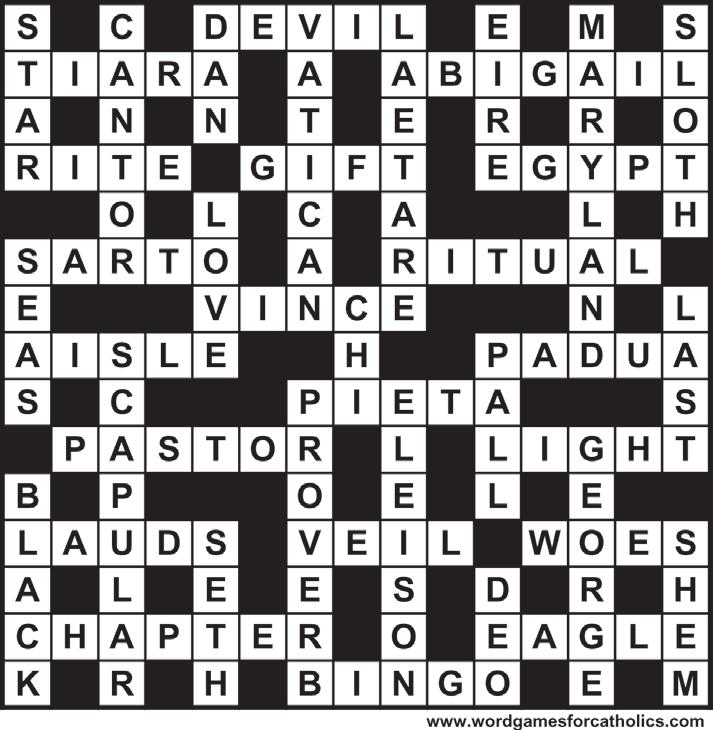
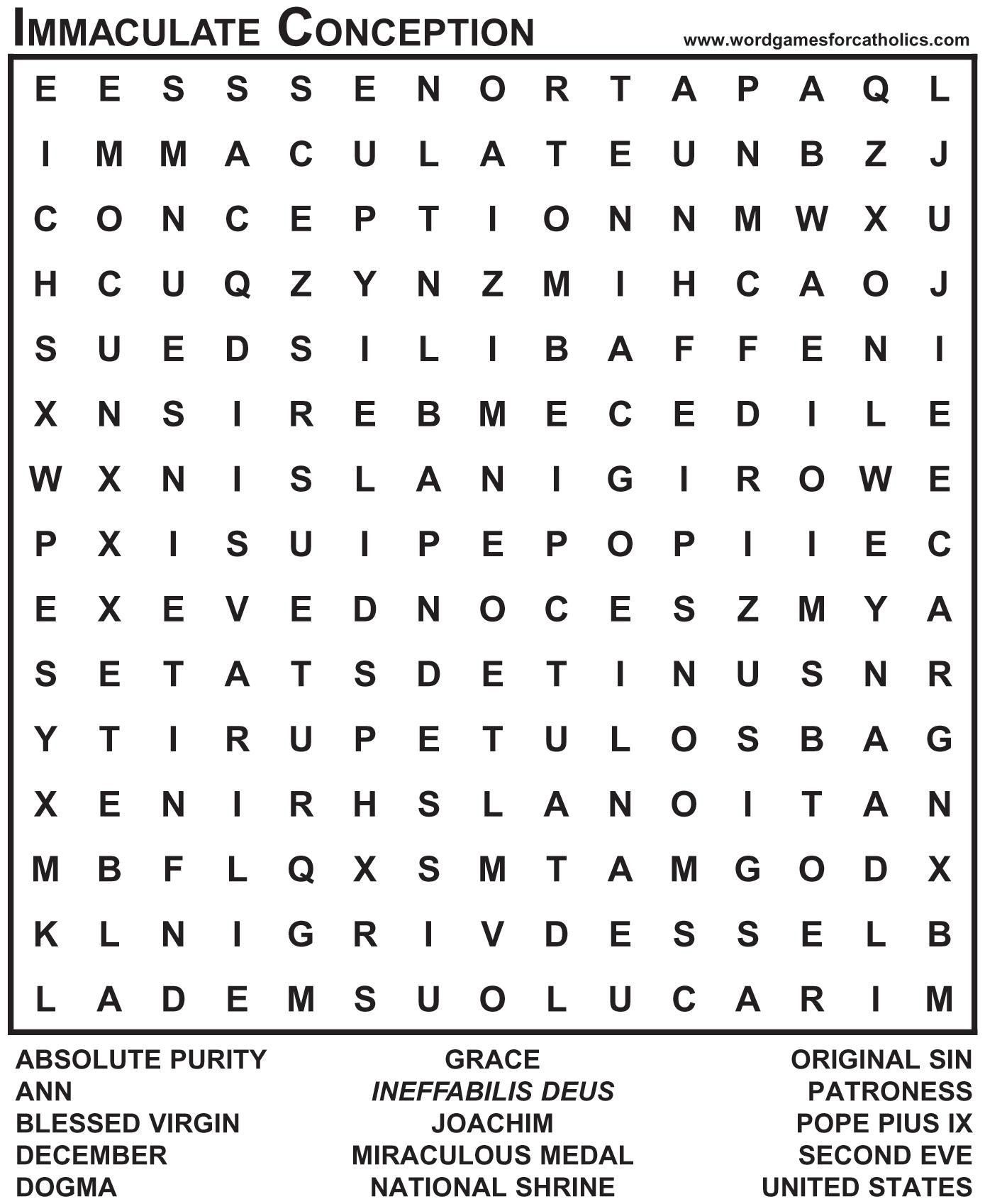
HOLIDAY ACCOMMODATION
ESPERANCE 3 bedroom house f/furnished Ph 09 9076 5083.
HOLIDAY RENTAL Scarborough. Self contained unit. Sleeps 6. Walk to beach. Ph 0402 673 409.
BOOK REPAIR SERVICE
New book binding, general book repairs, rebinding, new ribbons; old leather bindings restored. Tydewi Bindery 9377 0005.
WORK FROM HOME
P/T or F/T, 02 8230 0290 or visit www.dreamlife1.com.
BRENDON HANDYMAN SERVICES Home, building maintenance, repairs and renovations. NOR. Ph 0427 539 588.
BRICK RE-POINTING Ph Nigel 9242 2952.
PERROTT PAINTING Pty Ltd
For all your residential, commercial painting requirements. Ph Tom Perrott 9444 1200.
PICASSO PAINTING Top service. Ph 0419 915 836, fax 9345 0505.
WRR LAWN MOWING & WEED SPRAYING Garden clean ups and rubbish removal. Get rid of bindii, jojo and other unsightly weeds. Based in Tuart Hill. Enq 9443 9243 or 0402 326 637.
CATHOLICS CORNER Retailer of Catholic products specialising in gifts, cards and apparel for Baptism, Communion and Confirmation. Ph 9456 1777. Shop 12, 64-66 Bannister Rd, Canning Vale. Open Mon-Sat.
OTTIMO Convenient city location for books, CDs/DVDs, cards, candles, statues, Bibles, medals and much more. Shop 108, Trinity Arcade (Terrace level), 671 Hay St, Perth. Ph 9322 4520. Mon-Fri 9am-6pm.
RICH HARVEST YOUR CHRISTIAN SHOP Looking for Bibles, CDs, books, cards, gifts, statues, Baptism/Communion apparel, religious vestments, etc? Visit us at 39 Hulme Ct (off McCoy St), Myaree, Ph 9329 9889 (after 10.30am Mon to Sat). We are here to serve.
KINLAR VESTMENTS Quality hand-made and decorated vestments: Albs, Stoles, Chasubles, altar linen, banners etc. 12 Favenc Way, Padbury. By appointment only. Ph Vicki 9402 1318 or 0409 114 093.
ARE YOU BUYING OR SELLING real estate or a business?
Why not ask Excel Settlements for a quote for your settlement. We offer reasonable fees, excellent service and no hidden costs. Ring Excel on 9481 4499 for a quote. Check our website on www.excelsettlements.com.
ALL AREAS. Competitive Rates. Mike Murphy Ph 0416 226 434.
PEEK-A-BOO CORNER
Good quality & affordable branded kids’ clothing. For boys & girls 0 to 6 years. Don’t miss out 20% discount for first 20 customers. Errina: 0401 454 933. Email: peekaboo.corner@gmail.com or visit www.peekaboo-corner.blogspot.com.
ART FOR THE CATHEDRAL
www.margaretfane.com.au.
EMPLOYMENT
CARETAKERS WANTED For small property 110km north of Perth. A 2br ff cottage provided with gas + electricity included. Maintain existing fruit, veg, chooks for own use. Also ride-onmowing, watering etc. Ring 0419 949 185 or email jack.gardner@ jwga.com.au.
“The Woman Shall Conquer” by Don Sharkey. Photograph of Pope John Paul celebrating Mass in WA. Contact: email rodway@ iinet.net.au.
Have no fear. The classifieds are here
your hearts
2 Tim 1:6-8.13-14 Spirit of power
Lk 17:5-10 Increase our faith
4 M St Francis of Assisi (M)
Wh Gal 1:6-12 Paul astonished
Ps 110:1-2,7-10 Justice and truth
Lk 10:25-37 Who is my neighbour?
5 Tu Gal 1:13-24 Career reversal
Gr Ps 138:1-3.13-15 You know me, Lord
Lk 10:38-42 Lord, do you not care?
6 W St Bruno, priest (O)
Gr Gal 2:1-2.7-14 Paul opposes Peter
Ps 116 Praise, acclaim the Lord!
Lk 11:1-4 Teach us to pray
7 Th Our Lady of the Rosary (M)
Wh Gal 3:1 -5 The Spirit or the Law
Lk 1:69-75 A mighty saviour
Lk 11:5-13 Persistence enough
8 F Gal 3:7-14 Life through faith
Gr Ps 110:1-6 Compassion and love
Lk 11:15-26 A kingdom divided
9 S St Denis, Bishop, and companions, martyrs (O)
Gr St John Leonardi, priest (O)
Gal 3:22-29 Faith in Jesus Christ
Ps 104:2-7 Seek the Lord’s face
Lk 11:27-28 The word of God
Phone
William Wardell: Building with Conviction
By AG EvansNow Available ISBN 9781921421433 (paperback)
Paperback, 314 pages
Over 60 Black and White Photos
Paperback $39.95 + postage/handling
Hardback $49.95 + postage/handling
Born into lowly circumstances in London’s East End in 1823, WILLIAM WILKINSON WARDELL became one of Australia’s greatest architects whose crowning works are his two Cathedrals, St Mary’s in Sydney and St Patrick’s in Melbourne.
As well as being a leading exponent of Gothic Revival architecture of the 19th century, he served for a period as Chief Architect in the Victorian Public Works Department where he stamped his character and his high standards on many of Melbourne’s best-loved public buildings including his own design, Government House. Wardell was a contemporary and devoted admirer of Pugin.
Both were converts to the Catholic Faith and both shared a deep religious conviction in the superiority of Gothic architecture for Church building.
As a young architect, he enjoyed the friendship and intimacy of Charles Dickens and other prominent writers, artists, and actors, but he feared for his health in 1858 due to the wretched climatic conditions that claimed the lives of thousands of Londoners at that time.
To the sorrow of his friends, Wardell chose to sail with his family for Melbourne, lured by the climate and the urgent need for new churches for the burgeoning population. During his early years in Australia, Wardell suffered sectarian animosity and jealousy among members of his profession. Forced unfairly to leave Victoria in 1878, he was welcomed in Sydney where he was honoured and revered as a leader of his profession.
At his death aged 76, a newspaper stated: ‘He closed his life of noble labours, a life crowded with artistic triumphs in a manner in keeping with the modest gentleness of his whole career.’
In this first major biography of Wardell, Evans reveals for the first time his early life and influences at home in a workhouse, his apprenticeship at sea, and his work in England and Scotland where he was responsible for over twenty much admired churches, schools, and private houses.
His architectural legacy in Australia is rich and varied but it is for his two monumental Cathedrals that he is best remembered. He lavished much of his time, his love and his exacting standards on each of them simultaneously so that now they are emblematic of their cities and judged by architectural historians as among the finest examples of the Gothic style anywhere in the world.
The Conscious Stone: “This is a book which stirs the imagination and emotions. It repays more than one reading.”
ELIZABETH JOLLEY -Fanatic Heart: “Writing with real literary flair and lively authorial imagination, [Evans] has produced the best biography we are ever likely to have.’
- NEW ENGLAND QUARTERLY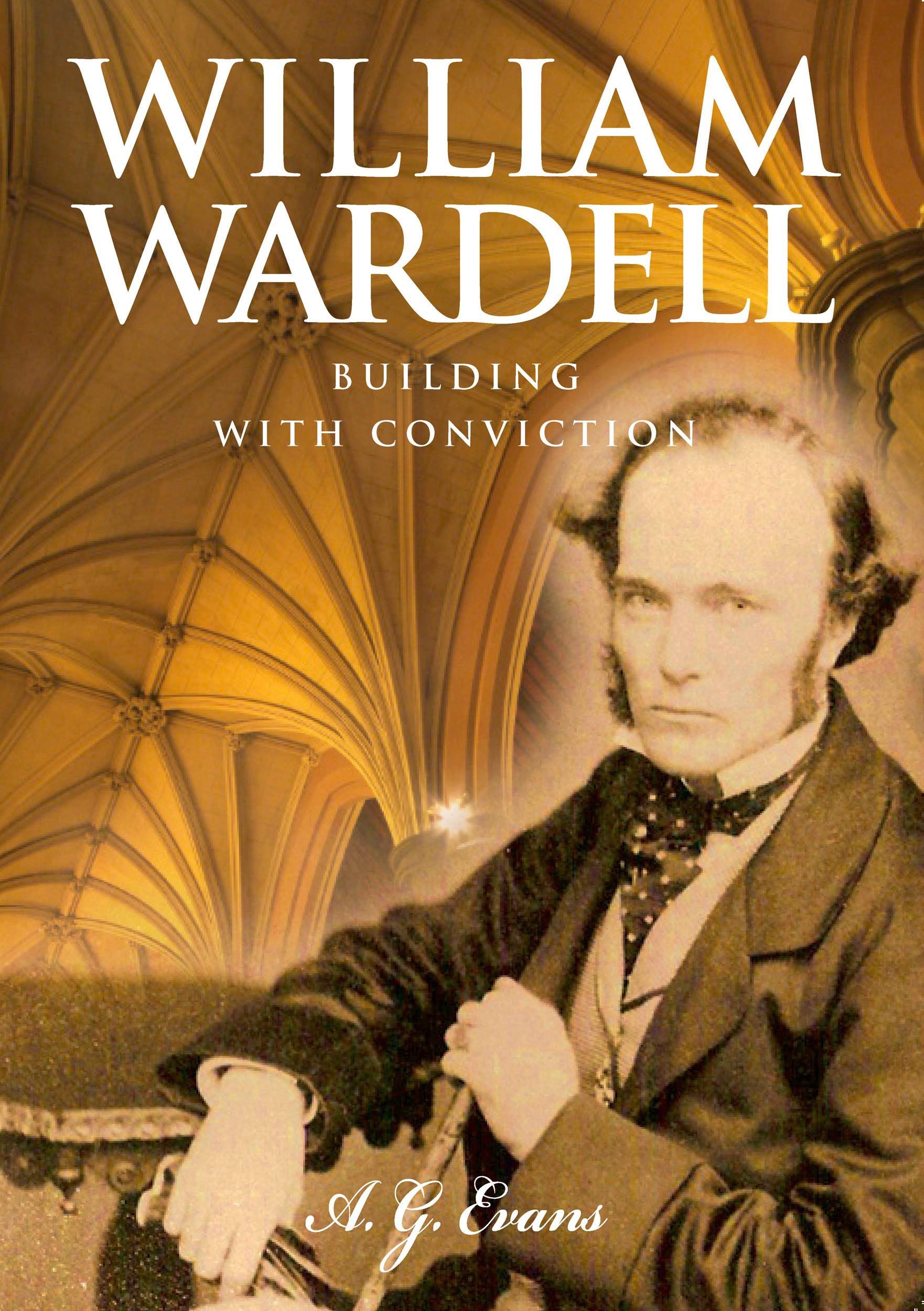
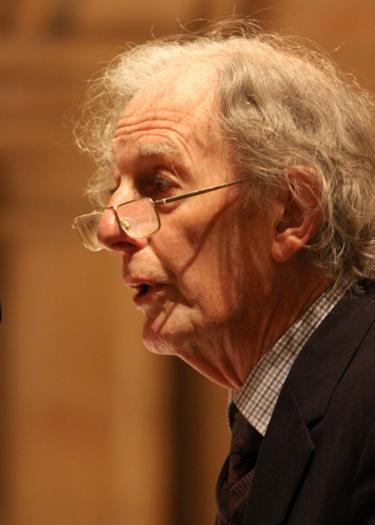
AG (Tony) EVANS was a producer with the ABC for many years, working as a presenter, reporter/writer and producer for television and radio. In 1989, he left the ABC to concentrate on freelance writing. His first published book, The Conscious Stone, a biography of the priestarchitect, John Cyril Hawes, won the Western Australian Premier’s Literary Award for non-fiction in 1985. Later books included Fanatic Heart, the biography of John Boyle O’Reilly, short-listed for the National Biography Prize; and CY O’Connor, His Life and Legacy, published in 2001. Evans lives in Western Australia.
